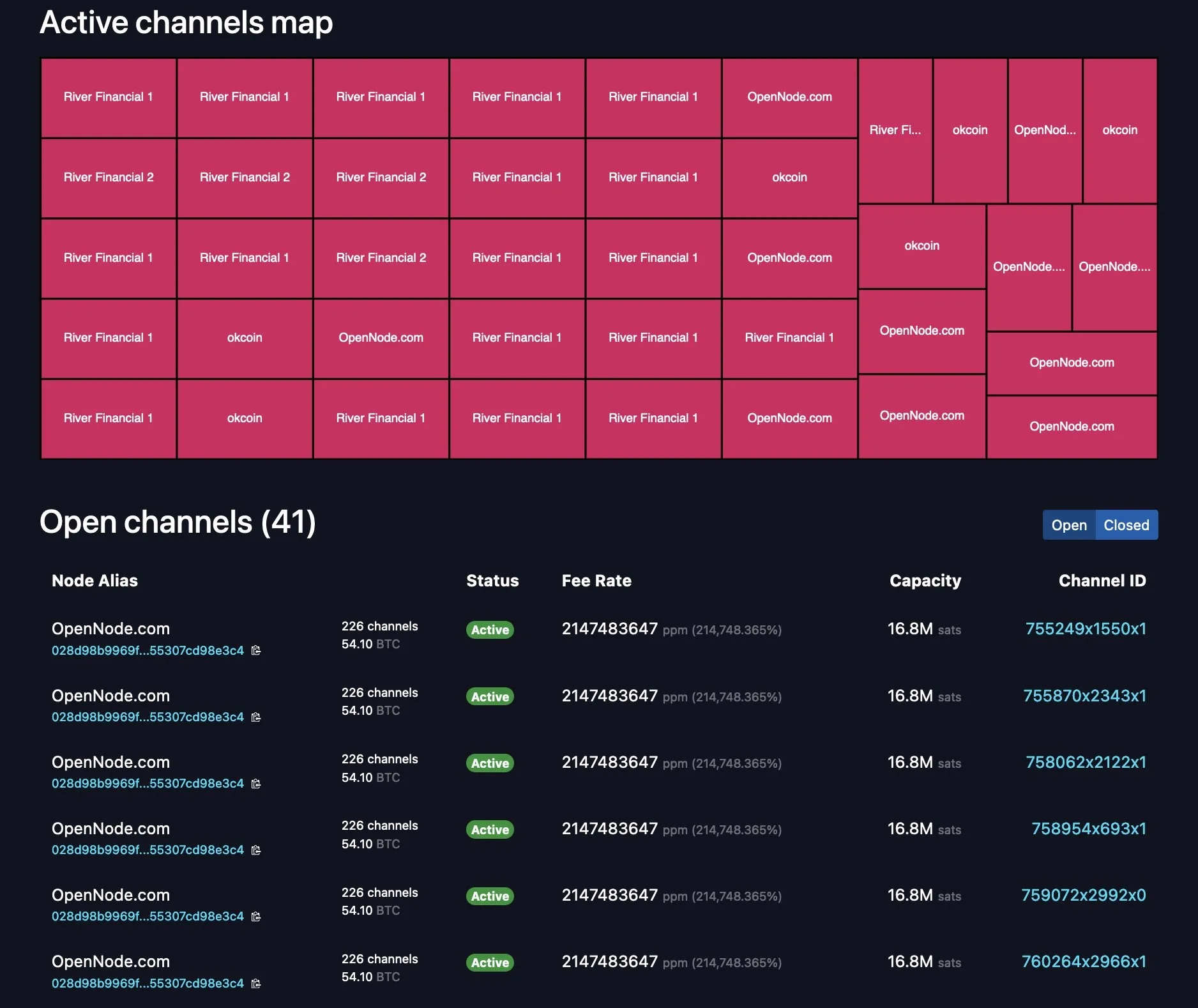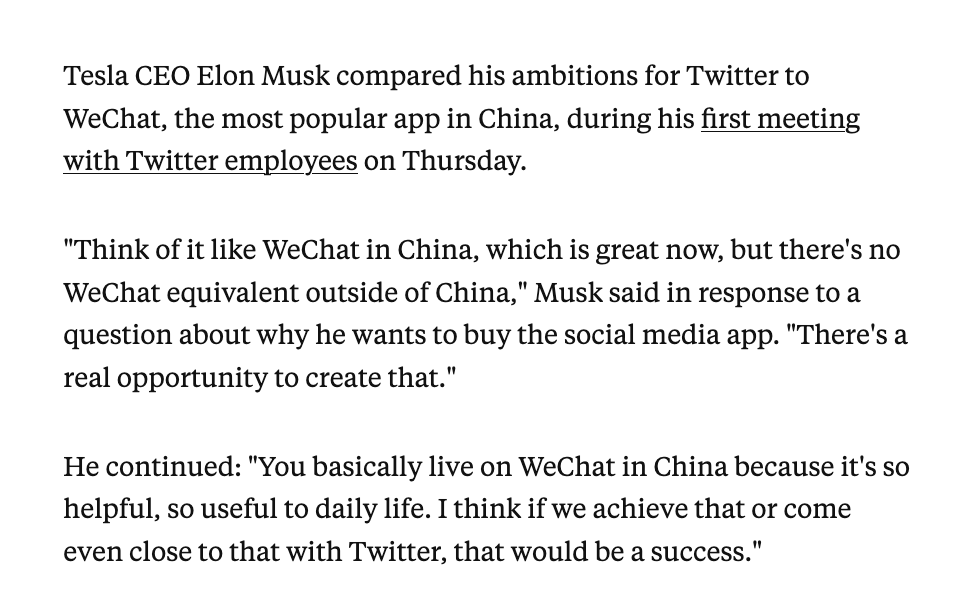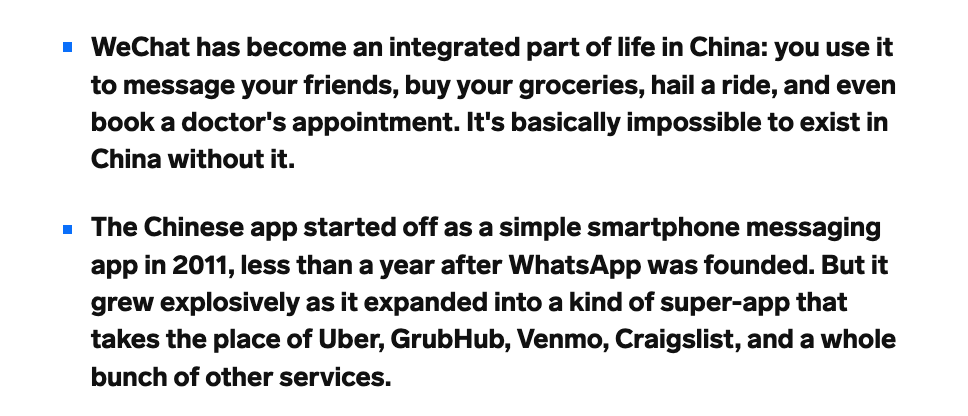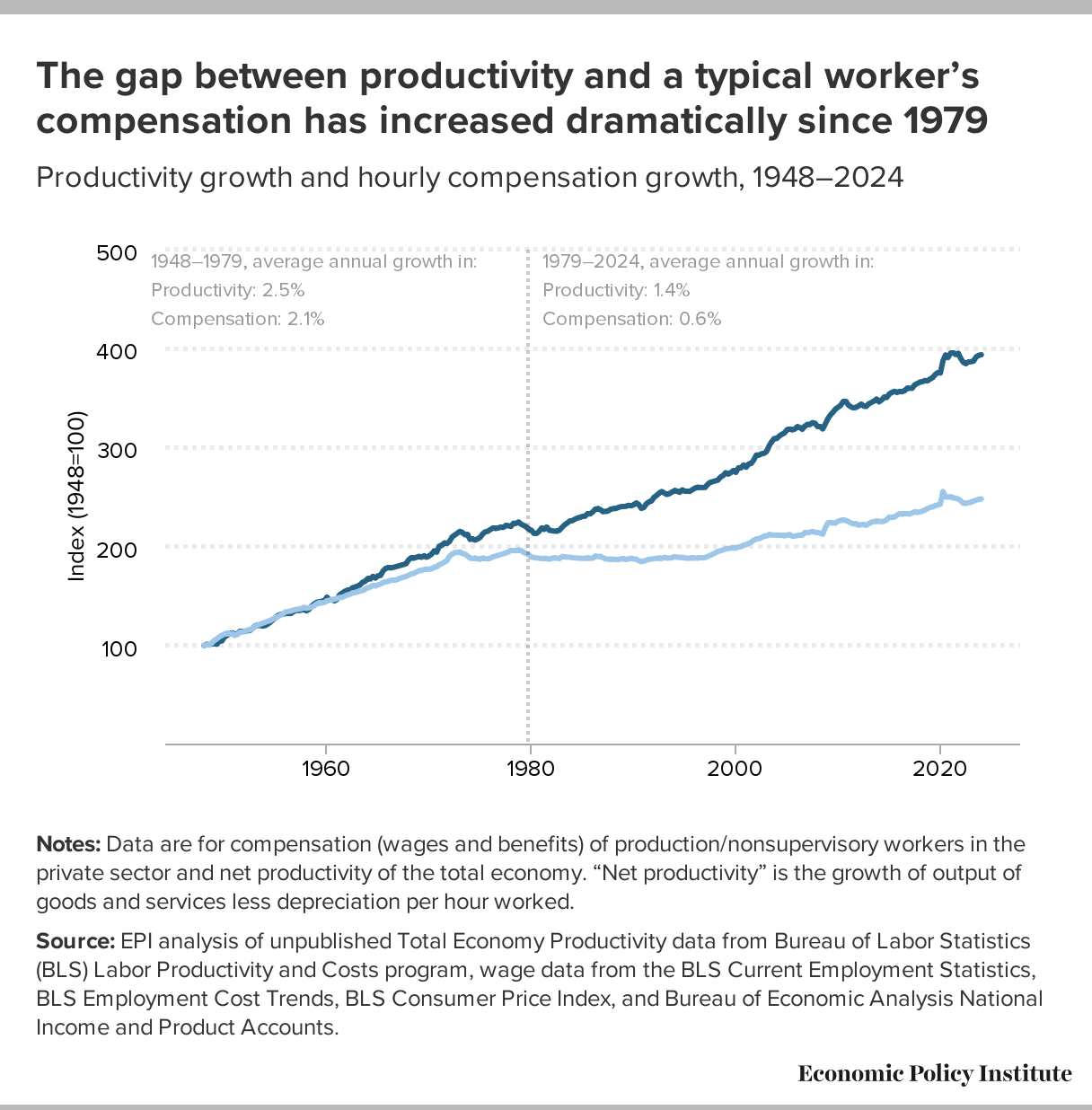-
 @ 9ca447d2:fbf5a36d
2025-05-22 14:01:52
@ 9ca447d2:fbf5a36d
2025-05-22 14:01:52Gen Z (those born between 1997 and 2012) are not rushing to stack sats, and Oliver Porter, Founder & CEO of Jippi, understands the challenge better than most. His strategy revolves around adapting Bitcoin education to fit seamlessly into the digital lives of young adults.
“We need to meet them where they are,” Oliver explains. “90% of Gen Z plays games. 70% expect to earn rewards.”
So, what will effectively introduce them to Bitcoin? In Oliver’s mind, the answer is simple: games that don’t feel preachy but still plant the orange pill.

Learn more at Jippi.app
That’s exactly what Jippi is. Based in Austin, Texas, the team has created a mobile augmented reality (AR) game that rewards players in bitcoin and sneakily teaches them why sound money matters.
“It’s Pokémon GO… but for sats,” Oliver puts it succinctly.

Jippi is like Pokemon Go, but for sats
Oliver’s Bitcoin journey, like many in the space, began long before he was ready. A former colleague had tried planting the seed years earlier, handing him a copy of The Bitcoin Standard. But the moment passed.
It wasn’t until the chaos of 2020 when lockdowns hit, printing presses roared, and civil liberties shrank that the message finally landed for him.
“The government got so good at doing reverse Robin Hood,” Oliver explains. “They steal from the working population and reward the rich.”
By 2020, though, the absurdity of the covid hysteria had caused his eyes to be opened and the orange light seemed the best path back to freedom.
He left the UK for Austin “one of the best places for Bitcoiners,” he says, and dove headfirst into the industry, working at Swan for a year before founding Jippi on PlebLab’s accelerator program.
Jippi’s flagship game lets players roam their cities hunting digital creatures, Bitcoin Beasts, tied to real-world locations. Catching them requires answering Bitcoin trivia, and the reward is sats.
No jargon. No hour-long lectures. Just gameplay with sound money principles woven right in.
The model is working. At a recent hackathon in Austin, Jippi beat out 14 other teams to win first place and $15,000 in prize money.

Oliver of Jippi won Top Builder Season 2 — PlebLab on X
“We’re backdooring Bitcoin education,” Oliver admits. “And while we’re at it, encouraging people to get outside and touch grass.”
Not everyone’s been thrilled. When Jippi team members visited one of the more liberal-leaning places in Texas, UT Austin, to test interest in Bitcoin, they found some seriously committed no-coiners on the campus.
“One young woman told me, ‘I would rather die than talk about Bitcoin,'” Oliver recalls, highlighting the cultural resistance that’s built up among younger demographics.
This resistance is backed by hard data. According to Oliver, some of the Bitcoin podcasters they met with in the space to do market research reported that less than 1% of their listeners are from Gen Z and that number is dropping.
“Unless we find a way to capture their interest in a meaningful way, there’s going to be a big problem around trying to sway Gen Z away from the siren call of s***coins and crypto casinos and towards Bitcoin,” Oliver warns.
Jippi’s next big move is Las Vegas, where they’ll launch the Beast Catch experience at the Venetian during a major Bitcoin event. To mark the occasion, they’re opening up six limited sponsorship spots for Bitcoin companies, each one tied to a custom in-game beast.

Jippi looks to launch a special event at Bitcoin 2025
“It’s real estate inside the game,” Oliver explains. “Brands become allies, not intrusions. You get a logo, company name, and call to action, so we can push people to your site or app.”
Bitcoin Well—an automatic self-custody Bitcoin platform—has claimed Beast #1. Only five exclusive spots remain for Bitcoin companies to “beastify their brand” through Jippi’s immersive AR game.
“I love the Jippi mission. I think gamified learning is how we will onboard the next generation and it’s exciting to see what the Jippi team is doing! I love working with bitcoiners towards our common mission – bullish!” said Adam O’Brien, Bitcoin Well CEO.
Jippi’s sponsorship model is simple: align incentives, respect users, and support builders. Instead of throwing ad money at tech giants, Bitcoin companies can connect with new users naturally while they’re having fun and earning sats in the process.
For Bitcoin companies looking to reach a younger demographic, this represents a unique opportunity to showcase their brand to up to 30,000 potential customers at the Vegas event.
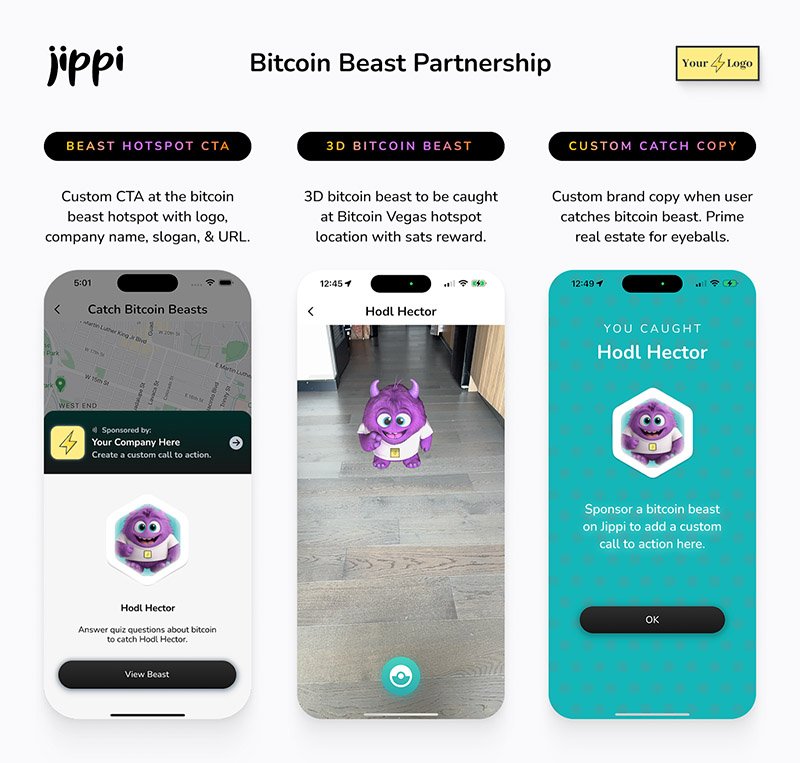
Jippi Bitcoin Beast partnership
While Jippi’s current focus is simple, get the game into more cities, Oliver sees a future where AR glasses and AI help personalize Bitcoin education even further.
“The magic is going to really happen when Apple releases the glasses form factor,” he says, describing how augmented reality could enhance real-world connections rather than isolate users.
In the longer term, Jippi aims to evolve from a free-to-play model toward a pay-to-play version with higher stakes. Users would form “tribes” with friends to compete for substantial bitcoin prizes, creating social connections along with financial education.
Unlike VC-backed startups, Jippi is raising funds pleb style via Timestamp, an open investment platform for Bitcoin companies.
“You don’t have to be an accredited investor,” Oliver explains. “You’re directly supporting the parallel Bitcoin economy by investing in Bitcoin companies for equity.”
Anyone can invest as little as $100. Perks include early access, exclusive game content, and even creating your own beast design with your name/pseudonym and unique game lore. Each investment comes with direct ownership of an early-stage Bitcoin company like Jippi.
For Oliver, this is more than just a business. It’s about future-proofing Bitcoin adoption and ensuring Satoshi’s vision lives on, especially as many people are lured by altcoins, NFTs, and social media dopamine.
“We’re on the right side of history,” he says firmly. “I want my grandkids to know that early on in the Bitcoin revolution, games like Jippi helped make it stick.”
In a world increasingly absorbed by screens and short attention spans, Jippi’s combination of outdoor play, sats rewards, and Bitcoin education might be exactly the bridge Gen Z needs.
Interested in sponsoring a Beast or investing in Jippi? Reach out to Jippi directly by heading to their partnerships page on their website or visit their Timestamp page to invest in Jippi today.
-
 @ 57d1a264:69f1fee1
2025-05-22 13:13:36
@ 57d1a264:69f1fee1
2025-05-22 13:13:36Graphics materials for Bitcoin Knots https://github.com/bitcoinknots branding. See below guide image for reference, a bit cleaner and scalable:
Font family "Aileron" is provided free for personal and commercial use, and can be found here: https://www.1001fonts.com/aileron-font.html
Source: https://github.com/Blissmode/bitcoinknots-gfx/tree/main
https://stacker.news/items/986624
-
 @ 57d1a264:69f1fee1
2025-05-22 12:36:20
@ 57d1a264:69f1fee1
2025-05-22 12:36:20Graphics materials for Bitcoin Knots https://github.com/bitcoinknots branding. See below guide image for reference, a bit cleaner and scalable:
Font family "Aileron" is provided free for personal and commercial use, and can be found here: https://www.1001fonts.com/aileron-font.html
Source: https://github.com/Blissmode/bitcoinknots-gfx/tree/main
https://stacker.news/items/986587
-
 @ 57d1a264:69f1fee1
2025-05-22 06:21:22
@ 57d1a264:69f1fee1
2025-05-22 06:21:22You’ve probably seen it before.
You open an agency’s website or a freelancer’s portfolio. At the very top of the homepage, it says:
We design for startups.
You wait 3 seconds. The last word fades out and a new one fades in:
We design for agencies.
Wait 3 more seconds:
We design for founders.
I call this design pattern The Wheel of Nothing: a rotating list of audience segments meant to impress through inclusion and draw attention through motion… for absolutely no reason.
Revered brand studio Pentagram recently launched a new website. To my surprise, the homepage features the Wheel of Nothing front and center, boldly claiming:
We design Everything for Everyone…before cycling through more specific combinations every few seconds.
Dan Mall, a husband, dad, teacher, creative director, designer, founder, and entrepreneur from Philly. I share as much as I can to create better opportunities for those who wouldn’t have them otherwise. Most recently, I ran design system consultancy SuperFriendly for over a decade.
Read more at Dans' website https://danmall.com/posts/the-wheel-of-nothing/
https://stacker.news/items/986392
-
 @ 21335073:a244b1ad
2025-05-21 16:58:36
@ 21335073:a244b1ad
2025-05-21 16:58:36The other day, I had the privilege of sitting down with one of my favorite living artists. Our conversation was so captivating that I felt compelled to share it. I’m leaving his name out for privacy.
Since our last meeting, I’d watched a documentary about his life, one he’d helped create. I told him how much I admired his openness in it. There’s something strange about knowing intimate details of someone’s life when they know so little about yours—it’s almost like I knew him too well for the kind of relationship we have.
He paused, then said quietly, with a shy grin, that watching the documentary made him realize how “odd and eccentric” he is. I laughed and told him he’s probably the sanest person I know. Because he’s lived fully, chasing love, passion, and purpose with hardly any regrets. He’s truly lived.
Today, I turn 44, and I’ll admit I’m a bit eccentric myself. I think I came into the world this way. I’ve made mistakes along the way, but I carry few regrets. Every misstep taught me something. And as I age, I’m not interested in blending in with the world—I’ll probably just lean further into my own brand of “weird.” I want to live life to the brim. The older I get, the more I see that the “normal” folks often seem less grounded than the eccentric artists who dare to live boldly. Life’s too short to just exist, actually live.
I’m not saying to be strange just for the sake of it. But I’ve seen what the crowd celebrates, and I’m not impressed. Forge your own path, even if it feels lonely or unpopular at times.
It’s easy to scroll through the news and feel discouraged. But actually, this is one of the most incredible times to be alive! I wake up every day grateful to be here, now. The future is bursting with possibility—I can feel it.
So, to my fellow weirdos on nostr: stay bold. Keep dreaming, keep pushing, no matter what’s trending. Stay wild enough to believe in a free internet for all. Freedom is radical—hold it tight. Live with the soul of an artist and the grit of a fighter. Thanks for inspiring me and so many others to keep hoping. Thank you all for making the last year of my life so special.
-
 @ 8aa70f44:3073d1a6
2025-05-21 13:07:14
@ 8aa70f44:3073d1a6
2025-05-21 13:07:14Earlier this year I launched the asknostr.site project which has been a great journey and learning experience. I had wanted to write down my goals and ideas with the project but didn't get to it yet. Primal launching the article editor was a trigger for me to go for it.
Ever since I joined Nostr i was looking for ways to apply my skillset solve a problem and help with adoption. Around Christmas I figured that a Quora/Stackoverflow alternative is something that needs to exist on Nostr.
Before I knew it I had a pretty decent prototype. And because the network already had so much awesome content, contributors and authors I was never discouraged by the challenge that kills so many good ideas -> "Where do I get the first users?".
Since the initial announcement I have received so much encouragement through zaps, likes, DM's, and maybe most of all seeing the increase in usage of the site and #asknostr content kept me going.
Current State
The current version of the site is stable and most bugs are hashed out. After logging in (remote signer, extension or nsec) you can engage with content through votes, comments and replies. Or simply ask a new question.
All content is stored in the site's own private relay and preprocessed/computed into a single data store (postgres) so the site is fast, accessible and crawl-able.
The site supports browsing hashtags, voting/commenting on answers, asking new questions and every contributor get their own profile (example). At the time of writing the site has 41k questions, almost 200k replies/comments and upwards of 5 million sats purely for #asknostr content.
What to expect/On my list
There are plenty of things and UI bugs that need love and between writing the draft of this post and hitting publish I shipped 3 minor bug fixes. Little by little, bit by bit...
In addition to all those small details here is an overview of the things on my own wish list:
-
Inline Zaps: Ability to zap from the asknostr.site interface. Click the zap button, specify or pick the number of sats zap away.
-
Contributor Rank: A leaderboard to add some gamification. More recognition to those nostriches that spend their time helping other people out
-
Search by Keyword: Search all content by keywords. Experiment with the index to show related questions or answers
-
Better User Profiles: Improve the user profile so it shows all the profile questions and answers. Quick buttons to follow or zap that person. Better insights in the topics (hashtags) the profile contributes to
-
Bookmarks: Ability to bookmark questions and answers. Increase bookmark weight as a signal to rank answers.
-
Smarter Scoring: Tune how answers are scored (winning answer formula). Perhaps give more weight to the question author or use WoT. Not sure yet.
All of this is happening at some point so follow me if you want to stay up to date.
Goals
To manage expectations and keep me focussed I write down the mid and long term goals of the project.
Long term
Call me cheesy but I believe that humanity will flourish through an open web and sound money. My own journey started from with bitcoin but if you asked me today if it's BTC or nostr that is going to have the most impact I wouldn't know what to answer. Chicken or egg?
The goal of the project is to offer an open platform that empowers individuals to ask questions, share expertise and access high-quality information across different topics. The project empowers anyone to monetize their experience creating a sustainable ecosystem that values and rewards knowledge sharing. This will ultimately democratize access to knowledge for all.
Mid term
The project can help a lot with onboarding new users onto the network. Once we start to rank on certain topics we can get a piece of the search traffic pie (StackOverflows 12 million, and Quora 150 million visitors per month) which is a great way to expose people to the power of the network.
First time visitors do not need to know about nostr or zaps to receive value. They can browse around, discover interesting content and perhaps even create a profile without even knowing they are on Nostr now.
Gradually those users will understand the value of the network through better rankings (zaps beats likes), a cross-client experience and a profile that can be used on any nostr site or app.
In order for the site to do that we need to make sure content is browsable by language, (sub)topics and and we double down on 'the human touch' with real contributors and not LLMs.
Short Term Goal
The first goal is to make the site really good and an important resource for existing Nostr users. Enable visitors to search and discover what they are interested in. Integrate within the existing nostr eco system with 'open in' functionality and quick links to interesting projects (followerpacks?)
One of things i want to get right is to improve user retention by making the whole Q\&A experience more sticky. I want to run some experiments (bots, award, summaries) to get more people to use asknostr.site more often and come back.
What about the name?
Finally the big question: What about the asknostr.site name? I don't like the name that much but it's what people know. I think there is a high chance that people will discover Nostr apps like Olas, Primal or Damus without needing to know what NOSTR is or means.
Therefore I think there is a good chance that the project won't be called asknostr.site forever. I guess it all depends on where we all take this.
Onwards!
-
-
 @ 57d1a264:69f1fee1
2025-05-21 05:47:41
@ 57d1a264:69f1fee1
2025-05-21 05:47:41As a product builder over too many years to mention, I’ve lost count of the number of times I’ve seen promising ideas go from zero to hero in a few weeks, only to fizzle out within months.
The problem with most finance apps, however, is that they often become a reflection of the internal politics of the business rather than an experience solely designed around the customer. This means that the focus is on delivering as many features and functionalities as possible to satisfy the needs and desires of competing internal departments, rather than providing a clear value proposition that is focused on what the people out there in the real world want. As a result, these products can very easily bloat to become a mixed bag of confusing, unrelated and ultimately unlovable customer experiences—a feature salad, you might say.
Financial products, which is the field I work in, are no exception. With people’s real hard-earned money on the line, user expectations running high, and a crowded market, it’s tempting to throw as many features at the wall as possible and hope something sticks. But this approach is a recipe for disaster.
Here’s why: https://alistapart.com/article/from-beta-to-bedrock-build-products-that-stick/
https://stacker.news/items/985285
-
 @ c9badfea:610f861a
2025-05-20 19:49:20
@ c9badfea:610f861a
2025-05-20 19:49:20- Install Sky Map (it's free and open source)
- Launch the app and tap Accept, then tap OK
- When asked to access the device's location, tap While Using The App
- Tap somewhere on the screen to activate the menu, then tap ⁝ and select Settings
- Disable Send Usage Statistics
- Return to the main screen and enjoy stargazing!
ℹ️ Use the 🔍 icon in the upper toolbar to search for a specific celestial body, or tap the 👁️ icon to activate night mode
-
 @ 2b468756:7930dd9c
2025-05-23 12:41:01
@ 2b468756:7930dd9c
2025-05-23 12:41:01Agorisme is libertarisme in de praktijk: op legale wijze maximale economische en persoonlijke vrijheid. Samen ontdekken en delen we wat er allemaal mogelijk is. We doen dit door: - organiseren jaarlijks agorismefestival - organiseren meerdere themadagen / excursies per jaar - bundelen praktische kennis op Agorisme Wiki - online uitwisselen via (thema)appgroepen
Op deze site worden activiteiten aangekondigd en kun je je opgeven.
Binnenkort: - cursussen metselen, stucen en vloeren - reis naar libertarisch dorp Walden Woods en Liberstad in Noorwegen - introductie Krav Maga zelfverdediging
We zijn gelieerd aan de libertarische partij.
Graag tot ziens!
-
 @ a296b972:e5a7a2e8
2025-05-23 12:40:41
@ a296b972:e5a7a2e8
2025-05-23 12:40:41Was Rudolf Steiner vor gut 110 Jahren an Informationen zusammengetragen und kommentiert hat, liest sich in großen Abschnitten so, als ob es in der heutigen Zeit geschrieben worden wäre. Man trifft auf eine ganze Reihe von „guten, alten Bekannten“, die auch heute noch maßgeblich an den Strippen ziehen. Deutlich wird, dass ein Krieg nicht aus heiterem Himmel ausbricht, sondern das im Vorfeld schon Kräfte wirken, die auf einen Krieg hinarbeiten. Wie jetzt wieder im Ukraine-Krieg wird diese Vorgeschichte gerne versucht unter den Teppich zu kehren und hochkompetente, sauber recherchierende, akribisch Quellen angebende Journalisten, wie z. B. Frau Gabriele Krone-Schmalz oder Herr Patrik Baab, der sich auf eigene Kosten einen Eindruck von vor Ort verschafft hat, werden versucht mundtot zu machen und mittlerweile gar nicht mehr zu Gesprächen im öffentlich-rechtlichen Rundfunk eingeladen, weil sie die fortlaufende Gehirnwäsche des Ministeriums für Wahrheit und Narrative mit ihren Aussagen gefährden. Andere kommen auf die Sanktionsliste.
Auch heute ist von den „Guten“ und den „Bösen“ die Rede, was darauf schließen lässt, dass man durchaus eingesteht, dass hier geistige Kräfte am Werk sind. Rudolf Steiner kommt auf diese immer wieder zu sprechen. Aus der von ihm gegebenen anthroposophischen Geisteswissenschaft heraus, beleuchtet er die Vorgänge innerhalb der gesamten Menschheitsentwicklung. Mancher stört sich hier an Begriffen, die man heute so nicht mehr verwenden würde. Dabei ist immer zu berücksichtigen, zu welcher Zeit die Vorträge gehalten wurden. Die Anthroposophie von Rudolf Steiner gilt heute bei vielen auch als „umstritten“, aber was ist das heute nicht? Fast könnte man es schon als Auszeichnung sehen, wenn etwas „umstritten“ ist, denn das ist mittlerweile ein Beweis dafür, dass es Ansichten, Meinungen und Einschätzungen gibt, die in einer gesunden Demokratie innerhalb einer Kontroverse zu einem Dialog und Austausch beitragen können, der jedoch leider derzeit weder gewünscht ist, noch gepflegt wird, was an der „Spaltung“ deutlich zu sehen ist. Und auch unter den Anthroposophen hat die „Spaltung“ Einzug gehalten.
Um das aktuelle, viele Bereiche umschließende, gigantische Lügenkonstrukt aufrecht zu erhalten, ist mittlerweile jedes Mittel recht, von der Deutungshoheit der Wahrheit durch systemkonforme Begutachter, bis hin zu infantil-kleingeistigen Kindergartenspielchen, um gegenläufige Meinungen oder Oppositionelle in ihrem Wirken zu behindern.
Der gesunde Hausverstand wird ausgetrocknet, und der Garten des Wahnsinns wird durch immer neue Ideen kranker Geister weiter gegossen, gehegt und gepflegt.
Die Zeitgeschichtlichen Betrachtungen von Rudolf Steiner bestehen aus 3 Bänden aus der GA (Gesamtausgabe):
GA 173 a – Wege zu einer objektiven Urteilsbildung
GA 173 b – Das Karma der Unwahrhaftigkeit
GA 173 c – Die Wirklichkeit okkulter Impulse
Sie bestehen aus niedergeschriebenen Vorträgen und einem sehr umfangreichen Anhang mit näheren Erläuterungen und einer Schilderung der Entstehung dieser drei Bände.
Es bedarf einiger Eingewöhnung in die zur damaligen Zeit verwendete Sprache Rudolf Steiners, der ein Meister im Bilden von Schachtelsätzen war. Der Inhalt jedoch, und auf den kommt es ja an, berührt immer wieder den in allen Menschen vorhandenen Wahrheitssinn.
Hier nur eine kleine Kostprobe, die vielleicht das Interesse wecken kann, sich mit diesem derzeit besonders aktuellen Werk näher zu beschäftigen.
GA 173a, 6. Vortrag, Seite 205 und Seite 206, Dornach, 17. Dezember 1916:
„Viel intimer, viel verborgener liegen die Dinge bei der englischen Politik, die ja ganz beeinflußt ist von dem, was in solcher Weise hinter ihr steckt. Da handelt es sich darum, daß man die Wege findet, um die entsprechenden Menschen an die richtigen Plätze zu befördern. Okkultistische Menschen, im Hintergrunde stehend, sind oftmals – na, verzeihen Sie – Einser, bloße Einser, und bedeuten für sich nichts Besonderes; sie brauchen noch etwas anderes – sie brauchen Nullen. Nullen sind ja nicht Einser, aber (fügt man eine Null zu einer Eins), dann wird gleich eine Zehn daraus. Und wenn man noch mehr Nullen hinzufügt – jede Null ist nur eine Null, aber wenn die Eins irgendwo steckt, dann ist gar mancherlei da, zum Beispiel die Tausend, und wenn man die Eins zudeckt, dann sind (scheinbar) nur die Nullen da; die Nullen brauchen aber nur in der entsprechenden Weise mit den Einsern kombiniert zu sein, und sie brauchen nicht einmal viel zu wissen von der Art, wie sie mit den Einsern kombiniert sind.“
Schildert diese 108 Jahre alte Beschreibung nicht genau das, was sich heute vor unseren Augen abspielt?
Dieser Artikel wurde mit dem Pareto-Client geschrieben
* *
(Bild von pixabay)
-
 @ 0e9491aa:ef2adadf
2025-05-23 12:01:20
@ 0e9491aa:ef2adadf
2025-05-23 12:01:20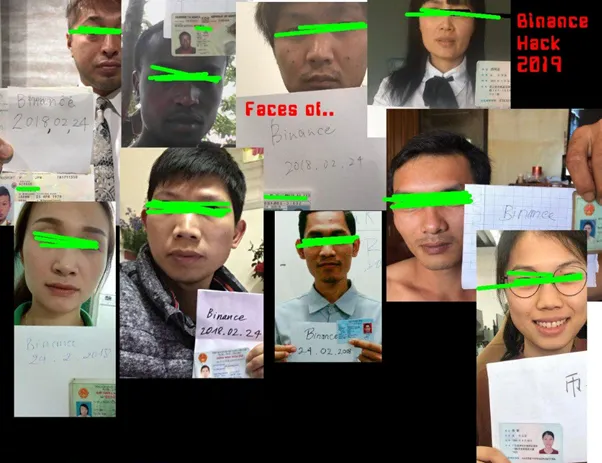
What is KYC/AML?
- The acronym stands for Know Your Customer / Anti Money Laundering.
- In practice it stands for the surveillance measures companies are often compelled to take against their customers by financial regulators.
- Methods differ but often include: Passport Scans, Driver License Uploads, Social Security Numbers, Home Address, Phone Number, Face Scans.
- Bitcoin companies will also store all withdrawal and deposit addresses which can then be used to track bitcoin transactions on the bitcoin block chain.
- This data is then stored and shared. Regulations often require companies to hold this information for a set number of years but in practice users should assume this data will be held indefinitely. Data is often stored insecurely, which results in frequent hacks and leaks.
- KYC/AML data collection puts all honest users at risk of theft, extortion, and persecution while being ineffective at stopping crime. Criminals often use counterfeit, bought, or stolen credentials to get around the requirements. Criminals can buy "verified" accounts for as little as $200. Furthermore, billions of people are excluded from financial services as a result of KYC/AML requirements.
During the early days of bitcoin most services did not require this sensitive user data, but as adoption increased so did the surveillance measures. At this point, most large bitcoin companies are collecting and storing massive lists of bitcoiners, our sensitive personal information, and our transaction history.
Lists of Bitcoiners
KYC/AML policies are a direct attack on bitcoiners. Lists of bitcoiners and our transaction history will inevitably be used against us.
Once you are on a list with your bitcoin transaction history that record will always exist. Generally speaking, tracking bitcoin is based on probability analysis of ownership change. Surveillance firms use various heuristics to determine if you are sending bitcoin to yourself or if ownership is actually changing hands. You can obtain better privacy going forward by using collaborative transactions such as coinjoin to break this probability analysis.
Fortunately, you can buy bitcoin without providing intimate personal information. Tools such as peach, hodlhodl, robosats, azteco and bisq help; mining is also a solid option: anyone can plug a miner into power and internet and earn bitcoin by mining privately.
You can also earn bitcoin by providing goods and/or services that can be purchased with bitcoin. Long term, circular economies will mitigate this threat: most people will not buy bitcoin - they will earn bitcoin - most people will not sell bitcoin - they will spend bitcoin.
There is no such thing as KYC or No KYC bitcoin, there are bitcoiners on lists and those that are not on lists.
If you found this post helpful support my work with bitcoin.

-
 @ 0e9491aa:ef2adadf
2025-05-23 12:01:19
@ 0e9491aa:ef2adadf
2025-05-23 12:01:19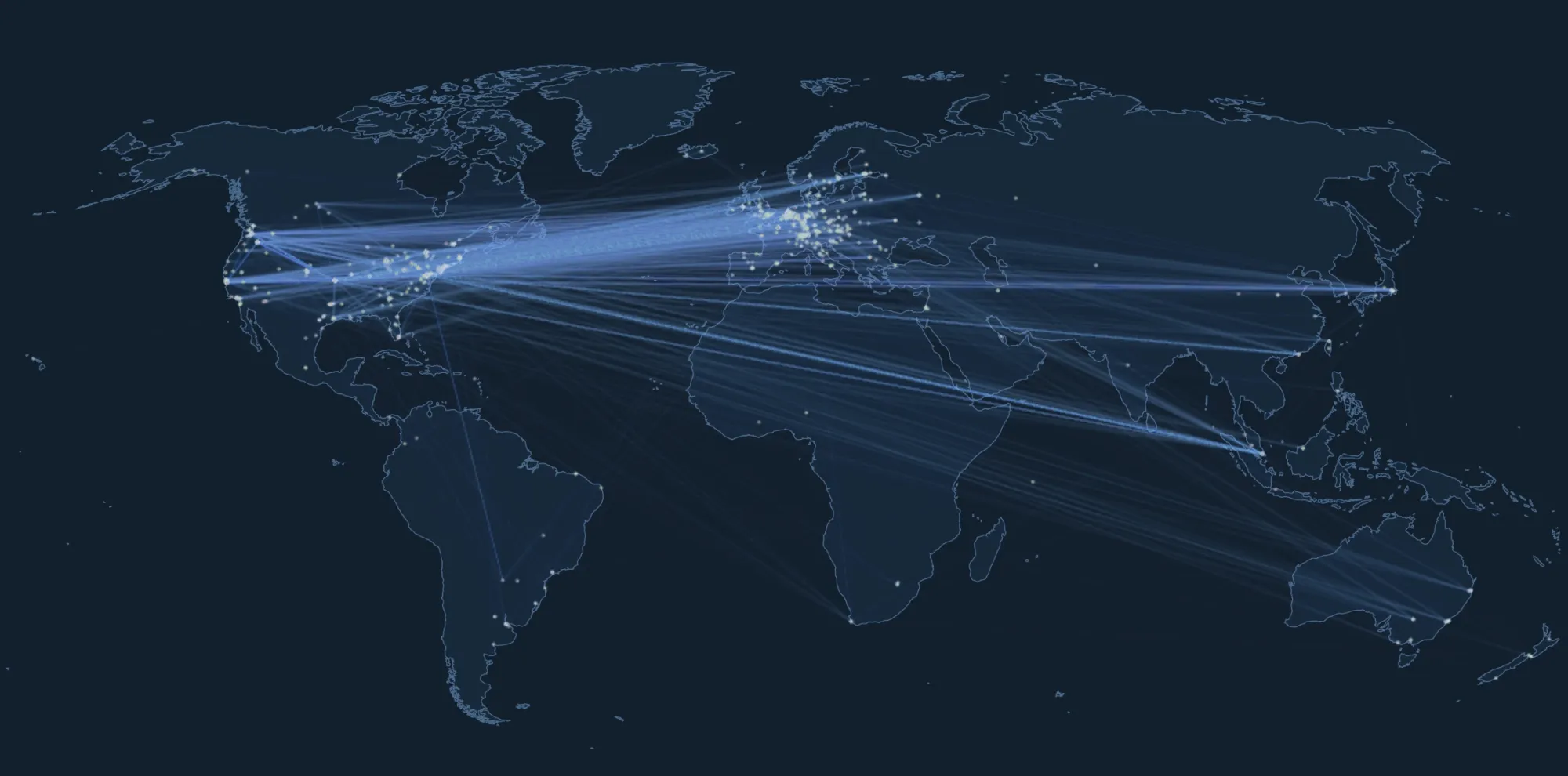
The former seems to have found solid product market fit. Expect significant volume, adoption, and usage going forward.
The latter's future remains to be seen. Dependence on Tor, which has had massive reliability issues, and lack of strong privacy guarantees put it at risk.
— ODELL (@ODELL) October 27, 2022
The Basics
- Lightning is a protocol that enables cheap and fast native bitcoin transactions.
- At the core of the protocol is the ability for bitcoin users to create a payment channel with another user.
- These payment channels enable users to make many bitcoin transactions between each other with only two on-chain bitcoin transactions: the channel open transaction and the channel close transaction.
- Essentially lightning is a protocol for interoperable batched bitcoin transactions.
- It is expected that on chain bitcoin transaction fees will increase with adoption and the ability to easily batch transactions will save users significant money.
- As these lightning transactions are processed, liquidity flows from one side of a channel to the other side, on chain transactions are signed by both parties but not broadcasted to update this balance.
- Lightning is designed to be trust minimized, either party in a payment channel can close the channel at any time and their bitcoin will be settled on chain without trusting the other party.
There is no 'Lightning Network'
- Many people refer to the aggregate of all lightning channels as 'The Lightning Network' but this is a false premise.
- There are many lightning channels between many different users and funds can flow across interconnected channels as long as there is a route through peers.
- If a lightning transaction requires multiple hops it will flow through multiple interconnected channels, adjusting the balance of all channels along the route, and paying lightning transaction fees that are set by each node on the route.
Example: You have a channel with Bob. Bob has a channel with Charlie. You can pay Charlie through your channel with Bob and Bob's channel with User C.
- As a result, it is not guaranteed that every lightning user can pay every other lightning user, they must have a route of interconnected channels between sender and receiver.
Lightning in Practice
- Lightning has already found product market fit and usage as an interconnected payment protocol between large professional custodians.
- They are able to easily manage channels and liquidity between each other without trust using this interoperable protocol.
- Lightning payments between large custodians are fast and easy. End users do not have to run their own node or manage their channels and liquidity. These payments rarely fail due to professional management of custodial nodes.
- The tradeoff is one inherent to custodians and other trusted third parties. Custodial wallets can steal funds and compromise user privacy.
Sovereign Lightning
- Trusted third parties are security holes.
- Users must run their own node and manage their own channels in order to use lightning without trusting a third party. This remains the single largest friction point for sovereign lightning usage: the mental burden of actively running a lightning node and associated liquidity management.
- Bitcoin development prioritizes node accessibility so cost to self host your own node is low but if a node is run at home or office, Tor or a VPN is recommended to mask your IP address: otherwise it is visible to the entire network and represents a privacy risk.
- This privacy risk is heightened due to the potential for certain governments to go after sovereign lightning users and compel them to shutdown their nodes. If their IP Address is exposed they are easier to target.
- Fortunately the tools to run and manage nodes continue to get easier but it is important to understand that this will always be a friction point when compared to custodial services.
The Potential Fracture of Lightning
- Any lightning user can choose which users are allowed to open channels with them.
- One potential is that professional custodians only peer with other professional custodians.
- We already see nodes like those run by CashApp only have channels open with other regulated counterparties. This could be due to performance goals, liability reduction, or regulatory pressure.
- Fortunately some of their peers are connected to non-regulated parties so payments to and from sovereign lightning users are still successfully processed by CashApp but this may not always be the case going forward.
Summary
- Many people refer to the aggregate of all lightning channels as 'The Lightning Network' but this is a false premise. There is no singular 'Lightning Network' but rather many payment channels between distinct peers, some connected with each other and some not.
- Lightning as an interoperable payment protocol between professional custodians seems to have found solid product market fit. Expect significant volume, adoption, and usage going forward.
- Lightning as a robust sovereign payment protocol has yet to be battle tested. Heavy reliance on Tor, which has had massive reliability issues, the friction of active liquidity management, significant on chain fee burden for small amounts, interactivity constraints on mobile, and lack of strong privacy guarantees put it at risk.
If you have never used lightning before, use this guide to get started on your phone.
If you found this post helpful support my work with bitcoin.

-
 @ 0e9491aa:ef2adadf
2025-05-23 12:01:19
@ 0e9491aa:ef2adadf
2025-05-23 12:01:19
Bank run on every crypto bank then bank run on every "real" bank.
— ODELL (@ODELL) December 14, 2022
The four main banks of bitcoin and “crypto” are Signature, Prime Trust, Silvergate, and Silicon Valley Bank. Prime Trust does not custody funds themselves but rather maintains deposit accounts at BMO Harris Bank, Cross River, Lexicon Bank, MVB Bank, and Signature Bank. Silvergate and Silicon Valley Bank have already stopped withdrawals. More banks will go down before the chaos stops. None of them have sufficient reserves to meet withdrawals.
Bitcoin gives us all the ability to opt out of a system that has massive layers of counterparty risk built in, years of cheap money and broken incentives have layered risk on top of risk throughout the entire global economy. If you thought the FTX bank run was painful to watch, I have bad news for you: every major bank in the world is fractional reserve. Bitcoin held in self custody is unique in its lack of counterparty risk, as global market chaos unwinds this will become much more obvious.
The rules of bitcoin are extremely hard to change by design. Anyone can access the network directly without a trusted third party by using their own node. Owning more bitcoin does not give you more control over the network with all participants on equal footing.
Bitcoin is:
- money that is not controlled by a company or government
- money that can be spent or saved without permission
- money that is provably scarce and should increase in purchasing power with adoptionBitcoin is money without trust. Whether you are a nation state, corporation, or an individual, you can use bitcoin to spend or save without permission. Social media will accelerate the already deteriorating trust in our institutions and as this trust continues to crumble the value of trust minimized money will become obvious. As adoption increases so should the purchasing power of bitcoin.
A quick note on "stablecoins," such as USDC - it is important to remember that they rely on trusted custodians. They have the same risk as funds held directly in bank accounts with additional counterparty risk on top. The trusted custodians can be pressured by gov, exit scam, or caught up in fraud. Funds can and will be frozen at will. This is a distinctly different trust model than bitcoin, which is a native bearer token that does not rely on any centralized entity or custodian.
Most bitcoin exchanges have exposure to these failing banks. Expect more chaos and confusion as this all unwinds. Withdraw any bitcoin to your own wallet ASAP.
Simple Self Custody Guide: https://werunbtc.com/muun
More Secure Cold Storage Guide: https://werunbtc.com/coldcard
If you found this post helpful support my work with bitcoin.

-
 @ 0e9491aa:ef2adadf
2025-05-23 12:01:19
@ 0e9491aa:ef2adadf
2025-05-23 12:01:19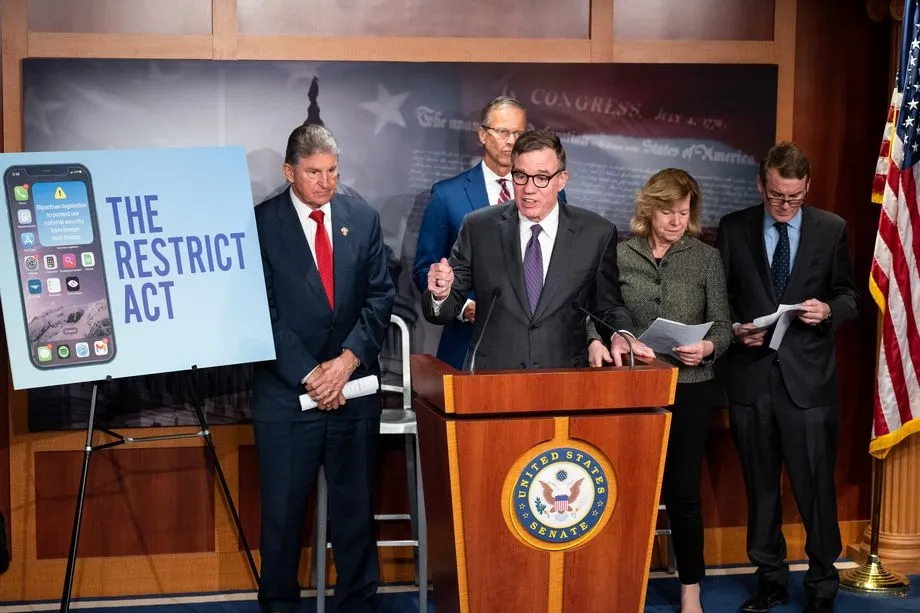
The newly proposed RESTRICT ACT - is being advertised as a TikTok Ban, but is much broader than that, carries a $1M Fine and up to 20 years in prison️! It is unconstitutional and would create massive legal restrictions on the open source movement and free speech throughout the internet.
The Bill was proposed by: Senator Warner, Senator Thune, Senator Baldwin, Senator Fischer, Senator Manchin, Senator Moran, Senator Bennet, Senator Sullivan, Senator Gillibrand, Senator Collins, Senator Heinrich, and Senator Romney. It has broad support across Senators of both parties.
Corrupt politicians will not protect us. They are part of the problem. We must build, support, and learn how to use censorship resistant tools in order to defend our natural rights.
The RESTRICT Act, introduced by Senators Warner and Thune, aims to block or disrupt transactions and financial holdings involving foreign adversaries that pose risks to national security. Although the primary targets of this legislation are companies like Tik-Tok, the language of the bill could potentially be used to block or disrupt cryptocurrency transactions and, in extreme cases, block Americans’ access to open source tools or protocols like Bitcoin.
The Act creates a redundant regime paralleling OFAC without clear justification, it significantly limits the ability for injured parties to challenge actions raising due process concerns, and unlike OFAC it lacks any carve-out for protected speech. COINCENTER ON THE RESTRICT ACT
If you found this post helpful support my work with bitcoin.

-
 @ 0e9491aa:ef2adadf
2025-05-23 12:01:19
@ 0e9491aa:ef2adadf
2025-05-23 12:01:19
@matt_odell don't you even dare not ask about nostr!
— Kukks (Andrew Camilleri) (@MrKukks) May 18, 2021
Nostr first hit my radar spring 2021: created by fellow bitcoiner and friend, fiatjaf, and released to the world as free open source software. I was fortunate to be able to host a conversation with him on Citadel Dispatch in those early days, capturing that moment in history forever. Since then, the protocol has seen explosive viral organic growth as individuals around the world have contributed their time and energy to build out the protocol and the surrounding ecosystem due to the clear need for better communication tools.
nostr is to twitter as bitcoin is to paypal
As an intro to nostr, let us start with a metaphor:
twitter is paypal - a centralized platform plagued by censorship but has the benefit of established network effects
nostr is bitcoin - an open protocol that is censorship resistant and robust but requires an organic adoption phase
Nostr is an open communication protocol that can be used to send messages across a distributed set of relays in a censorship resistant and robust way.
- Anyone can run a relay.
- Anyone can interact with the protocol.
- Relays can choose which messages they want to relay.
- Users are identified by a simple public private key pair that they can generate themselves.Nostr is often compared to twitter since there are nostr clients that emulate twitter functionality and user interface but that is merely one application of the protocol. Nostr is so much more than a mere twitter competitor. Nostr clients and relays can transmit a wide variety of data and clients can choose how to display that information to users. The result is a revolution in communication with implications that are difficult for any of us to truly comprehend.
Similar to bitcoin, nostr is an open and permissionless protocol. No person, company, or government controls it. Anyone can iterate and build on top of nostr without permission. Together, bitcoin and nostr are incredibly complementary freedom tech tools: censorship resistant, permissionless, robust, and interoperable - money and speech protected by code and incentives, not laws.
As censorship throughout the world continues to escalate, freedom tech provides hope for individuals around the world who refuse to accept the status quo. This movement will succeed on the shoulders of those who choose to stand up and contribute. We will build our own path. A brighter path.
My Nostr Public Key: npub1qny3tkh0acurzla8x3zy4nhrjz5zd8l9sy9jys09umwng00manysew95gx
If you found this post helpful support my work with bitcoin.

-
 @ 0e9491aa:ef2adadf
2025-05-23 12:01:18
@ 0e9491aa:ef2adadf
2025-05-23 12:01:18

"Privacy is necessary for an open society in the electronic age. Privacy is not secrecy. A private matter is something one doesn't want the whole world to know, but a secret matter is something one doesn't want anybody to know. Privacy is the power to selectively reveal oneself to the world." - Eric Hughes, A Cypherpunk's Manifesto, 1993
Privacy is essential to freedom. Without privacy, individuals are unable to make choices free from surveillance and control. Lack of privacy leads to loss of autonomy. When individuals are constantly monitored it limits our ability to express ourselves and take risks. Any decisions we make can result in negative repercussions from those who surveil us. Without the freedom to make choices, individuals cannot truly be free.
Freedom is essential to acquiring and preserving wealth. When individuals are not free to make choices, restrictions and limitations prevent us from economic opportunities. If we are somehow able to acquire wealth in such an environment, lack of freedom can result in direct asset seizure by governments or other malicious entities. At scale, when freedom is compromised, it leads to widespread economic stagnation and poverty. Protecting freedom is essential to economic prosperity.
The connection between privacy, freedom, and wealth is critical. Without privacy, individuals lose the freedom to make choices free from surveillance and control. While lack of freedom prevents individuals from pursuing economic opportunities and makes wealth preservation nearly impossible. No Privacy? No Freedom. No Freedom? No Wealth.
Rights are not granted. They are taken and defended. Rights are often misunderstood as permission to do something by those holding power. However, if someone can give you something, they can inherently take it from you at will. People throughout history have necessarily fought for basic rights, including privacy and freedom. These rights were not given by those in power, but rather demanded and won through struggle. Even after these rights are won, they must be continually defended to ensure that they are not taken away. Rights are not granted - they are earned through struggle and defended through sacrifice.
If you found this post helpful support my work with bitcoin.

-
 @ 0e9491aa:ef2adadf
2025-05-23 12:01:18
@ 0e9491aa:ef2adadf
2025-05-23 12:01:18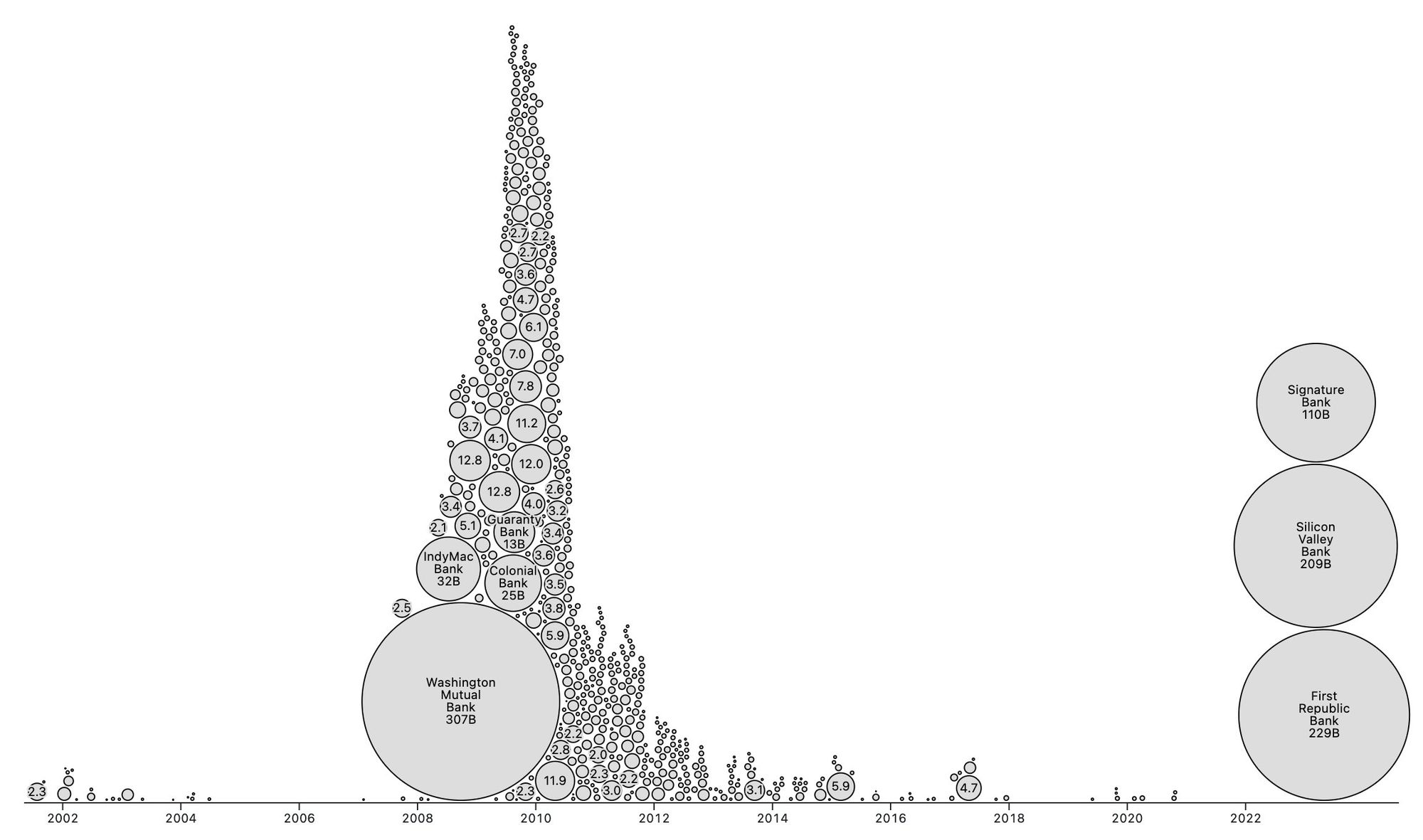
People forget Bear Stearns failed March 2008 - months of denial followed before the public realized how bad the situation was under the surface.
Similar happening now but much larger scale. They did not fix fundamental issues after 2008 - everything is more fragile.
The Fed preemptively bailed out every bank with their BTFP program and First Republic Bank still failed. The second largest bank failure in history.
There will be more failures. There will be more bailouts. Depositors will be "protected" by socializing losses across everyone.
Our President and mainstream financial pundits are currently pretending the banking crisis is over while most banks remain insolvent. There are going to be many more bank failures as this ponzi system unravels.
Unlike 2008, we have the ability to opt out of these broken and corrupt institutions by using bitcoin. Bitcoin held in self custody is unique in its lack of counterparty risk - you do not have to trust a bank or other centralized entity to hold it for you. Bitcoin is also incredibly difficult to change by design since it is not controlled by an individual, company, or government - the supply of dollars will inevitably be inflated to bailout these failing banks but bitcoin supply will remain unchanged. I do not need to convince you that bitcoin provides value - these next few years will convince millions.
If you found this post helpful support my work with bitcoin.

-
 @ 0e9491aa:ef2adadf
2025-05-23 12:01:18
@ 0e9491aa:ef2adadf
2025-05-23 12:01:18
Bank run on every crypto bank then bank run on every "real" bank.
— ODELL (@ODELL) December 14, 2022
Good morning.
It looks like PacWest will fail today. It will be both the fifth largest bank failure in US history and the sixth major bank to fail this year. It will likely get purchased by one of the big four banks in a government orchestrated sale.
March 8th - Silvergate Bank
March 10th - Silicon Valley Bank
March 12th - Signature Bank
March 19th - Credit Suisse
May 1st - First Republic Bank
May 4th - PacWest Bank?PacWest is the first of many small regional banks that will go under this year. Most will get bought by the big four in gov orchestrated sales. This has been the playbook since 2008. Follow the incentives. Massive consolidation across the banking industry. PacWest gonna be a drop in the bucket compared to what comes next.
First, a hastened government led bank consolidation, then a public/private partnership with the remaining large banks to launch a surveilled and controlled digital currency network. We will be told it is more convenient. We will be told it is safer. We will be told it will prevent future bank runs. All of that is marketing bullshit. The goal is greater control of money. The ability to choose how we spend it and how we save it. If you control the money - you control the people that use it.
If you found this post helpful support my work with bitcoin.

-
 @ 0e9491aa:ef2adadf
2025-05-23 12:01:18
@ 0e9491aa:ef2adadf
2025-05-23 12:01:18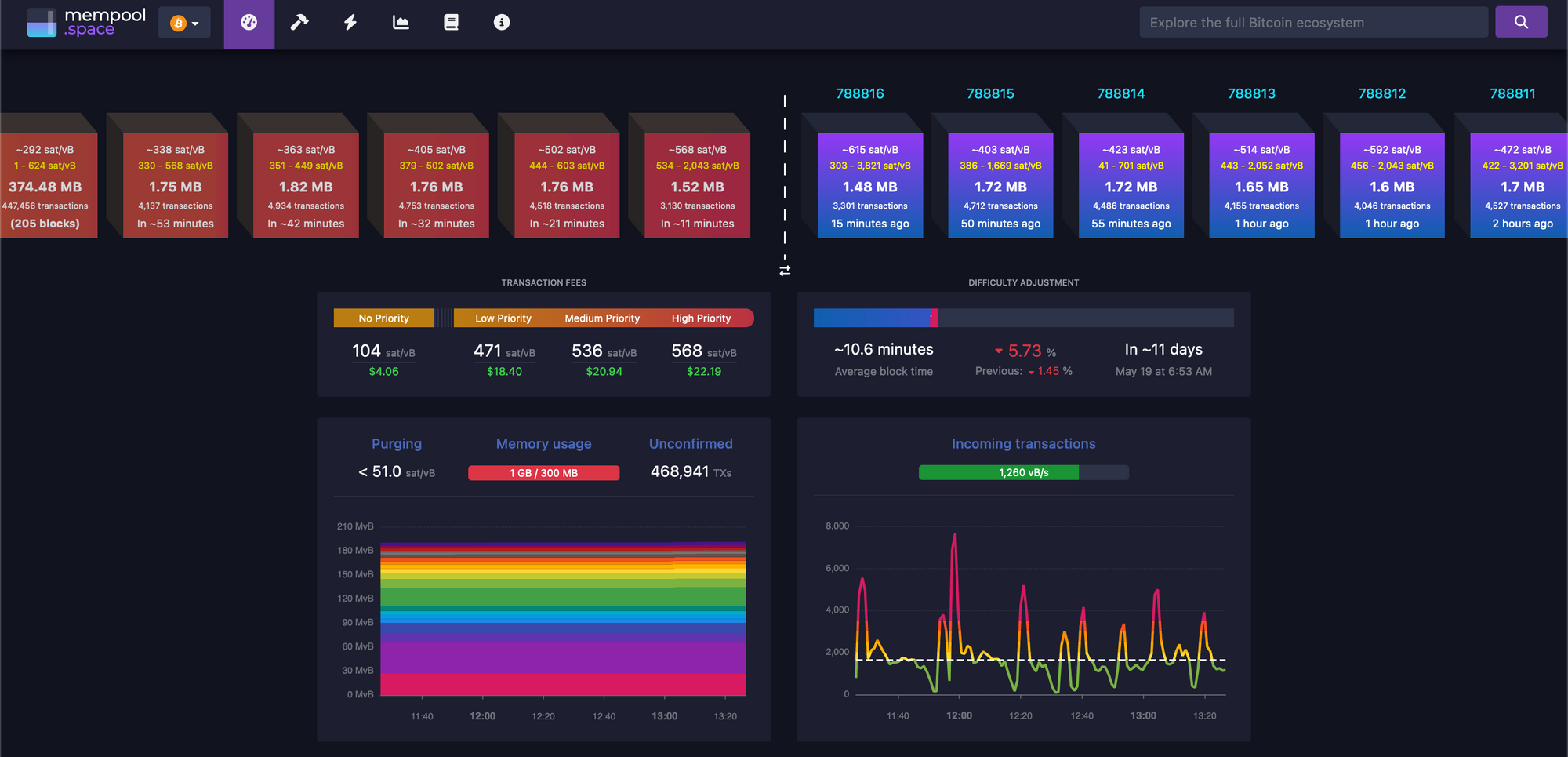
There must be a limit to how much data is transferred across the bitcoin network in order to keep the ability to run and use your own node accessible. A node is required to interact with the global bitcoin network - if you do not use your own node then you must trust someone else's node. If nodes become inaccessible to run then the network will centralize around the remaining entities that operate them - threatening the censorship resistance at the core of bitcoin's value prop. The bitcoin protocol uses three main mechanisms to keep node operation costs low - a fixed limit on the amount of data in each block, an automatic difficulty adjustment that regulates how many blocks are produced based on current mining hash rate, and a robust dynamic transaction fee market.
Bitcoin transaction fees limit network abuse by making usage expensive. There is a cost to every transaction, set by a dynamic free market based on demand for scarce block space. It is an incredibly robust way to prevent spam without relying on centralized entities that can be corrupted or pressured.
After the 2017 bitcoin fee spike we had six years of relative quiet to build tools that would be robust in a sustained high fee market. Fortunately our tools are significantly better now but many still need improvement. Most of the pain points we see today will be mitigated.
The reality is we were never going to be fully prepared - pressure is needed to show the pain points and provide strong incentives to mitigate them.
It will be incredibly interesting to watch how projects adapt under pressure. Optimistic we see great innovation here.
_If you are willing to wait for your transaction to confirm you can pay significantly lower fees. Learn best practices for reducing your fee burden here.
My guide for running and using your own bitcoin node can be found here._
If you found this post helpful support my work with bitcoin.

-
 @ 0e9491aa:ef2adadf
2025-05-23 12:01:18
@ 0e9491aa:ef2adadf
2025-05-23 12:01:18
I often hear "bitcoin doesn't interest me, I'm not a finance person."
Ironically, the beauty of sound money is you don't have to be. In the current system you're expected to manage a diversified investment portfolio or pay someone to do it. Bitcoin will make that optional.
— ODELL (@ODELL) September 16, 2018
At first glance bitcoin often appears overwhelming to newcomers. It is incredibly easy to get bogged down in the details of how it works or different ways to use it. Enthusiasts, such as myself, often enjoy going down the deep rabbit hole of the potential of bitcoin, possible pitfalls and theoretical scenarios, power user techniques, and the developer ecosystem. If your first touch point with bitcoin is that type of content then it is only natural to be overwhelmed. While it is important that we have a thriving community of bitcoiners dedicated to these complicated tasks - the true beauty of bitcoin lies in its simplicity. Bitcoin is simply better money. It is the best money we have ever had.
Life is complicated. Life is hard. Life is full of responsibility and surprises. Bitcoin allows us to focus on our lives while relying on a money that is simple. A money that is not controlled by any individual, company, or government. A money that cannot be easily seized or blocked. A money that cannot be devalued at will by a handful of corrupt bureaucrat who live hundreds of miles from us. A money that can be easily saved and should increase in purchasing power over time without having to learn how to "build a diversified stock portfolio" or hire someone to do it for us.
Bitcoin enables all of us to focus on our lives - our friends and family - doing what we love with the short time we have on this earth. Time is scarce. Life is complicated. Bitcoin is the most simple aspect of our complicated lives. If we spend our scarce time working then we should be able to easily save that accrued value for future generations without watching the news or understanding complicated financial markets. Bitcoin makes this possible for anyone.
Yesterday was Mother's Day. Raising a human is complicated. It is hard, it requires immense personal responsibility, it requires critical thinking, but mothers figure it out, because it is worth it. Using and saving bitcoin is simple - simply install an app on your phone. Every mother can do it. Every person can do it.
Life is complicated. Life is beautiful. Bitcoin is simple.
If you found this post helpful support my work with bitcoin.

-
 @ 0e9491aa:ef2adadf
2025-05-23 12:01:17
@ 0e9491aa:ef2adadf
2025-05-23 12:01:17Will not live in a pod.
Will not eat the bugs.
Will not get the chip.
Will not get a blue check.
Will not use CBDCs.Live Free or Die.
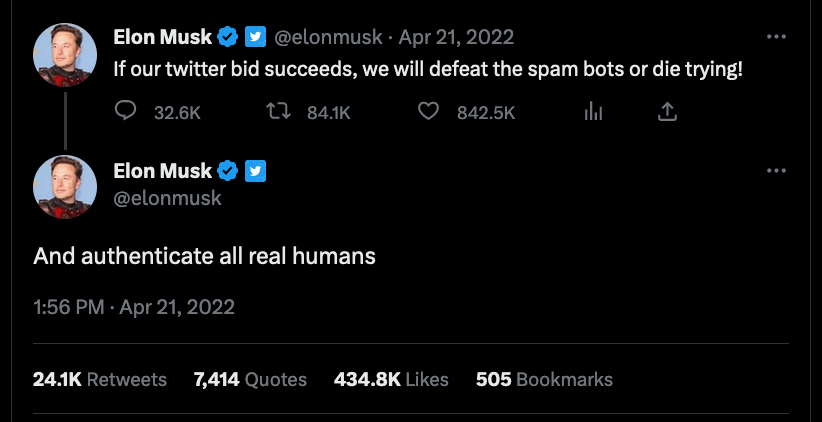
Why did Elon buy twitter for $44 Billion? What value does he see in it besides the greater influence that undoubtedly comes with controlling one of the largest social platforms in the world? We do not need to speculate - he made his intentions incredibly clear in his first meeting with twitter employees after his takeover - WeChat of the West.
To those that do not appreciate freedom, the value prop is clear - WeChat is incredibly powerful and successful in China.
To those that do appreciate freedom, the concern is clear - WeChat has essentially become required to live in China, has surveillance and censorship integrated at its core, and if you are banned from the app your entire livelihood is at risk. Employment, housing, payments, travel, communication, and more become extremely difficult if WeChat censors determine you have acted out of line.
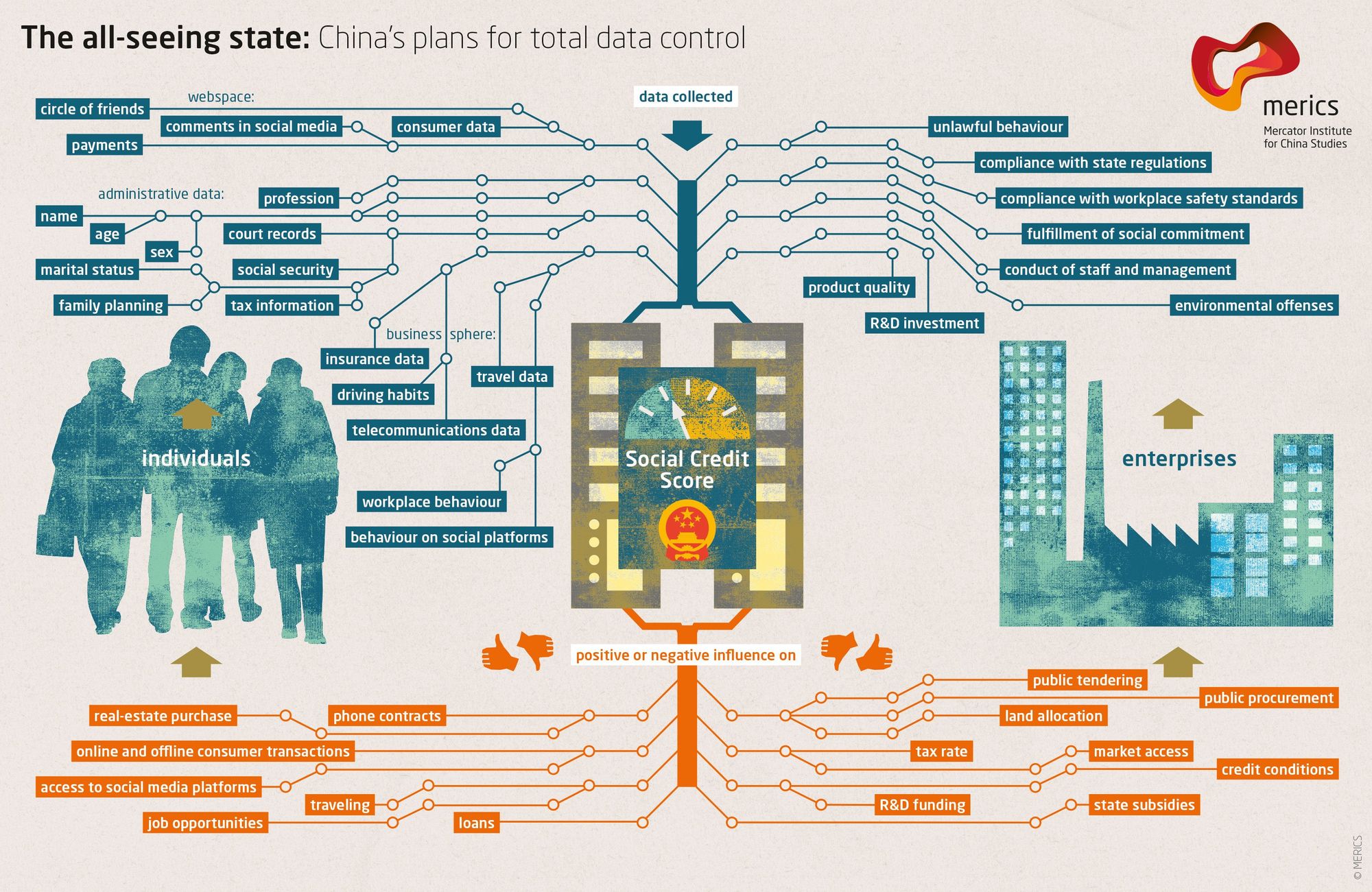
The blue check is the first step in Elon's plan to bring the chinese social credit score system to the west. Users who verify their identity are rewarded with more reach and better tools than those that do not. Verified users are the main product of Elon's twitter - an extensive database of individuals and complete control of the tools he will slowly get them to rely on - it is easier to monetize cattle than free men.
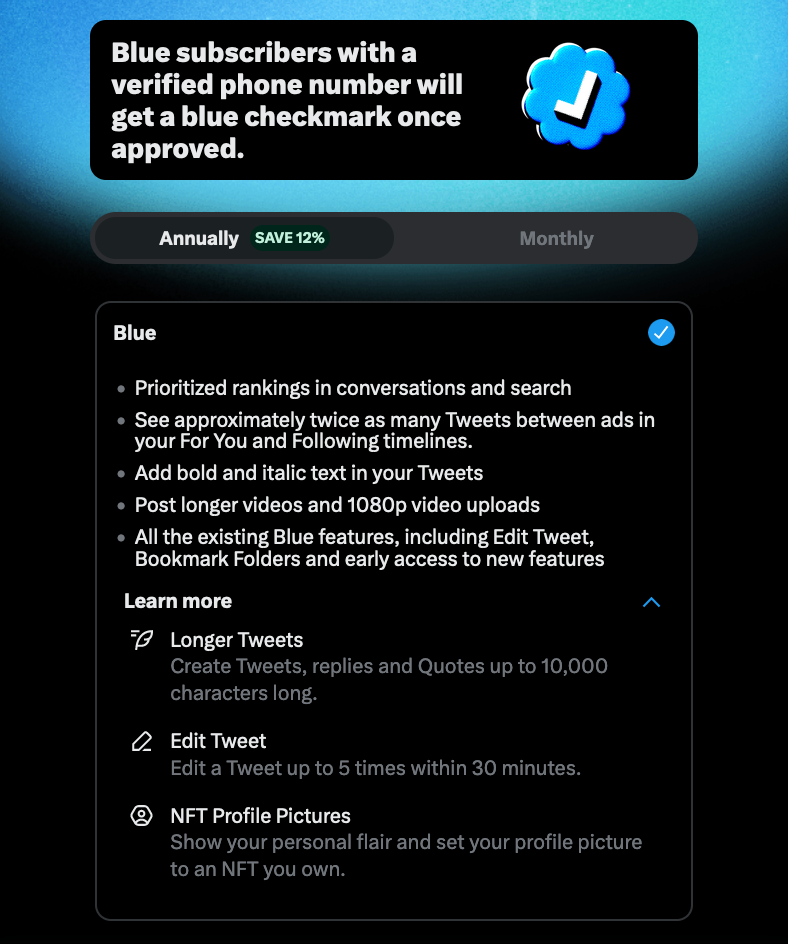
If you cannot resist the temptation of the blue check in its current form you have already lost - what comes next will be much darker. If you realize the need to resist - freedom tech provides us options.
If you found this post helpful support my work with bitcoin.

-
 @ 0e9491aa:ef2adadf
2025-05-23 12:01:17
@ 0e9491aa:ef2adadf
2025-05-23 12:01:17
Nostr is an open communication protocol that can be used to send messages across a distributed set of relays in a censorship resistant and robust way.
If you missed my nostr introduction post you can find it here. My nostr account can be found here.
We are nearly at the point that if something interesting is posted on a centralized social platform it will usually be posted by someone to nostr.
We are nearly at the point that if something interesting is posted exclusively to nostr it is cross posted by someone to various centralized social platforms.
We are nearly at the point that you can recommend a cross platform app that users can install and easily onboard without additional guides or resources.
As companies continue to build walls around their centralized platforms nostr posts will be the easiest to cross reference and verify - as companies continue to censor their users nostr is the best censorship resistant alternative - gradually then suddenly nostr will become the standard. 🫡
Current Nostr Stats
If you found this post helpful support my work with bitcoin.

-
 @ 0e9491aa:ef2adadf
2025-05-23 12:01:17
@ 0e9491aa:ef2adadf
2025-05-23 12:01:17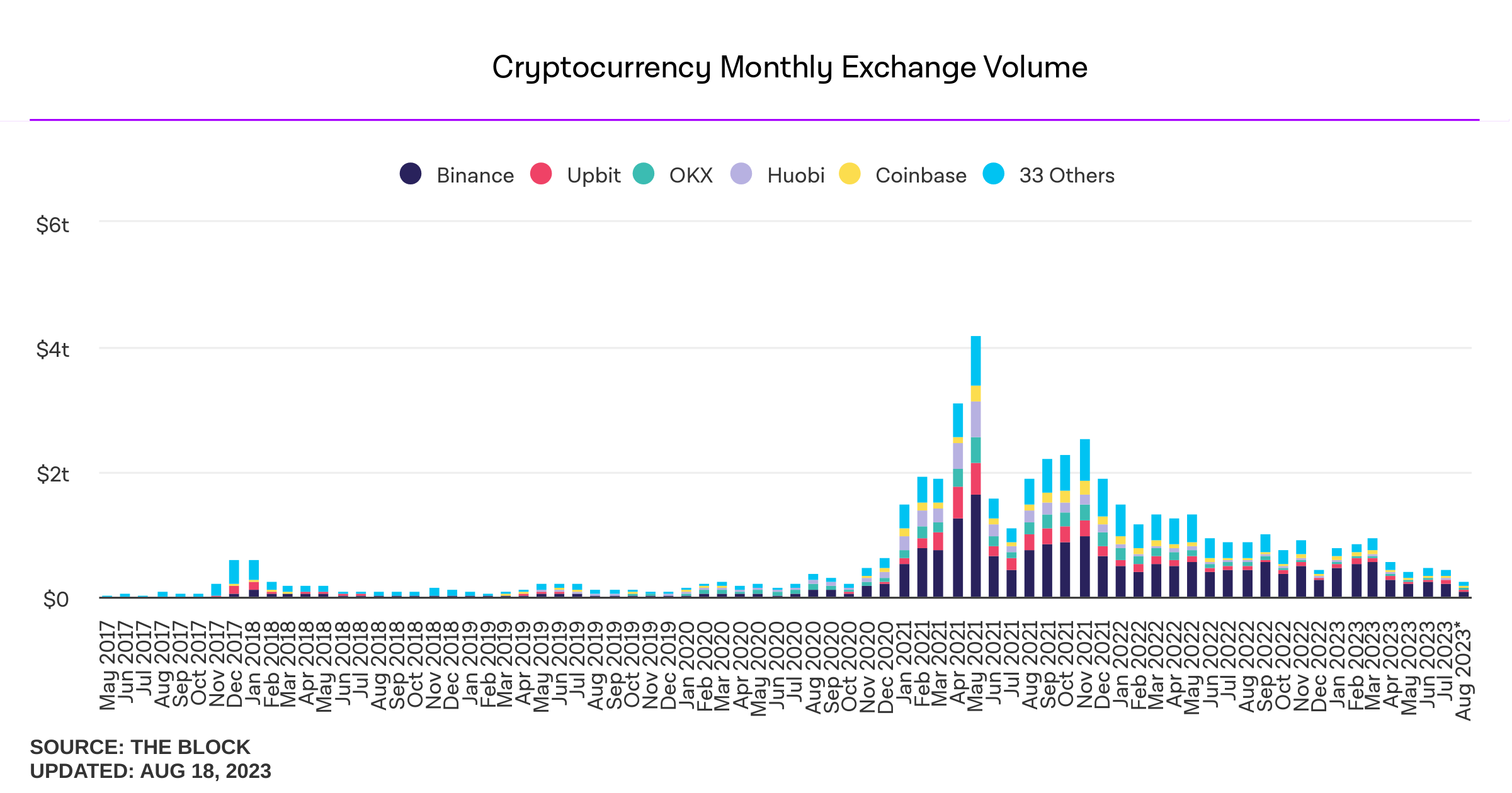
Influencers would have you believe there is an ongoing binance bank run but bitcoin wallet data says otherwise.
- binance wallets are near all time highs
- bitfinex wallets are also trending up
- gemini and coinbase are being hit with massive withdrawals thoughYou should not trust custodians, they can rug you without warning. It is incredibly important you learn how to hold bitcoin yourself, but also consider not blindly trusting influencers with a ref link to shill you.
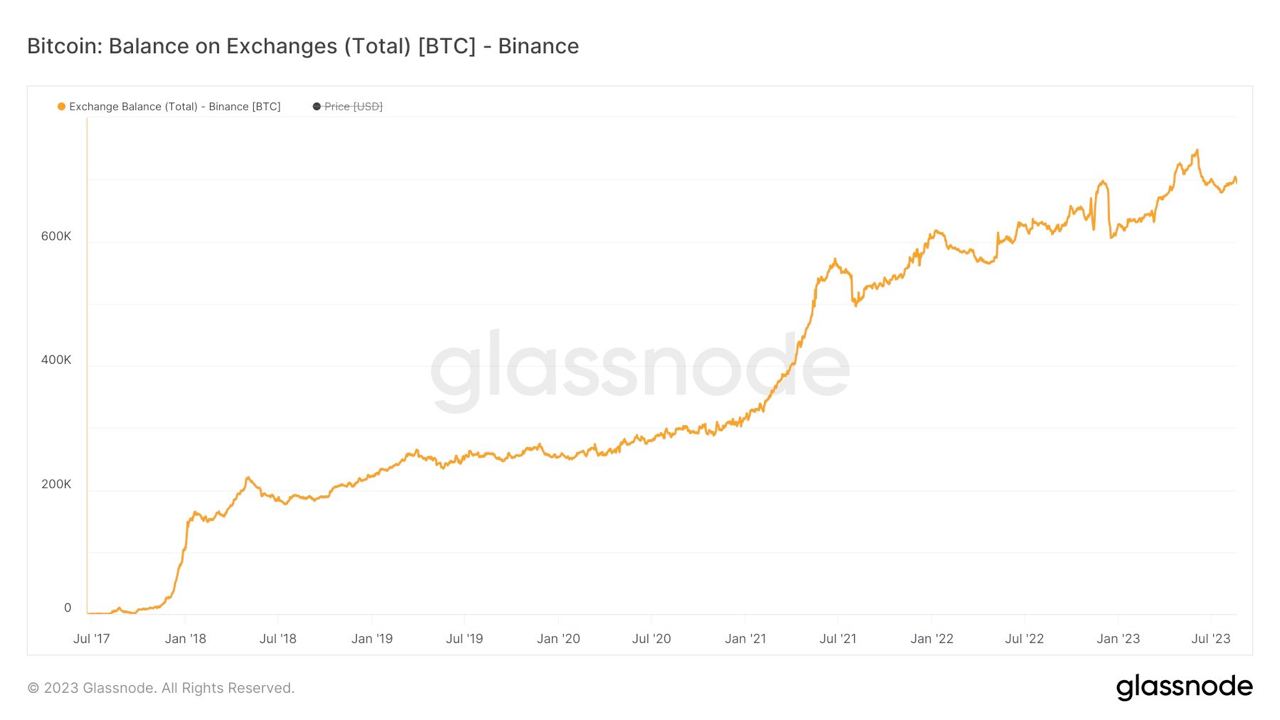
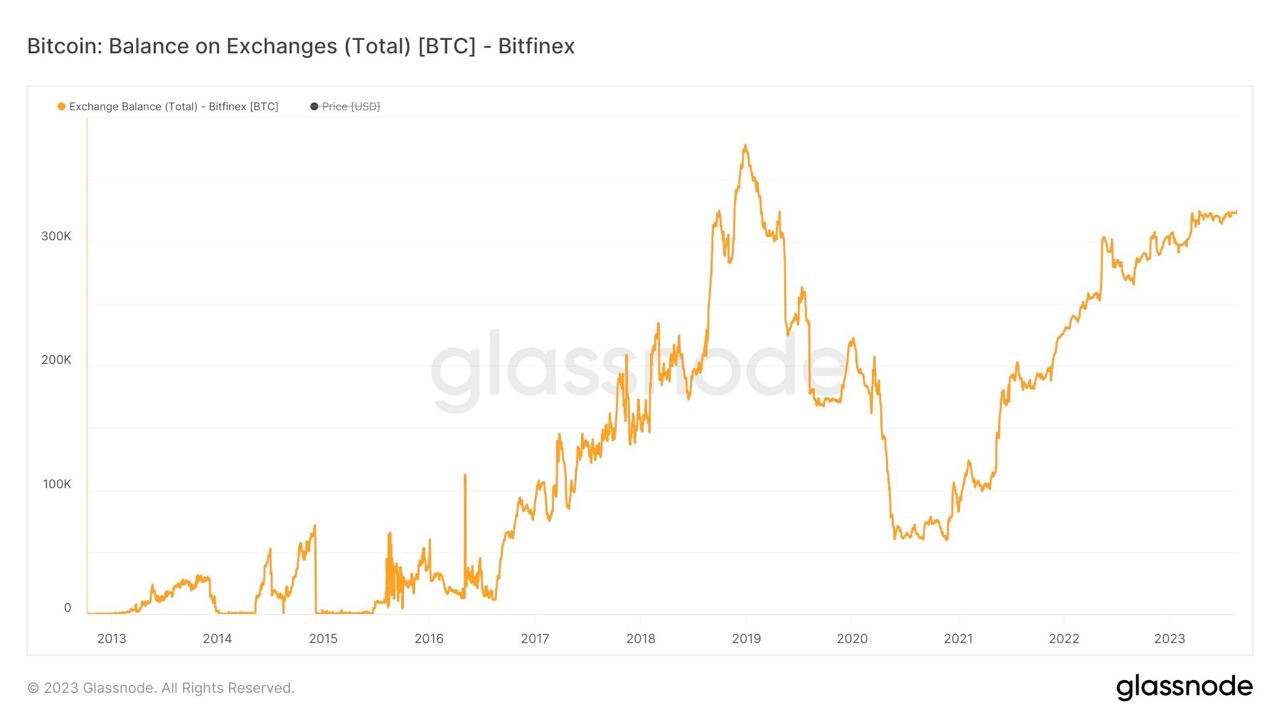
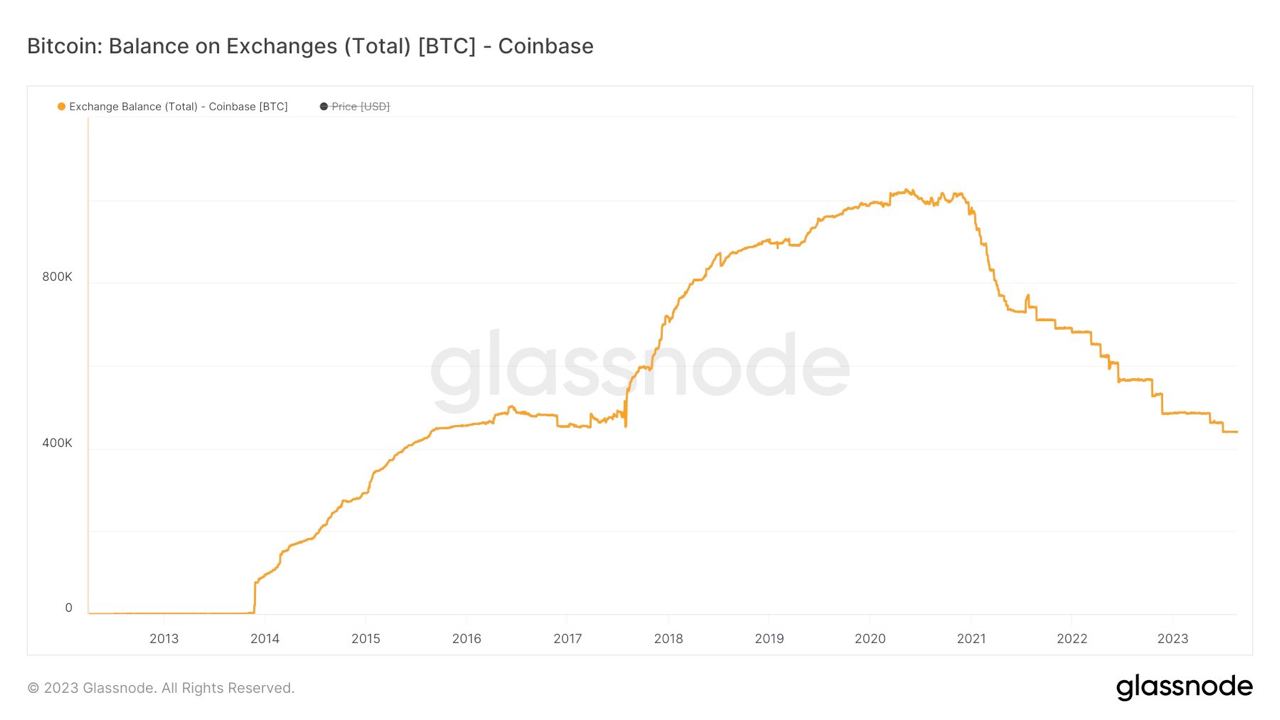
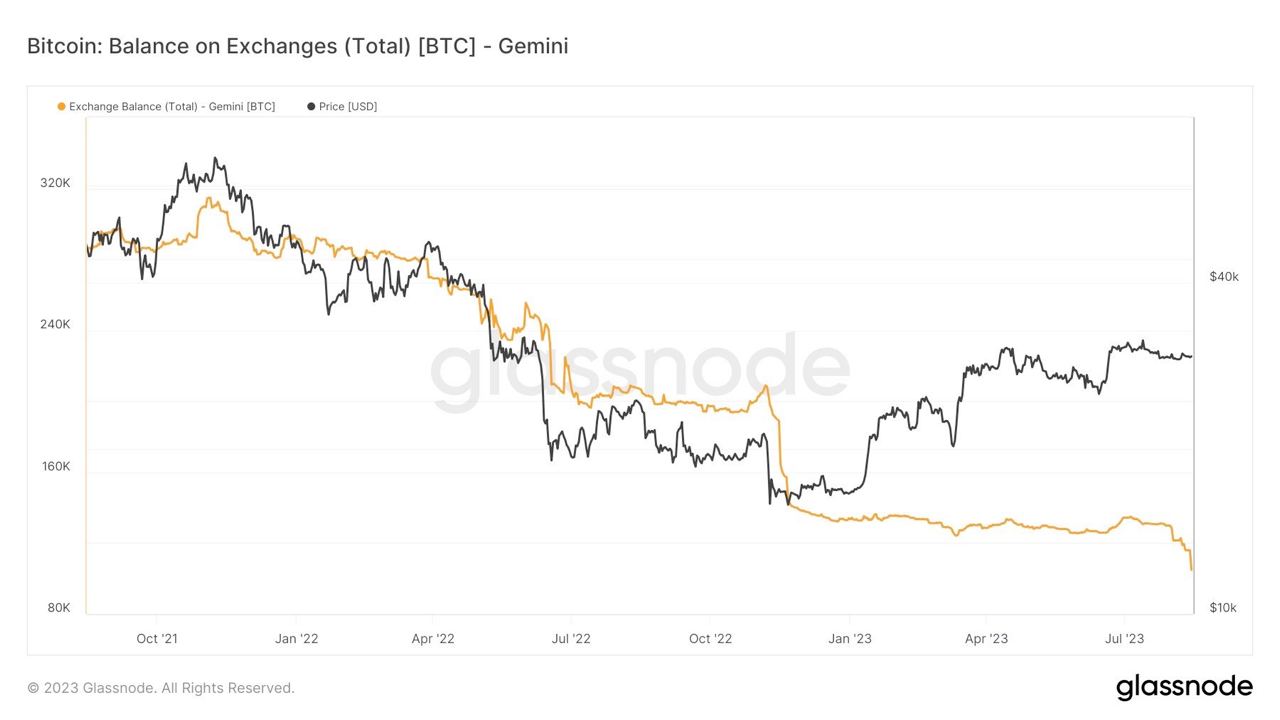
If you found this post helpful support my work with bitcoin.

-
 @ 0e9491aa:ef2adadf
2025-05-23 12:01:17
@ 0e9491aa:ef2adadf
2025-05-23 12:01:17
For years American bitcoin miners have argued for more efficient and free energy markets. It benefits everyone if our energy infrastructure is as efficient and robust as possible. Unfortunately, broken incentives have led to increased regulation throughout the sector, incentivizing less efficient energy sources such as solar and wind at the detriment of more efficient alternatives.
The result has been less reliable energy infrastructure for all Americans and increased energy costs across the board. This naturally has a direct impact on bitcoin miners: increased energy costs make them less competitive globally.
Bitcoin mining represents a global energy market that does not require permission to participate. Anyone can plug a mining computer into power and internet to get paid the current dynamic market price for their work in bitcoin. Using cellphone or satellite internet, these mines can be located anywhere in the world, sourcing the cheapest power available.
Absent of regulation, bitcoin mining naturally incentivizes the build out of highly efficient and robust energy infrastructure. Unfortunately that world does not exist and burdensome regulations remain the biggest threat for US based mining businesses. Jurisdictional arbitrage gives miners the option of moving to a friendlier country but that naturally comes with its own costs.
Enter AI. With the rapid development and release of AI tools comes the requirement of running massive datacenters for their models. Major tech companies are scrambling to secure machines, rack space, and cheap energy to run full suites of AI enabled tools and services. The most valuable and powerful tech companies in America have stumbled into an accidental alliance with bitcoin miners: THE NEED FOR CHEAP AND RELIABLE ENERGY.
Our government is corrupt. Money talks. These companies will push for energy freedom and it will greatly benefit us all.
Microsoft Cloud hiring to "implement global small modular reactor and microreactor" strategy to power data centers: https://www.datacenterdynamics.com/en/news/microsoft-cloud-hiring-to-implement-global-small-modular-reactor-and-microreactor-strategy-to-power-data-centers/
If you found this post helpful support my work with bitcoin.

-
 @ 0e9491aa:ef2adadf
2025-05-23 12:01:16
@ 0e9491aa:ef2adadf
2025-05-23 12:01:16
Humanity's Natural State Is Chaos
Without order there is chaos. Humans competing with each other for scarce resources naturally leads to conflict until one group achieves significant power and instates a "monopoly on violence."Power Brings Stability
Power has always been the key means to achieve stability in societies. Centralized power can be incredibly effective in addressing issues such as crime, poverty, and social unrest efficiently. Unfortunately this power is often abused and corrupted.Centralized Power Breeds Tyranny
Centralized power often leads to tyrannical rule. When a select few individuals hold control over a society, they tend to become corrupted. Centralized power structures often lack accountability and transparency, and rely too heavily on trust.Distributed Power Cultivates Freedom
New technology that empowers individuals provide us the ability to rebuild societies from the bottom up. Strong individuals that can defend and provide for themselves will help build strong local communities on a similar foundation. The result is power being distributed throughout society rather than held by a select few.In the short term, relying on trust and centralized power is an easy answer to mitigating chaos, but freedom tech tools provide us the ability to build on top of much stronger distributed foundations that provide stability while also cultivating individual freedom.
The solution starts with us. Empower yourself. Empower others. A grassroots freedom tech movement scaling one person at a time.
If you found this post helpful support my work with bitcoin.

-
 @ eb0157af:77ab6c55
2025-05-23 12:01:16
@ eb0157af:77ab6c55
2025-05-23 12:01:16Vivek Ramaswamy’s company bets on distressed bitcoin claims as its Bitcoin treasury strategy moves forward.
Strive Enterprises, an asset management firm co-founded by Vivek Ramaswamy, is exploring the acquisition of distressed bitcoin claims, with particular interest in around 75,000 BTC tied to the Mt. Gox bankruptcy estate. This move is part of the company’s broader strategy to build a Bitcoin treasury ahead of its planned merger with Asset Entities.
According to a document filed on May 20 with the Securities and Exchange Commission, Strive has partnered with 117 Castell Advisory Group to “identify and evaluate” distressed Bitcoin claims with confirmed legal judgments. Among these are approximately 75,000 BTC connected to Mt. Gox, with an estimated market value of $8 billion at current prices.
Essentially, Strive aims to acquire rights to bitcoins currently tied up in legal disputes, which can be purchased at a discount by those willing to take on the risk and wait for eventual recovery.
In a post on X, Strive’s CFO, Ben Pham, stated:
“Strive intends to use all available mechanisms, including novel financial strategies not used by other Bitcoin treasury companies, to maximize its exposure to the asset.”
The company also plans to buy cash at a discount by merging with publicly traded companies holding more cash than their stock value, using the excess funds to purchase additional Bitcoin.
Mt. Gox, the exchange that collapsed in 2014, is currently in the process of repaying creditors, with a deadline set for October 31, 2025.
In its SEC filing, Strive declared:
“This strategy is intended to allow Strive the opportunity to purchase Bitcoin exposure at a discount to market price, enhancing Bitcoin per share and supporting its goal of outperforming Bitcoin over the long run.”
At the beginning of May, Strive announced its merger plan with Asset Entities, a deal that would create the first publicly listed asset management firm focused on Bitcoin. The resulting company aims to join the growing number of firms adopting a Bitcoin treasury strategy.
The corporate treasury trend
Strive’s initiative to accumulate bitcoin mirrors that of other companies like Strategy and Japan’s Metaplanet. On May 19, Strategy, led by Michael Saylor, announced the purchase of an additional 7,390 BTC for $764.9 million, raising its total holdings to 576,230 BTC. On the same day, Metaplanet revealed it had acquired another 1,004 BTC, increasing its total to 7,800 BTC.
The post Bitcoin in Strive’s sights: 75,000 BTC from Mt. Gox among its targets appeared first on Atlas21.
-
 @ dfc7c785:4c3c6174
2025-05-23 09:42:37
@ dfc7c785:4c3c6174
2025-05-23 09:42:37Where do I even start? Sometimes it's best to just begin writing whatever comes into your head. What do I do for a living? It used to be easy to explain, I write JavaScript, I build front-end code, in order to build apps. I am more than that though. Over the past eight years, I moved from writing Angular, to React and then to Vue. However my background was originally in writing full-stack projects, using technologies such as .NET and PHP. The thing is - the various jobs I've had recently have pigeon-holed me as front-end developer but nowadays I am starting to feel distracted by a multitude of other interesting, pivotal technologies both in my "day job" and across my wider experience as a Technologist; a phrase I prefer to use in order to describe who I am, more gernerally.
I have used untype.app to write this today, it looks great.
More to come...
-
 @ 5c26ee8b:a4d229aa
2025-05-23 08:47:45
@ 5c26ee8b:a4d229aa
2025-05-23 08:47:45Generally mentioning God, Allah, by reciting/reading the Quran or performing Salat (compulsory prayer), for instance, brings tranquility to the heart of the believer. The Salat, other than being the first deed a Muslim would be questioned about on Judgement Day, it keeps the person away from the forbidden wrong deeds too. The Salat is sufficient for obtaining God’s provision as he decrees the means for it to reach the person. Wasting or missing performing the Salat or mentioning God (Allah) by reciting/reading the Quran or Tasbieh, can lead to following the desires only and a depressed life as well as punishment in the Thereafter.
13:28 Ar-Ra'd
الَّذِينَ آمَنُوا وَتَطْمَئِنُّ قُلُوبُهُمْ بِذِكْرِ اللَّهِ ۗ أَلَا بِذِكْرِ اللَّهِ تَطْمَئِنُّ الْقُلُوبُ
Those who have believed and whose hearts are assured (tranquillised) by the remembrance of Allah. Unquestionably, by the remembrance of Allah hearts are assured (tranquillised)."
29:45 Al-Ankaboot
اتْلُ مَا أُوحِيَ إِلَيْكَ مِنَ الْكِتَابِ وَأَقِمِ الصَّلَاةَ ۖ إِنَّ الصَّلَاةَ تَنْهَىٰ عَنِ الْفَحْشَاءِ وَالْمُنْكَرِ ۗ وَلَذِكْرُ اللَّهِ أَكْبَرُ ۗ وَاللَّهُ يَعْلَمُ مَا تَصْنَعُونَ
Recite, [O Muhammad], what has been revealed to you of the Book and establish prayer. Indeed, prayer prohibits immorality and wrongdoing, and the remembrance of Allah is greater. And Allah knows that which you do.
11:114 Hud
وَأَقِمِ الصَّلَاةَ طَرَفَيِ النَّهَارِ وَزُلَفًا مِنَ اللَّيْلِ ۚ إِنَّ الْحَسَنَاتِ يُذْهِبْنَ السَّيِّئَاتِ ۚ ذَٰلِكَ ذِكْرَىٰ لِلذَّاكِرِينَ
And establish prayer at the two ends of the day and at the approach of the night. Indeed, good deeds do away with misdeeds. That is a reminder for those who remember.
20:132 Taa-Haa
وَأْمُرْ أَهْلَكَ بِالصَّلَاةِ وَاصْطَبِرْ عَلَيْهَا ۖ لَا نَسْأَلُكَ رِزْقًا ۖ نَحْنُ نَرْزُقُكَ ۗ وَالْعَاقِبَةُ لِلتَّقْوَىٰ
And enjoin prayer upon your family [and people] and be steadfast therein. We ask you not for provision; We provide for you, and the [best] outcome is for [those of] righteousness.
20:124 Taa-Haa
وَمَنْ أَعْرَضَ عَنْ ذِكْرِي فَإِنَّ لَهُ مَعِيشَةً ضَنْكًا وَنَحْشُرُهُ يَوْمَ الْقِيَامَةِ أَعْمَىٰ
And whoever turns away from My remembrance - indeed, he will have a depressed life, and We will gather him on the Day of Resurrection blind."
20:125 Taa-Haa
قَالَ رَبِّ لِمَ حَشَرْتَنِي أَعْمَىٰ وَقَدْ كُنْتُ بَصِيرًا
He will say, "My Lord, why have you raised me blind while I was [once] seeing?"
20:126 Taa-Haa
قَالَ كَذَٰلِكَ أَتَتْكَ آيَاتُنَا فَنَسِيتَهَا ۖ وَكَذَٰلِكَ الْيَوْمَ تُنْسَىٰ
[Allah] will say, "Thus did Our signs come to you, and you forgot them; and thus will you this Day be forgotten."
20:127 Taa-Haa
وَكَذَٰلِكَ نَجْزِي مَنْ أَسْرَفَ وَلَمْ يُؤْمِنْ بِآيَاتِ رَبِّهِ ۚ وَلَعَذَابُ الْآخِرَةِ أَشَدُّ وَأَبْقَىٰ
And thus do We recompense he who transgressed and did not believe in the signs of his Lord. And the punishment of the Hereafter is more severe and more enduring.
20:128 Taa-Haa
أَفَلَمْ يَهْدِ لَهُمْ كَمْ أَهْلَكْنَا قَبْلَهُمْ مِنَ الْقُرُونِ يَمْشُونَ فِي مَسَاكِنِهِمْ ۗ إِنَّ فِي ذَٰلِكَ لَآيَاتٍ لِأُولِي النُّهَىٰ
Then, has it not become clear to them how many generations We destroyed before them as they walk among their dwellings? Indeed in that are signs for those of intelligence.
49:17 Al-Hujuraat
يَمُنُّونَ عَلَيْكَ أَنْ أَسْلَمُوا ۖ قُلْ لَا تَمُنُّوا عَلَيَّ إِسْلَامَكُمْ ۖ بَلِ اللَّهُ يَمُنُّ عَلَيْكُمْ أَنْ هَدَاكُمْ لِلْإِيمَانِ إِنْ كُنْتُمْ صَادِقِينَ
They consider it a favor to you that they have accepted Islam. Say, "Do not consider your Islam a favor to me. Rather, Allah has conferred favor upon you that He has guided you to the faith, if you should be truthful."
53:29 An-Najm
فَأَعْرِضْ عَنْ مَنْ تَوَلَّىٰ عَنْ ذِكْرِنَا وَلَمْ يُرِدْ إِلَّا الْحَيَاةَ الدُّنْيَا
So turn away from whoever turns his back on Our message and desires not except the worldly life.
53:30 An-Najm
ذَٰلِكَ مَبْلَغُهُمْ مِنَ الْعِلْمِ ۚ إِنَّ رَبَّكَ هُوَ أَعْلَمُ بِمَنْ ضَلَّ عَنْ سَبِيلِهِ وَهُوَ أَعْلَمُ بِمَنِ اهْتَدَىٰ
That is their sum of knowledge. Indeed, your Lord is most knowing of who strays from His way, and He is most knowing of who is guided.
53:62 An-Najm
فَاسْجُدُوا لِلَّهِ وَاعْبُدُوا ۩
So prostrate to Allah and worship [Him].
-
 @ eb0157af:77ab6c55
2025-05-23 12:01:15
@ eb0157af:77ab6c55
2025-05-23 12:01:15According to the ECB Executive Board member, the launch of the digital euro depends on the timing of the EU regulation.
The European Central Bank (ECB) is making progress in preparing for the digital euro. According to Piero Cipollone, ECB Executive Board member and coordinator of the project, the technical phase “is proceeding quickly and on schedule,” but moving to operational implementation still requires political approval of the regulation at the European level.
Speaking at the ‘Voices on the Future’ event organized by Ansa and Asvis, Cipollone outlined a possible timeline:
“If the regulation is approved at the start of 2026 — in the best-case scenario for the European legislative process — we could see the first transactions with the digital euro by mid-2028.”
Cipollone also highlighted Europe’s current dependence on electronic payment systems managed by non-European companies:
“Today in Europe, whenever we don’t use cash, any transaction online or at the supermarket has to go through credit cards, with their fees. The payment system relies on companies that aren’t based in Europe. You can see why it would make sense to have a system fully under our control.”
For the ECB board member, the digital euro would act as a direct alternative to cash in the digital world, working like “a banknote you can spend anywhere in Europe for any purpose.”
The digital euro project is part of the ECB’s broader strategy to strengthen the independence of Europe’s financial system. According to Cipollone and the Central Bank, Europe’s digital currency would be a key step toward greater autonomy in electronic payments, reducing reliance on infrastructure and services outside the European Union.
The post ECB: digital euro by mid-2028, says Cipollone appeared first on Atlas21.
-
 @ 662f9bff:8960f6b2
2025-05-23 07:38:51
@ 662f9bff:8960f6b2
2025-05-23 07:38:51I have been really busy this week with work - albeit back in Madeira - so I had little time to read or do much other than work. In the coming weeks I should have more time - I am taking a few weeks off work and have quite a list of things to do.
First thing is to relax a bit and enjoy the pleasant weather here in Funchal for a few days. With 1st May tomorrow it does seem that there will be quite a bit to do..
Some food for thought for you. Who takes and makes your decisions? Do you make them yourself based on information that you have and know to be true or do you allow other people to take and make decisions for you? For example - do you allow governments or unaccountable beaureaucrats and others to decide for you and even to compell you?
In theory Governments should respect Consent of the Governed and the 1948 Universal Declaration of Human Rights states that "The will of the people shall be the basis of the authority of government". For you to decide if and to what extent governments today are acting in line with these principles. If not, what can you do about it? I dive into this below and do refer back to letter 9 - section: So What can you do about it.
First, a few things to read, watch and listen to
-
I Finance the Current Thing by Allen Farrington - when money is political, everything is political...
-
Prediction for 2030 (the Great Reset). Sorelle explains things pretty clearly if you care to watch and listen...
-
The Global Pandemic Treaty: What You Need to Know . James Corbett is pretty clear too... is this being done with your support? Did you miss something?
-
Why the Past 10 Years of American Life Have Been Uniquely Stupid - fascinating thinking on how quite a few recent things came about...
And a few classics - you ought to know these already and the important messages in them should be much more obvious now...
-
1984 by George Orwell - look for the perpetual war & conflict, ubiquitous surveillance and censorship not to mention Room 101
-
Animal farm - also by George Orwell - note how the pigs end up living in the farmhouse exceeding all the worst behaviour of the farmer and how the constitution on the wall changes. Things did not end well for loyal Boxer.
-
Brave New World by Aldous Huxley- A World State, inhabited by genetically modified citizens and an intelligence-based social hierarchy - the novel anticipates large scale psychological manipulation and classical conditioning that are combined to make a dystopian society which is challenged by only a single individual who does not take the Soma.
For more - refer to the References and Reading List
The 7 Habits of Highly Effective People
One of the most transformative books that I ever read was 7 Habits of Highly Effective People by Steven Covey. Over many years and from researching hstorical literature he found seven traits that successful people typically display. By default everyone does the opposite of each of these! Check how you do - be honest...
-
Habits 1-3 are habits of Self - they determine how you behave and feel
-
Habits 4-6 are habits of interpersonal behaviour - they determine how you deal with and interact with others
-
Habit 7 is about regeneration and self care - foundation for happy and healthy life and success
One: Be proactive
Choose your responses to all situations and provocations - your reaction to a situation determines how you feel about it.
By default people will be reactive and this controls their emotions
Two: Begin with the end in mind
When you start to work on something, have a clear view of the goal to be achieved; it should be something substantial that you need and will value.
By default people will begin with what is in front of them or work on details that they can do or progress without having a clear view on the end result to be achieved
Three: Put First things First
Be clear on, and begin with, the Big Rocks- the most important things. If you do not put the Big Rocks into your planning daily activities, your days will be full of sand and gravel! All things can be categorised as Urgent or Not-Urgent and Important or Not-Important.
By Default people will focus on Urgent regardless of importance - all of the results come from focusing on Important Non-Urgent things. All of the 7 Habits are in this category!
Four: Seek Win-Win in all dealings with people and in all negotiations
This is the only sustainable outcome; if you cannot achieve Win-Win then no-deal is the sustainable alternative.
By default people will seek Win-Loose - this leads to failed relationships
Five: Seek first to understand - only then to be understood.
Once you visibly understand the needs and expectations of your counterpart they will be open to listening to your point of view and suggestions/requests - not before!
By default people will expound their point of view or desired result causing their counterpart to want to do the same - this ends in "the dialogue of the deaf"
Six: Synergise - Seek the 3rd alternative in all problems and challenges
Work together to find a proposal that is better than what each of you had in mind
By default people will focus on their own desired results and items, regardless of what the other party could bring to help/facilitate or make available
Seven: Sharpen the saw
Take time to re-invigorate and to be healthy - do nothing to excess. Do not be the forrester who persists in cutting the tree with a blunt saw bcause sharpening it is inconvenient or would "take too much time"!
By default people tend to persist on activities and avoid taking time to reflect, prepare and recover
Mindaps - a technique by Tony Buzan
Many years ago I summarised this in a Mind Map (another technique that was transformative for me - a topic for another Letter from around the world!) see below. Let me know if this interests you - happy to do an explainer video on this!
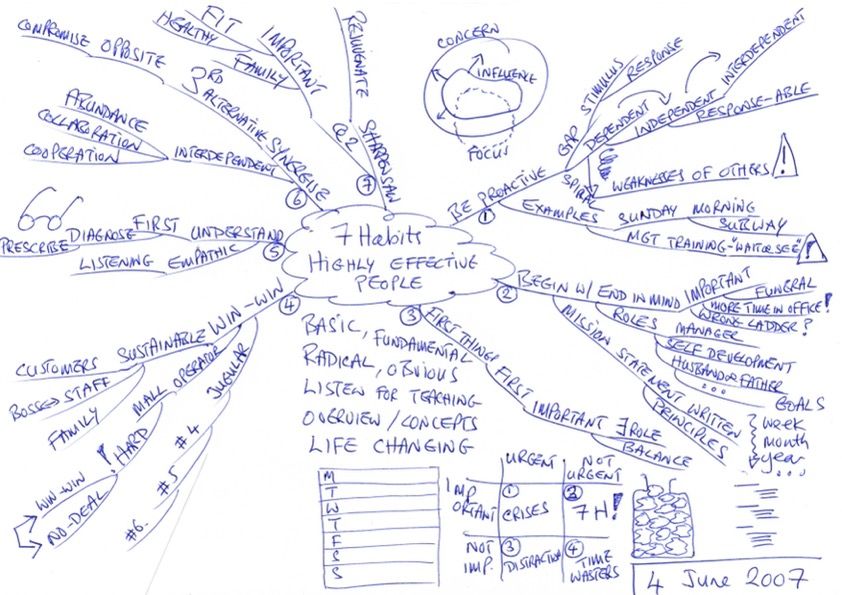
That's it!
No one can be told what The Matrix is.\ You have to see it for yourself.**
Do share this newsletter with any of your friends and family who might be interested.
You can also email me at: LetterFrom@rogerprice.me
💡Enjoy the newsletters in your own language : Dutch, French, German, Serbian, Chinese Traditional & Simplified, Thai and Burmese.
-
-
 @ eb0157af:77ab6c55
2025-05-23 12:01:14
@ eb0157af:77ab6c55
2025-05-23 12:01:14A new study reveals: 4 out of 5 Americans would like the US to convert some of its gold into Bitcoin.
A recent survey conducted by the Nakamoto Project revealed that a majority of Americans support converting a portion of the United States’ gold reserves into Bitcoin. The survey, carried out online by Qualtrics between February and March 2025, involved 3,345 participants with demographic characteristics representative of US census standards. Most respondents expressed a desire to convert between 1% and 30% of the gold reserves into BTC.
Troy Cross, co-founder of the Nakamoto Project, stated:
“When given a slider and asked to advise the US government on the right proportion of Bitcoin and gold, subjects were very reluctant to put that slider on 0% Bitcoin and 100% gold. Instead, they settled around 10% Bitcoin.”
One significant finding from the research is the correlation between age and openness to Bitcoin: younger respondents showed a greater inclination toward the cryptocurrency compared to older generations.
A potential US strategy
Bo Hines, a White House advisor, is promoting an initiative for the Treasury Department to acquire Bitcoin by selling off a portion of its gold. Under the proposed plan, the government could acquire up to 1 million BTC over the next five years.
To finance these purchases, the government plans to sell Federal Reserve gold certificates. The proposal aligns with Senator Cynthia Lummis’ 2025 Bitcoin Act, which aims to declare Bitcoin a critical national strategic asset.
Currently, the United States holds 8,133 metric tons of gold, valued at over $830 billion, and about 200,000 BTC, valued at $21 billion.
The post The majority in the US wants to convert part of the gold reserves into Bitcoin appeared first on Atlas21.
-
 @ 502ab02a:a2860397
2025-05-23 07:35:13
@ 502ab02a:a2860397
2025-05-23 07:35:13แหม่ ต้องรีบแวะมาเขียนไว้ก่อน ของกำลังร้อนๆ #ตัวหนังสือมีเสียง เพลง ลานกรองมันส์ นั้นเรื่องที่มาที่ไปน่าจะไปตามอ่านในเพจ ลานกรองมันส์ ได้ครับ recap คร่าวๆคือมันคือ พื้นที่สร้างสรรค์ที่เปิดให้มาทำกิจกรรมต่างๆนานากันได้ครับ
วันนี้เลยจะมาเล่าเรื่องวิธีการใช้คำ ซึ่งมันส์ดีตามชื่อลาน ฮาๆๆๆ ผมตั้งโจทย์ไว้เลยว่า ต้องมีคำว่า ลานกรองมันส์ แน่ๆแล้ว เพราะเป็นชื่อสถานที่ จากนั้นก็เอาคำว่า ลานกองมัน มาแตกขยายความเพราะมันคือต้นกำเนิดเดิมของพื้นที่นั้น คือเป็นลานที่เอาหัวมันมากองกันเอาไว้ รอนำไปผลิตต่อเป็นสินค้าการเกษตรต่างๆ
ตอนนี้เขาเลิกทำไปแล้ว จึงกลายมาเป็น ลานกรองมันส์ ที่เอาชื่อเดิมมาแปลง
เมื่อได้คำหลักๆแล้วผมก็เอาพยัญชนะเลย ลอลิง กอไก่ มอม้า คือตัวหลักของเพลง
โทนดนตรีไม่ต้องเลือกเลยหนีไม่พ้นสามช่าแน่นอน โทนมันมาตั้งแต่เริ่มคิดจะเขียนเลยครับ ฮาๆๆๆ
ผมพยายามแบ่งวรรคไว้ชัดๆ เผื่อไว้เลยว่าอนาคตอาจมีการทำดนตรีแบบแบ่งกันร้อง วรรคของมันเลยเป็น หมู่ เดี่ยว หมู่ เดี่ยว หมู่ เดี่ยว หมู่ แบบสามโทนเลย
ท่อนหมู่นั้น คิดแบบหลายชั้นมากครับ โดยเฉพาะคำว่า มัน เอามันมากอง มันที่ว่าได้ทั้งเป็นคำกิริยา คือ เอามันมากองๆ หรือ มันที่ว่าอาจหมายถึงตัวความฝันเองเป็นคำลักษณะนามเรียกความฝัน "ลานกรองมันส์ เรามาลองกัน มาร่วมกันมอง ลานกรองมันส์ มาร่วมสร้างฝัน เอามันมากอง"
หรือแม้แต่ท่อนต่างๆ ก็เล่นคำว่า มัน กอง เพื่อให้รู้สึกย้ำท่อนหมู่ ที่มีคำว่ามัน เป็นพระเอกหลายหน้า ทั้งความสนุก ทั้งลักษณะนามความฝัน ทั้งกิริยา "ทุกคน ต่างมี ความฝัน เอามา รวมกัน ให้มันเป็นกอง"
อีกท่อนที่ชอบมากตอนเขียนคือ ทำที่ ลานกรองมันส์ idea for fun everyone can do เพราะรู้สึกว่า การพูดภาษาอังกฤษสำเนียงไทยๆ มันตูดหมึกดี ฮาๆๆๆๆ
หัวใจของเพลงคือจะบอกว่า ใครมีฝันก็มาเลย มาทำฝันกัน เรามีที่ให้คุณ ไม่ต้องกลัวอะไรที่จะทำฝันของตัวเอง เล็กใหญ่ ผิดถูก ขอให้ทำมัน อย่าให้ใครหยุดฝันของคุณ นอกจากตัวคุณเอง
เพลงนี้ไม่ได้ลงแพลทฟอร์ม เพราะส่งมอบให้ทาง ลานกรองมันส์เขาครับ ใช้ตามอิสระไปเลย ดังนั้นก็อาจต้องฟังในโพสนี้ หรือ ในยูทูปนะครับ https://youtu.be/W-1OH3YldtM?si=36dFbHgKjiI_9DI8
เนื้อเพลง "ลานกรองมันส์"
ลานกรองมันส์ ขอเชิญทุกท่าน มามันกันดู นะโฉมตรู มาลองดูกัน อ๊ะ มาลันดูกอง
มีงาน คุยกัน สังสรรค์ ดื่มนม ชมจันทร์ ปันฝัน กันเพลิน ทุกคน ต่างล้วน มีดี เรานั้น มีที่ พี่นี้มีโชว์ เอ้า
ลานกรองมันส์ เรามาลองกัน มาร่วมกันมอง ลานกรองมันส์ มาร่วมสร้างฝัน เอามันมากอง
จะเล็ก จะใหญ่ ให้ลอง เราเป็น พี่น้อง เพื่อนพ้อง ต้องตา ทุกคน ต่างมี ความฝัน เอามา รวมกัน ให้มันเป็นกอง เอ้า
ลานกรองมันส์ เรามาลองกัน มาร่วมกันมอง ลานกรองมันส์ มาร่วมสร้างฝัน เอามันมากอง
ชีวิต เราคิดเราทำ ทุกสิ่งที่ย้ำ คือทำสุดใจ จะเขียน จะเรียน จะรำ ทำที่ ลานกรองมันส์ idea for fun everyone can do
ลานกรองมันส์ เรามาลองกัน มาร่วมกันมอง ลานกรองมันส์ มาร่วมสร้างฝัน เอามันมากอง
เรามา ลั่นกลองให้มัน เฮไหนเฮกัน ที่ลานกรองมันส์ ให้ฝัน บันเทิง…
ตัวหนังสือมีเสียง #pirateketo #siamstr
-
 @ eb0157af:77ab6c55
2025-05-23 12:01:13
@ eb0157af:77ab6c55
2025-05-23 12:01:13The exchange reveals the extent of the breach that occurred last December as federal authorities investigate the recent data leak.
Coinbase has disclosed that the personal data of 69,461 users was compromised during the breach in December 2024, according to documentation filed with the Maine Attorney General’s Office.
The disclosure comes after Coinbase announced last week that a group of hackers had demanded a $20 million ransom, threatening to publish the stolen data on the dark web. The attackers allegedly bribed overseas customer service agents to extract information from the company’s systems.
Coinbase had previously stated that the breach affected less than 1% of its user base, compromising KYC (Know Your Customer) data such as names, addresses, and email addresses. In a filing with the U.S. Securities and Exchange Commission (SEC), the company clarified that passwords, private keys, and user funds were not affected.
Following the reports, the SEC has reportedly opened an official investigation to verify whether Coinbase may have inflated user metrics ahead of its 2021 IPO. Separately, the Department of Justice is investigating the breach at Coinbase’s request, according to CEO Brian Armstrong.
Meanwhile, Coinbase has faced criticism for its delayed response to the data breach. Michael Arrington, founder of TechCrunch, stated that the stolen data could cause irreparable harm. In a post on X, Arrington wrote:
“The human cost, denominated in misery, is much larger than the $400m or so they think it will actually cost the company to reimburse people. The consequences to companies who do not adequately protect their customer information should include, without limitation, prison time for executives.”
Coinbase estimates the incident could cost between $180 million and $400 million in remediation expenses and customer reimbursements.
Arrington also condemned KYC laws as ineffective and dangerous, calling on both regulators and companies to better protect user data:
“Combining these KYC laws with corporate profit maximization and lax laws on penalties for hacks like these means these issues will continue to happen. Both governments and corporations need to step up to stop this. As I said, the cost can only be measured in human suffering.”
The post Coinbase: 69,461 users affected by December 2024 data breach appeared first on Atlas21.
-
 @ eb0157af:77ab6c55
2025-05-23 12:01:12
@ eb0157af:77ab6c55
2025-05-23 12:01:12Bitcoin adoption will come through businesses: neither governments nor banks will lead the revolution.
In recent years, it’s undeniable that Bitcoin has ceased to be just a radical idea born from the minds of cypherpunks. It is now recognized across the board as a global asset, discussed in the upper echelons of finance, accepted even on Wall Street, purchased by banking groups and included as a “strategic reserve” by some nations.
However, the general perception that hovers today regarding Bitcoin’s diffusion is still that of minimal adoption, almost insignificant. Bitcoin exists, certainly, but in fact it is not being used. It is rarely possible to pay in satoshis in commercial establishments. Demand is still extremely low.
Furthermore, the debate on Bitcoin is still practically absent: excluding some local events, some niche media outlets or some timid discussion, today Bitcoin is in fact excluded from general interest. The level of understanding and knowledge of the phenomenon is certainly still very low.
Yet, Bitcoin represents an unprecedented technological improvement, capable of solving many problems inherent in the fiat system in which we live. What could facilitate its diffusion?
Bitcoin becomes familiar when businesses adopt it
When talking about Bitcoin adoption, many look to States. They imagine governments that legislate or accumulate Bitcoin as a “strategic reserve,” or banks perceived as forward-thinking that would lead technological change, opening up to innovation. But the reality is different: bureaucracy, political constraints, and fear of losing control inherently prevent States and central banks from being pioneers.
What really drives Bitcoin adoption are not States, but businesses. It is the forward-looking entrepreneurs, innovative startups and – eventually – even large multinational companies that decide to integrate Bitcoin into their operating systems that drive adoption. Indeed, the business world has always played a key role in the adoption of new technologies. This was the case, for example, with the internet, e-commerce, mobile telephony, and the cloud. It will also be the case with Bitcoin.
Unlike a State, when a company adopts Bitcoin, it does so for concrete reasons: efficiency, savings, protection, access to new markets, independence from traditional banking circuits, or bureaucratic streamlining. It is a rational choice, not an ideological one, dictated by the intent to improve one’s competitiveness against the competition to survive in the market.
What is currently missing to facilitate adoption is, in all likelihood, a significant number of businesses that have decided to integrate Bitcoin into their company systems.
Bitcoin becomes “normal” when it is integrated into the operational flow of businesses. Holding and framing bitcoin on the balance sheet, paying an invoice, paying salaries to employees in satoshis, making value transfers globally thanks to the blockchain, allowing customers to pay via Lightning Network… when all this becomes possible with the same simplicity with which we use the euro or the dollar, Bitcoin stops being alternative and becomes the standard.
Businesses are not just users. They are adoption multipliers. When a company chooses Bitcoin, it is automatically proposing it to customers, employees, suppliers, and institutional stakeholders. Each business adoption equals tens, hundreds, or thousands of new eyes on Bitcoin.
People, after all, trust what they see every day: if your trusted restaurant accepts bitcoin, or if your favorite e-commerce platform uses it to receive international payments, or if your colleague receives it as a salary, then Bitcoin no longer appears to be a mysterious object. It finally begins to be perceived as a real, useful, and functioning tool.
The integration of a technology in companies helps make it understandable, accessible, and legitimate in the eyes of the public. This is how distrust is overcome: by making Bitcoin visible in daily life.
Bitcoin and businesses today
A River Financial report estimates that as of May 2025, only 5% of bitcoin is currently owned by private businesses. A still very small number.

According to research by River, in May 2025 businesses hold just over a million btc (about 5% of available monetary units). More than two-thirds of bitcoin (68.2%) are in the hands of private individuals.
To promote Bitcoin adoption, it is necessary today to support businesses in integrating this standard, leveraging all its enormous opportunities. Among others, this technology allows for fast, economical, and global payments. It eliminates intermediaries, increases transparency and security in value transfers. It removes bureaucratic frictions and allows opening up to a new global market.
Every sector can benefit from Bitcoin: e-commerce, tourism, industry, restaurants, professional services, or any other business. Bitcoin revolutionizes the concept of money, and money is a transversal working tool.
We are still at the beginning, but several signals are encouraging. According to a study by Bitwise and reported by Atlas21, in the first quarter of 2025, a growing number of US companies (+16.11% compared to the previous one) are including Bitcoin in their balance sheets, not just as a financial bet, but as a long-term strategy to protect their assets and access a decentralized monetary system to transfer value worldwide without resorting to financial intermediaries.
Who is driving the change?
Echoing the words of Roy Sheinfeld, CEO of Breez, the true potential of Bitcoin will be unleashed first and foremost from the work of developers, the true architects in designing and refining tools that are increasingly simple and intuitive to use for anyone, regardless of level of expertise. It is the developers – Roy rightly argued – who will enable us to “conquer the world.”
But probably that’s not enough: the next step is to make Bitcoin a globally accepted technological standard, changing its perception towards the general public. And this is where businesses come into play.
Guided by the market, technological innovation, and the desire to meet user demands, entrepreneurs today represent the fulcrum to accelerate the monetary transition from the current fiat system towards the Bitcoin standard. It is entrepreneurs who transform innovations from opportunities for a few to a reality shared by many.
The adoption of Bitcoin will therefore not arise from a sudden event, nor from the exclusive fruit of enthusiasts’ enthusiasm or from arbitrary political choices decreed by States or regulators.
The future of Bitcoin is built in the places where value is created every day: in companies, in their systems, and in their strategic decisions.
“If we conquer developers, we conquer the world. If we conquer businesses, we conquer adoption.”
The post The key to Bitcoin adoption is businesses appeared first on Atlas21.
-
 @ e97aaffa:2ebd765d
2025-05-23 07:30:53
@ e97aaffa:2ebd765d
2025-05-23 07:30:53Passou alguns dias, após as eleições legislativas, a cabeça está mais fria, é um bom momento para um rescaldo e para um pouco de futurologia. Esta análise vai ser limitada apenas aos grandes partidos.
Podemos resumir esta eleição, numa única palavra: Terramoto.
A AD ganhou, mas o grande destaque foi a queda do PS e a subida do Chega. Se a governação do país estava difícil, agora com este novo desenho da assembleia, será quase impossível, piorou bastante. Neste momento, ainda falta contabilizar os votos da emigração, mas o mais provável é o Chega ultrapassar o PS.
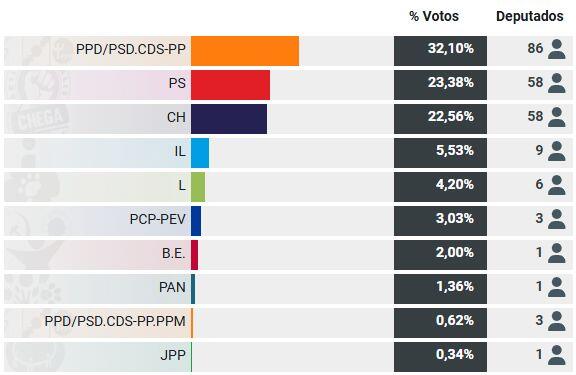
A queda do PS foi tremenda, ninguém esperava tal coisa, o partido está em estado de choque. O partido vai necessitar de tempo para estabilizar e para se reconstruir.
Devido a motivos constitucionais (6 meses antes e 6 meses depois da eleição do presidente da República) só poderá existir eleições no final do próximo ano, isso garante que o novo governo da AD vai estar no poder pelo menos um ano. Isso vai obrigar a aprovação do próximo orçamento de estado, como o PS necessita de tirar os holofotes sobre si, vai facilitar o governo. Provavelmente vai existir um acordo de cavalheiro, um pacto de não agressão entre o governo e o PS, o PS vai se abster na votação do orçamento de estado e a governo não fará revisão constituicional sem o consentimento do PS e também não fará reformas nas leis ou políticas que sejam contra os princípios básicos do partido socialista. Em suma, não haverá grandes reformas, será um governo de gestão com ligeiramente mais poderes.
Não será um governo de bloco central, nem um governo da AD com apoio PS, será apenas um governo da AD com uma falsa oposição do PS. Um governo de bloco central, é uma bomba nuclear, ainda seria demasiado cedo para utilizá-la.
O Partido Socialista sabe que, para ter algumas hipóteses de vencer a próxima eleição, necessita de estar bem e o governo da AD tem que demonstrar algum desgaste, uma queda na popularidade. Eu não acredito que um ano seja suficiente, talvez, seja necessário 2 anos. Isto significa que o país poderá ficar estagnado 1 ou 2 anos, se o governo não conseguir fazer grandes reformas, se os cidadãos não virem/sentirem sinais de mudança, vai dar ainda mais força ao Chega.
Eu acredito que o ponto chave, é a imigração, o governo terá que demonstrar muito trabalho e minimizar o problema, para “esvaziar” um pouco o Chega, caso não faça será um problema.
XXVI Governo
Assim, nessa próxima eleição, talvez em 2027, acredito que as percentagens ficarão mais ou menos como esta eleição, com um partido ligeiramente à frente e os outros dois mais equilibrados. Só que o vencedor seria o Chega, ficando a AD(provavelmente o PSD) e o PS a disputa pelo 2º lugar.
Seria um novo terramoto, mas aqui seria necessário utilizar a bomba nuclear, iria surgir uma nova geringonça. Apesar da vitória do Ventura, iria surgir o governo bloco central, com o PSD e PS, não haveria outra alternativa.
O governo de bloco central, teria que ser muito competente, porque se não o for, iria para novas eleições. Se o governo for um fiasco, PS corre o risco de ser esvaziado, cairá ainda mais, correrá um risco de existência, poderá tornar-se num partido insignificante na nossa política.
XXVII Governo
Agora o terramoto ainda maior, nessa futura eleição, o Chega venceria com maioria absoluta, aí sim, seria um verdadeiro terramoto, ao nível de 1755.
O Chega tem o tempo a seu fazer, tem uma forte penetração nos jovens. Cada jovem que faça 18 anos, existe uma forte possibilidade de ser eleitor do Chega, o seu oposto, acontece com o PCP e o PS, os mais velhos vão morrendo, não existe renovação geracional. Mas o ponto fulcral é a ausência de competência generalizada nos partidos e políticos que têm governado o nosso país nos últimos anos, o descontentamento da população é completo. Esses políticos vivem na sua bolha, não tem noção do mundo real, nem compreendem quais são os problemas das pessoas simples, do cidadão comum.
Ventura
Na minha opinião só existirá três situações, que poderão travar as ascensão do André Ventura a primeiro-ministro:
- Ou existe um óptimo governo, que crie um bom crescimento na qualidade de vida das pessoas e que resolva os 3 problemas que mais anseiam actualmente os portugueses: Habitação, Saúde e Imigração. A probabilidade de isso acontecer é quase nula.
- Ou se o André Ventura desistir, a batalha será muito longa e ele poderá ficar cansado. Pouco provável.
- Ou então, um Argumentum ad hominem, terá que surgir algo, factos concretos que manche a imagem do André Ventura, que destrua por completo a sua reputação.
É a minha a linha leitura da bola de cristal, poderão dizer é uma visão pessimista, eu acho que é realista e pragmática, não vejo qualquer competência na classe política para resolver os problemas do país. Esta é a opinião de um recorrente crítico do Chega.
-
 @ 58537364:705b4b85
2025-05-23 05:46:31
@ 58537364:705b4b85
2025-05-23 05:46:31“สุขเวทนา” ที่แท้ก็คือ “มายา”
เป็นเหมือนลูกคลื่นลูกหนึ่ง
ที่เกิดขึ้นเพราะน้ำถูกลมพัด
เดี๋ยวมันก็แตกกระจายไป
หากต้องการจะมีชีวิตอย่างเกษมแล้ว
ก็ต้องอาศัยความรู้เรื่อง อนิจจัง ทุกขัง อนัตตา ให้สมบูรณ์
มันจะต่อต้านกันได้กับอารมณ์ คือ รูป เสียง กลิ่น รส สัมผัส ที่มากระทบ
ไม่ให้ไปหลงรัก หรือหลงเกลียดเรื่องวุ่นวายมีอยู่ ๒ อย่างเท่านั้น
- ไปหลงรัก อย่างหนึ่ง
- ไปหลงเกลียด อย่างหนึ่ง
ซึ่งเป็นเหตุให้หัวเราะและต้องร้องไห้
ถ้าใครมองเห็นว่า หัวเราะก็กระหืดกระหอบ มันเหนื่อยเหมือนกัน
ร้องไห้ก็กระหืดกระหอบ เหมือนกัน
สู้อยู่เฉย ๆ ดีกว่า อย่าต้องหัวเราะ อย่าต้องร้องไห้
นี่แหละ! มันเป็นความเกษมเราอย่าได้ตกไปเป็นทาสของอารมณ์
จนไปหัวเราะหรือร้องไห้ตามที่อารมณ์มายั่ว
เราเป็นอิสระแก่ตัว หยุดอยู่ หรือเกษมอยู่อย่างนี้ดีกว่า
ใช้ อนิจจัง ทุกขัง อนัตตา เป็นเครื่องมือกำกับชีวิต
- รูป เสียง กลิ่น รส สัมผัส เป็น มายา เป็น illusion
- "ตัวกู-ของกู" ก็เป็น illusion
- เพราะ "ตัวกู-ของกู" มันเกิดมาจากอารมณ์
- "ตัวกู-ของกู" เป็นมายา อารมณ์ทั้งหลายก็เป็นมายา
เห็นได้ด้วยหลัก อนิจจัง ทุกขัง อนัตตา
...ความทุกข์ก็ไม่เกิด
เราจะตัดลัดมองไปดูสิ่งที่เป็น “สุขเวทนา”
สุขเวทนา คือ ความสุขสนุกสนาน เอร็ดอร่อย
ที่เป็นสุขนั้นเรียกว่า “สุขเวทนา”แต่สุขเวทนา เป็นมายา
เพราะมันเป็นเหมือนลูกคลื่นที่เกิดขึ้นเป็นคราว ๆ
ไม่ใช่ตัวจริงอะไรที่พูดดังนี้ก็เพราะว่า
ในบรรดาสิ่งทั้งปวงในโลกทั้งหมดทุกโลก
ไม่ว่าโลกไหน มันมีค่าอยู่ก็ตรงที่ให้เกิดสุขเวทนาลองคิดดูให้ดีว่า...
- ท่านศึกษาเล่าเรียนทำไม?
- ท่านประกอบอาชีพ หน้าที่การงานทำไม?
- ท่านสะสมทรัพย์สมบัติ เกียรติยศ ชื่อเสียง พวกพ้องบริวารทำไม?มันก็เพื่อสุขเวทนาอย่างเดียว
เพราะฉะนั้น แปลว่า อะไร ๆ มันก็มารวมจุดอยู่ที่สุขเวทนาหมดฉะนั้น ถ้าเรามีความรู้ในเรื่องนี้
จัดการกับเรื่องนี้ให้ถูกต้องเพียงเรื่องเดียวเท่านั้น
ทุกเรื่องมันถูกหมดเพราะฉะนั้น จึงต้องดูสุขเวทนาให้ถูกต้องตามที่เป็นจริงว่า
มันก็เป็น “มายา” ชนิดหนึ่งเราจะต้องจัดการให้สมกันกับที่มันเป็นมายา
ไม่ใช่ว่า จะต้องไปตั้งข้อรังเกียจ เกลียดชังมัน
อย่างนั้นมันยิ่ง บ้าบอที่สุดถ้าเข้าไปหลงรัก หลงเป็นทาสมัน
ก็เป็นเรื่อง บ้าบอที่สุดแต่ว่าไปจัดการกับมันอย่างไรให้ถูกต้อง
นั้นแหละเป็นธรรมะ
เป็น ลูกศิษย์ของพระพุทธเจ้า
ที่จะเอาชนะความทุกข์ได้ และไม่ต้องเป็น โรคทางวิญญาณ
สุขเวทนา ที่แท้ก็คือ มายา
มันก็ต้องทำโดยวิธีที่พิจารณาให้เห็นว่า
“สุขเวทนา” นี้ ที่แท้ก็คือ “มายา”เป็นเหมือน ลูกคลื่นลูกหนึ่ง
ที่เกิดขึ้นเพราะ น้ำถูกลมพัดหมายความว่า
เมื่อ รูป เสียง กลิ่น รส ฯ เข้ามา
แล้ว ความโง่ คือ อวิชชา โมหะ ออกรับ
กระทบกันแล้วเป็นคลื่นกล่าวคือ สุขเวทนาเกิดขึ้นมา
แต่ เดี๋ยวมันก็แตกกระจายไป
ถ้ามองเห็นอย่างนี้แล้ว
เราก็ไม่เป็นทาสของสุขเวทนา
เราสามารถ ควบคุม จะจัด จะทำกับมันได้
ในวิธีที่ ไม่เป็นทุกข์- ตัวเองก็ไม่เป็นทุกข์
- ครอบครัวก็ไม่เป็นทุกข์
- เพื่อนบ้านก็ไม่เป็นทุกข์
- คนทั้งโลกก็ไม่พลอยเป็นทุกข์
เพราะมีเราเป็นมูลเหตุ
ถ้าทุกคนเป็นอย่างนี้
โลกนี้ก็มีสันติภาพถาวร
เป็นความสุขที่แท้จริงและถาวรนี่คือ อานิสงส์ของการหายโรคโดยวิธีต่าง ๆ กัน
ไม่เป็นโรค “ตัวกู” ไม่เป็นโรค “ของกู”
พุทธทาสภิกขุ
ที่มา : คำบรรยายชุด “แก่นพุทธศาสน์”
ปีพุทธศักราช ๒๕๐๔
ครั้งที่ ๑
หัวข้อเรื่อง “ใจความทั้งหมดของพระพุทธศาสนา”
ณ ศิริราชพยาบาล มหาวิทยาลัยมหิดล
เมื่อวันที่ ๑๗ ธันวาคม ๒๕๐๔ -
 @ eb0157af:77ab6c55
2025-05-23 12:01:11
@ eb0157af:77ab6c55
2025-05-23 12:01:11Governor Abbott will have to decide whether to sign the bill establishing a bitcoin reserve for the state.
Texas could become the third U.S. state to set up a strategic bitcoin reserve, following the approval of Senate Bill 21 by the state House, with 101 votes in favor and 42 against.
Lee Bratcher, founder and president of the Texas Blockchain Council, expressed confidence that Governor Greg Abbott will sign the legislative measure. In an interview with The Block, Bratcher said:
“I’ve talked to the governor about this personally, and I think he wants to see Texas lead in this way.”
The bill is expected to reach the governor’s desk within a week or two, according to Bratcher’s projections. If signed, Texas would follow in the footsteps of New Hampshire and Arizona in creating a state-held bitcoin reserve.
Despite Texas ranking as the world’s eighth-largest economy — ahead of many nations — the initial approach to the reserve will be cautious. Bratcher estimates the starting investment will be in the “tens of millions of dollars,” an amount he describes as “modest” for an economy the size of Texas. The responsibility for operational decisions would fall to the state comptroller, who acts as an executive accountant in charge of managing and investing public funds.
“My sense is that it will be in the tens of millions of dollars, which, while it sounds significant, is a very modest amount, for a state the size of Texas.” explained the president of the Texas Blockchain Council.
The road to approval
According to Bratcher, the idea of creating a state bitcoin reserve dates back to 2022 and represents the culmination of years of work by the Texas Blockchain Council. The organization has worked closely with lawmakers who shared the vision of seeing the state accumulate the world’s leading cryptocurrency. Additionally, Texas has long been home to numerous bitcoin mining companies.
The post Texas one step away from a bitcoin reserve: only the governor’s signature is missing appeared first on Atlas21.
-
 @ eb0157af:77ab6c55
2025-05-23 12:01:10
@ eb0157af:77ab6c55
2025-05-23 12:01:10Bitcoin surpasses gold in the United States: 50 million holders and a dominant role in the global market.
According to a new report by River, for the first time in history, the number of Americans owning bitcoin has surpassed that of gold holders. The analysis reveals that approximately 50 million U.S. citizens currently own the cryptocurrency, while gold owners number 37 million. In fact, 14.3% of Americans own bitcoin, the highest percentage of holders worldwide.

Source: River
The report highlights that 40% of all Bitcoin-focused companies are based in the United States, consolidating America’s dominant position in the sector. Additionally, 40.5% of Bitcoin holders are men aged 31 to 35, followed by 35.9% of men aged 41 to 45. In contrast, only 13.4% of holders are women.

Source: River
Notably, U.S. companies hold 94.8% of all bitcoins owned by publicly traded companies worldwide. According to the report, recent regulatory changes in the U.S. have made the asset more accessible through financial products such as spot ETFs.
The document also shows that American investors increasingly view the cryptocurrency as protection against fiscal instability and inflation, appreciating its limited supply and decentralized governance model.
For River, Bitcoin offers significant practical advantages over gold in the modern digital era. Its ease of custody, cross-border transfer, and liquidity make the cryptocurrency an attractive option for both individual and institutional investors, the report suggests.
The post USA: 50 million Americans own bitcoin appeared first on Atlas21.
-
 @ 502ab02a:a2860397
2025-05-23 01:57:14
@ 502ab02a:a2860397
2025-05-23 01:57:14น้ำนมมนุษย์ที่ไม่ง้อมนุษย์ หรือนี่กำลังจะกลายเป็นเรื่องจริงเร็วกว่าที่เราคิดนะครับ
ในยุคที่อุตสาหกรรมอาหารหันหลังให้กับปศุสัตว์ ไม่ว่าจะด้วยเหตุผลด้านสิ่งแวดล้อม จริยธรรม หรือความยั่งยืน “น้ำนมจากห้องแล็บ” กำลังกลายเป็นแนวหน้าของการปฏิวัติอาหาร โดยเฉพาะเมื่อบริษัทหนึ่งจากสิงคโปร์นามว่า TurtleTree ประกาศอย่างชัดเจนว่า พวกเขากำลังจะสร้างโปรตีนสำคัญในน้ำนมมนุษย์ โดยไม่ต้องมีมนุษย์แม่เลยแม้แต่น้อย
TurtleTree ก่อตั้งในปี 2019 โดยมีเป้าหมายอันทะเยอทะยานคือการผลิตโปรตีนในนมแม่ให้ได้ผ่านเทคโนโลยีที่เรียกว่า precision fermentation โดยใช้จุลินทรีย์ที่ถูกดัดแปลงพันธุกรรมให้ผลิตโปรตีนเฉพาะ เช่น lactoferrin และ human milk oligosaccharides (HMOs) ซึ่งเป็นองค์ประกอบล้ำค่าที่พบในน้ำนมมนุษย์แต่แทบไม่มีในนมวัว หรือผลิตภัณฑ์นมทั่วไป
โปรตีนตัวแรกที่ TurtleTree ประสบความสำเร็จในการผลิตคือ LF+ หรือ lactoferrin ที่เลียนแบบโปรตีนในนมแม่ ซึ่งมีหน้าที่ช่วยระบบภูมิคุ้มกันของทารก ต่อต้านแบคทีเรีย และช่วยให้ร่างกายดูดซึมธาตุเหล็กได้ดีขึ้น โปรตีนนี้เป็นหนึ่งในหัวใจของนมแม่ ที่บริษัทต้องการนำมาใช้ในอุตสาหกรรมนมผงเด็กและอาหารเสริมสำหรับผู้ใหญ่ ล่าสุดในปี 2024 LF+ ได้รับการรับรองสถานะ GRAS (Generally Recognized As Safe) จากองค์การอาหารและยาสหรัฐฯ (FDA) อย่างเป็นทางการ เป็นหมุดหมายสำคัญที่บอกว่า นี่ไม่ใช่แค่ไอเดียในแล็บอีกต่อไป แต่กำลังกลายเป็นผลิตภัณฑ์เชิงพาณิชย์จริง
เบื้องหลังของโปรเจกต์นี้คือการลงทุนกว่า 30 ล้านดอลลาร์สหรัฐจากกลุ่มทุนทั่วโลก รวมถึงบริษัท Solar Biotech ที่จับมือกับ TurtleTree ในการขยายกำลังการผลิตเชิงอุตสาหกรรมในสหรัฐอเมริกา โดยตั้งเป้าว่าจะสามารถผลิตโปรตีนเหล่านี้ได้ในระดับราคาที่แข่งขันได้ภายในไม่กี่ปีข้างหน้า
สิ่งที่น่าสนใจคือ TurtleTree ไม่ได้หยุดแค่ lactoferrin พวกเขายังวางแผนพัฒนา HMO ซึ่งเป็นน้ำตาลเชิงซ้อนชนิดพิเศษที่มีอยู่เฉพาะในน้ำนมแม่ เป็นอาหารเลี้ยงแบคทีเรียดีในลำไส้ทารก ช่วยพัฒนาระบบภูมิคุ้มกันและสมอง ปัจจุบัน HMOs เริ่มเป็นที่นิยมในวงการ infant formula แต่การผลิตยังจำกัดและมีต้นทุนสูง การที่ TurtleTree จะนำเทคโนโลยี precision fermentation มาใช้ผลิต HMO จึงถือเป็นความพยายามในการลดช่องว่างระหว่าง "นมแม่จริง" กับ "นมผงสังเคราะห์"
ทั้งหมดนี้เกิดขึ้นภายใต้แนวคิดใหม่ของอุตสาหกรรมอาหารที่เรียกว่า "functional nutrition" หรือโภชนาการที่ออกแบบเพื่อทำงานเฉพาะทาง ไม่ใช่แค่ให้พลังงานหรือโปรตีน แต่เล็งเป้าหมายเฉพาะ เช่น เสริมภูมิคุ้มกัน ซ่อมแซมสมอง หรือฟื้นฟูร่างกาย โดยมีรากฐานจากธรรมชาติ แต่ใช้เทคโนโลยีสมัยใหม่ในการผลิต
แม้จะฟังดูเป็นความก้าวหน้าทางวิทยาศาสตร์ที่น่าตื่นเต้น แต่น้ำเสียงที่ดังก้องในอีกมุมหนึ่งก็คือคำถามเชิงจริยธรรม TurtleTree กำลังสร้างโปรตีนที่มีอยู่เฉพาะในมนุษย์ โดยอาศัยข้อมูลพันธุกรรมของมนุษย์เอง แล้วนำเข้าสู่ระบบอุตสาหกรรมเพื่อการค้า คำถามคือ เมื่อใดที่การจำลองธรรมชาติจะกลายเป็นการผูกขาดธรรมชาติ? ใครควรเป็นเจ้าของข้อมูลพันธุกรรมของมนุษย์? และถ้าวันหนึ่งบริษัทใดบริษัทหนึ่งสามารถควบคุมการผลิต “นมแม่จำลอง” ได้แต่เพียงผู้เดียว นั่นจะส่งผลต่อเสรีภาพของสังคมในมุมไหนบ้าง?
นักชีวจริยธรรมหลายคน เช่น ดร.ซิลเวีย แคมโปเรซี จาก King's College London ตั้งข้อสังเกตไว้ว่า เทคโนโลยีแบบนี้อาจแก้ปัญหาการเข้าถึงนมแม่ในพื้นที่ห่างไกลหรือในกลุ่มแม่ที่ให้นมไม่ได้ แต่ขณะเดียวกันก็อาจกลายเป็นการสร้าง "ระบบอาหารทางเลือก" ที่ควบคุมโดยบริษัทไม่กี่ราย ที่มีอำนาจเกินกว่าผู้บริโภคจะตรวจสอบได้
เมื่อเทคโนโลยีสามารถจำลองสิ่งที่เคยสงวนไว้เฉพาะธรรมชาติ และมนุษย์ได้ใกล้เคียงจนแทบแยกไม่ออก บางทีคำถามที่ควรถามอาจไม่ใช่แค่ว่า “มันปลอดภัยหรือไม่?” แต่อาจต้องถามว่า “เราไว้ใจใครให้สร้างสิ่งนี้แทนธรรมชาติ?” เพราะน้ำนมแม่เคยเป็นสิ่งที่มาจากรักและชีวิต แต่วันนี้มันอาจกลายเป็นเพียงสิ่งที่มาจากห้องแล็บและโมเลกุล... และนั่นคือสิ่งที่เราต้องคิดให้เป็น ก่อนจะกินให้ดี เต่านี้มีบุญคุณอันใหญ่หลวงงงงงงง
เสริมจุดน่าสนใจให้ครับ KBW Ventures ถือเป็นผู้ลงทุนรายใหญ่ที่สุดใน TurtleTree Labs โดยมีบทบาทสำคัญในหลายรอบการระดมทุนของบริษัท KBW Ventures เป็นบริษัทลงทุนจากสหรัฐอาหรับเอมิเรตส์ ก่อตั้งโดย สมเด็จพระราชโอรสเจ้าชายคาเล็ด บิน อัลวาลีด บิน ตาลาล อัล ซาอุด (HRH Prince Khaled bin Alwaleed bin Talal Al Saud) ในรอบการระดมทุน Pre-A มูลค่า 6.2 ล้านดอลลาร์สหรัฐฯ ซึ่งปิดในเดือนธันวาคม 2020 KBW Ventures ได้ร่วมลงทุนพร้อมกับ Green Monday Ventures, Eat Beyond Global และ Verso Capital . นอกจากนี้ เจ้าชาย Khaled ยังได้เข้าร่วมเป็นที่ปรึกษาให้กับ TurtleTree Labs เพื่อสนับสนุนการขยายตลาดและกลยุทธ์การเติบโตของบริษัท
ซึ่งในตัว KBW Ventures นั้น เป็นบริษัทลงทุนที่มุ่งเน้นการสนับสนุนเทคโนโลยีที่ยั่งยืนและนวัตกรรมในหลากหลายอุตสาหกรรม เช่น เทคโนโลยีชีวภาพ (biotech), เทคโนโลยีพลังงานสะอาด, เทคโนโลยีการเงิน (fintech), เทคโนโลยีการขนส่ง, และเทคโนโลยีอาหาร (food tech) โดยเฉพาะ และในส่วนของเจ้าชาย Khaled มีความสนใจอย่างลึกซึ้งในด้านเทคโนโลยีอาหาร โดยเฉพาะในกลุ่มโปรตีนทางเลือก เช่น Beyond Meat ซึ่งเป็นการลงทุนที่สะท้อนถึงความมุ่งมั่นชัดเจนในการส่งเสริมอาหารที่ยั่งยืนและมีจริยธรรมครับ และแน่นอนเลยว่า โดยมีส่วนร่วมในรอบระดมทุนหลายครั้งของ Beyond Meat รวมถึงตอนที่ Beyond Meat เข้าตลาดหุ้น Nasdaq ครั้งแรกในปี 2019
เจ้าชาย Khaled เชื่อมั่นว่าอาหารทางเลือกแบบพืชจะถูกลงและแพร่หลายมากขึ้น จนอาจถูกกว่าราคาเนื้อสัตว์จากสัตว์จริงภายในปี 2025 ตามข้อมูลที่ได้มาแสดงว่า ปีนี้นี่หว่าาาาาาาาาา
#pirateketo #กูต้องรู้มั๊ย #ม้วนหางสิลูก #siamstr
-
 @ eb0157af:77ab6c55
2025-05-23 12:01:09
@ eb0157af:77ab6c55
2025-05-23 12:01:09Michigan lawmakers are unveiling a comprehensive strategy to regulate Bitcoin and cryptocurrencies.
On May 21, Republican Representative Bill Schuette introduced House Bill 4510, a proposal to amend the Michigan Public Employee Retirement System Investment Act. The legislation would allow the state treasurer, currently Rachael Eubanks, to diversify the state’s investments by including cryptocurrencies with an average market capitalization of over $250 million in the past calendar year.
Under current criteria, Bitcoin (BTC) and Ether (ETH) are the only cryptocurrencies that meet these selection standards. The proposal specifies that any investment in digital assets must be made through exchange-traded products (spot ETFs) issued by registered investment companies.
Anti-CBDC legislation
Republican Representative Bryan Posthumus is leading the bipartisan initiative behind the second bill, HB 4511, which establishes protections for cryptocurrency holders. The proposal prohibits Michigan from implementing crypto bans or imposing licensing requirements on digital asset holders.
Another key aspect of the legislation is a ban on state officials from supporting or promoting a potential federal central bank digital currency (CBDC). The definition includes the issuance of memorandums or official statements endorsing CBDC proposals related to testing, adoption, or implementation.
Mining and redevelopment of abandoned sites
The third bill, HB 4512, is a proposal led by Democratic Representative Mike McFall for a bipartisan group. This initiative would establish a Bitcoin mining program allowing operators to use abandoned oil and natural gas sites.
The program calls for the appointment of a supervisor tasked with assessing the site’s remaining productive potential, identifying the last operator, and determining the length of abandonment. Prospective participants would need to submit detailed legal documentation of their organizational structure, demonstrate operational expertise in mining, and provide profitability breakeven estimates for their ventures.
The fourth and final bill, HB 4513, also introduced by the bipartisan group led by McFall, focuses on the fiscal aspect of the HB 4512 initiative. The proposal would amend Michigan’s income tax laws to include proceeds generated from the proposed Bitcoin mining program.
The post Michigan: four bills on pension funds, CBDCs, and mining appeared first on Atlas21.
-
 @ eb0157af:77ab6c55
2025-05-23 12:01:08
@ eb0157af:77ab6c55
2025-05-23 12:01:08A fake Uber driver steals $73,000 in XRP and $50,000 in Bitcoin after drugging an American tourist.
A U.S. citizen vacationing in the United Kingdom fell victim to a scam that cost him $123,000 in cryptocurrencies stored on his smartphone. The man was drugged by an individual posing as an Uber driver.
According to My London, Jacob Irwin-Cline had spent the evening at a London nightclub, consuming several alcoholic drinks before requesting an Uber ride home. The victim admitted he hadn’t carefully verified the booking details on his device, mistakenly getting into a private taxi driven by someone who, at first glance, resembled the expected Uber driver but was using a completely different vehicle.
Once inside the car, the American tourist reported that the driver offered him a cigarette, allegedly laced with scopolamine — a rare and powerful sedative. Irwin-Cline described how the smoke made him extremely docile and fatigued, causing him to lose consciousness for around half an hour.
Upon waking, the driver ordered the victim to get out of the vehicle. As Irwin-Cline stepped out, the man suddenly accelerated, running him over and fleeing with his mobile phone, which contained the private keys and access to his cryptocurrencies. Screenshots provided to MyLondon show that $73,000 worth of XRP and $50,000 in bitcoin had been transferred to various wallets.
This incident adds to a growing trend of kidnappings, extortions, armed robberies, and ransom attempts targeting crypto executives, investors, and their families.
Just a few weeks ago, the daughter and grandson of Pierre Noizat, CEO of crypto exchange Paymium, were targeted in a kidnapping attempt in Paris. The incident took place in broad daylight when attackers tried to force the family into a parked vehicle. However, Noizat’s daughter managed to fight off the assailants.
The post American tourist drugged and robbed: $123,000 in crypto stolen in London appeared first on Atlas21.
-
 @ eb0157af:77ab6c55
2025-05-23 12:01:07
@ eb0157af:77ab6c55
2025-05-23 12:01:07Banking giants JPMorgan, Bank of America, Citigroup, and Wells Fargo are in talks to develop a unified stablecoin solution.
According to the Wall Street Journal on May 22, some of the largest financial institutions in the United States are exploring the possibility of joining forces to launch a stablecoin.
Subsidiaries of JPMorgan, Bank of America, Citigroup, and Wells Fargo have initiated preliminary discussions for a joint stablecoin issuance, according to sources close to the matter cited by the WSJ. Also at the negotiating table are Early Warning Services, the parent company of the digital payments network Zelle, and the payment network Clearing House.
The talks are reportedly still in the early stages, and any final decision could change depending on regulatory developments and market demand for stablecoins.
Stablecoin regulation
On May 20, the US Senate voted 66 to 32 to advance discussion of the Guiding and Establishing National Innovation for US Stablecoins Act (GENIUS Act), a specific law to regulate stablecoins. The bill outlines a regulatory framework for stablecoin collateralization and mandates compliance with anti-money laundering rules.
David Sacks, White House crypto advisor, expressed optimism about the bill’s bipartisan approval. However, senior Democratic Party officials intend to amend the bill to include a clause preventing former President Donald Trump and other US officials from profiting from stablecoins.
Demand for stablecoins has increased, with total market capitalization rising to $245 billion from $205 billion at the beginning of the year, a 20% increase.
The post Major US banks consider launching a joint stablecoin appeared first on Atlas21.
-
 @ bf47c19e:c3d2573b
2025-05-22 21:07:02
@ bf47c19e:c3d2573b
2025-05-22 21:07:02Originalni tekst na bitcoin-balkan.com.
Pregled sadržaja
- Šta je Bitcoin?
- Šta Bitcoin može da učini za vas?
- Zašto ljudi kupuju Bitcoin?
- Da li je vaš novac siguran u dolarima, kućama, akcijama ili zlatu?
- Šta je bolje za štednju od dolara, kuća i akcija?
- Po čemu se Bitcoin razlikuje od ostalih valuta?
- kako Bitcoin spašava svet?
- Kako mogu da saznam više o Bitcoin-u?
Bitcoin čini da štednja novca bude kul – i praktična – ponovo. Ovaj članak objašnjava kako i zašto.
Šta je Bitcoin?
Bitcoin se naziva digitalno zlato, mašina za istinu, blockchain, peer to peer mreža čvorova, energetski ponor i još mnogo toga. Bitcoin je, u stvari, sve ovo. Međutim, ova objašnjenja su često toliko tehnička i suvoparna, da bi većina ljudi radije gledala kako trava raste. Što je najvažnije, ova objašnjenja ne pokazuju kako Bitcoin ima bilo kakve koristi za vas.
iPod nije postao kulturološka senzacija jer ga je Apple nazvao „prenosnim digitalnim medijskim uređajem“. Postao je senzacija jer su ga zvali “1,000 pesama u vašem džepu.”
Ne zanima vas šta je Bitcoin. Vas zanima šta on može da učini za vas.
Baš kao i Internet, vaš auto, vaš telefon, kao i mnogi drugi uređaji i sistemi koje svakodnevno koristite, vi ne treba da znate šta je Bitcoin ili kako to funkcioniše da biste razumeli šta on može da učini za vas.
Šta Bitcoin može da učini za vas?
Bitcoin može da sačuva vaš teško zarađeni novac.
Bitcoin je stekao veliku pažnju u 2017. i 2018. godini zbog svoje spekulativne upotrebe. Mnogi ljudi su ga kupili nadajući se da će se obogatiti. Cena je naglo porasla, a zatim se srušila. Ovo nije bio prvi put da je Bitcoin uradio to. Međutim, niko nikada nije izgubio novac držeći bitcoin duže od 3,5 godine – ćak i ako je kupio na apsolutnim vrhovima.
Zašto Bitcoin konstantno raste? Ljudi počinju da shvataju koliko je Bitcoin moćan, kao način uštede novca u svetu u kojem je ’novac’ poput dolara, eura i drugih nacionalnih valuta dizajniran da gubi vrednost.
Ovo čini Bitcoin odličnom opcijom za štednju novca na nekoliko godina ili više. Bitcoin je bolji od štednje novca u dolarima, akcijama, nekretninama, pa čak i u zlatu.
Zato pokušajte da zaboravite na trenutak na razumevanje blockchaina, digitalne valute, kriptografije, seed fraza, novčanika, rudarstva i svih ostalih nerazumljivih termina. Za sada, razgovarajmo o tome zašto ljudi kupuju Bitcoin: razlog je prostiji nego što vi mislite.
Zašto ljudi kupuju Bitcoin?
Naravno, svako ima svoj razlog za kupovinu Bitcoin-a. Jedan od razloga, koji verovatno često čujete, je taj što mu vrednost raste. Ljudi žele da se obogate. Uskoče kao spekulanti, krenu u vožnju i najverovatnije ih prodaju ubrzo nakon kupovine.
Međutim, čak i kada cena krene naglo prema gore i strmoglavo padne nazad, mnogi ljudi ostanu i nakon tog pada. Otkud mi to znamo? Broj aktivnih novčanika dnevno, koji je otprilike sličan broju korisnika Bitcoin-a, nastavlja da raste. Takođe, nakon svakog balona u istoriji Bitcoin-a, cena se nikada ne vraća na svoju cenu pre balona. Uvek ostane malo višlja. Bitcoin se penje, a svaka masovna spekulativna serija dovodi sve više i više ljudi.
Broj aktivnih Bitcoin novčanika neprekidno raste
„Aktivna adresa“ znači da je neko tog dana poslao Bitcoin transakciju. Donji grafikon je na logaritamskoj skali.
 Izvor: Glassnode
Izvor: GlassnodeCena Bitcoina se neprestano penje
Kroz istoriju Bitcoin-a možemo videti divlje kolebanje cena, ali nakon svakog balona, cena se ostaje višlja nego pre. Ovo je cena Bitcoin-a na logaritamskoj skali.
 Izvor: Glassnode
Izvor: GlassnodeTo pokazuje da se ljudi zadržavaju: potražnja za Bitcoin-om se povećava. Da je svaki masovni rast cena bio samo balon koji su iscenirali prevaranti koji žele brzo da se obogate, cena bi se vratila na nivo pre balona. To se dogodilo sa lalama, ali ne i sa Bitcoin-om.
I zašto se onda cena Bitcoin-a stalno povećava? Sve veći broj ljudi čuva Bitcoin dugoročno – oni razumeju šta Bitcoin može učiniti za njihovu štednju.
Zašto ljudi štede svoj novac u Bitcoin-u umesto na štednim računima, kućama, deonicama ili zlatu? Hajde da pogledajmo sve te metode štednje, i zatim da ih uporedimo sa Bitcoin-om.
Da li je vaš novac siguran u dolarima, kućama, akcijama ili zlatu?
Tokom mnogo godina, to su bile pristojne opcije za štednju. Međutim, sistem koji podržava vrednost svega ovoga je u krizi.
Dolari, Euri, Dinari
Dolari i sve ostale „tradicionalne“ valute koje proizvode vlade, stvorene su da izgube vrednost kroz inflaciju. Banke i tradicionalni monetarni sistem uzrokuju inflaciju stalnim stvaranjem i distribucijom novog novca. Kada Američke Federalne Rezerve objave ciljanu stopu od 2% inflacije, to znači da žele da vaš novac svake godine izgubi 2% od svoje vrednosti. Čak i sa inflacijom od samo 2%, vaša štednja u dolarima izgubiće polovinu vrednosti tokom 40-godišnjeg radnog veka.
Izveštena inflacija se danas opasno povečava, uprkos rastućem „buretu sa barutom“ koji bi mogao da explodira i dovede do masivne hiperinflacije. Što je više valute u opticaju, to je više baruta u buretu.
Naše vlade su ekonomiju napunile valutama da bankarski sistem ne bi propao nakon finansijske krize koja se dogodila 2008. godine. Od tada je većina glavnih centralnih banaka postavila vrlo niske kamatne stope, što pojedincima i korporacijama omogućava dobijanje jeftinijih kredita. To znači da mnogi pojedinci i korporacije podižu ogromne kredite i koriste ih za kupovinu druge imovine poput deonica, umetničkih dela i nekretnina. Sve ovo pozajmljivanje znači da stvaramo tone novog novca i stavljamo ga u opticaj.
Računi za podsticaje (stimulus bills) COVID-19 za 2020. godinu unose trilione u sistem. Ovoliko stvaranje valuta na kraju dovodi do inflacije – velikog gubitka u vrednosti valute.
 Količina američkog dolara u opticaju gotovo se udvostručila od marta 2020. godine. Izvor
Količina američkog dolara u opticaju gotovo se udvostručila od marta 2020. godine. IzvorRačuni za podsticaje su bez presedana, toliko da je neko izmislio meme da opiše ovu situaciju.

Resurs koji vlade mogu da naprave u većem broju da bi platile svoje račune? Ne zvuči kao dobro mesto za štednju novca.
Kuće
Kuće su tokom prošlog veka bile pristojan način štednje novca. Međutim, pad cena nekretnina 2007. godine doveo je do toga da su mnogi vlasnici kuća izgubili svu ušteđevinu.
Danas su kuće gotovo nepristupačne za prosečnog čoveka. Jedan od načina da se ovo izmeri je koliko godišnjih zarada treba prosečnom čoveku da zaradi ekvivalent vrednosti prosečne kuće. Prema CityLab-u, publikaciji Bloomberg-a koja pokriva gradove, porodica može da priuštiti određenu kuću ako košta manje od 2,6 godišnjih prihoda domaćinstva te porodice.
Međutim, prema RZS (Republički zavod za statistiku) prosečan prihod porodičnog domaćinstva u Srbiji iznosi oko 570 EUR mesečno ili otprilike 7.000 EUR godišnje. Nažalost, samo najjeftinija područja van gradova imaju srednje cene kuća od oko 2,6 prosečnih godišnjih prihoda domaćinstva. U većim gradovima poput Beograda i Novog Sada srednja cena kuće je veća od 10 prosečnih godišnjih prihoda jednog domaćinstva.
Ako nekako možete sebi da priuštite kuću, ona bi mogla biti pristojna zaliha vrednosti. Dokle god ne doživimo još jedan krah i izvršitelji zaplene ovu imovinu mnogim vlasnicima kuća.
Akcije
Berza je u prošlosti takođe dobro poslovala. Međutim, sporo i stabilno povećanje tržišta događa se u dosadnom, predvidljivom svetu. Svakog dana vidimo sve manje toga. Nakon ubrzanja korona virusa, videli smo smo najbrži pad američke berze u istoriji od 25% – brži od Velike depresije.
Neki se odlučuju za ulaganje u obveznice i drugu finansijsku imovinu, ali ’prinosi’ za tu imovinu – procenat kamate zarađene na imovinu iz godine u godinu – stalno opada. Sve veći broj odredjenih imovina ima čak i negativne prinose, što znači da posedovanje te imovine košta! Ovo je veliki problem za sve koji se oslanjaju na penziju. Plus, s obzirom na to da su akcije denominovane u tradicionalnim valutama poput dolara i evra, inflacija pojede prinos koji investitor dobije.
Najgore od svega je to što ti isti ekonomski krahovi koji uzrokuju masovna otpuštanja i teško tržište rada takođe znače i nagli pad cena akcija. Čuvanje ušteđevine u akcijama može značiti i gubitak štednje i gubitak posla zbog recesije. Teška vremena mogu da vas prisile da svoje akcije prodate po vrlo malim cenama samo da biste platili svoje račune.
A to nije baš siguran način štednje novca.
Zlato
Vrednost zlata neprekidno se povećavala tokom 5000 godina, obično padajući onda kada berza obećava jače prinose.
Evidencija vrednosti zlata je solidna. Međutim, zlato nosi i druge rizike. Većina ljudi poseduje zlato na papiru. Oni fizički ne poseduju zlato, već ga njihova banka čuva za njih. Zbog toga je zlato veoma podložno konfiskaciji od strane vlade.
Zašto bi vlada konfiskovala nečije zlato, a kamoli u demokratskoj zemlji u „slobodnom svetu“? Ali to se dešavalo i ranije. 1933. godine Izvršnom Naredbom 6102, predsednik Roosevelt naredio je svim Amerikancima da prodaju svoje zlato vladi u zamenu za papirne dolare. Vlada je iskoristila pretnju zatvorom za prikupljanje zlata u fizičkom obliku. Znali su da se zlato više poštuje kao zaliha vrednosti širom sveta od papirnih dolara.
Ako posedujete svoje zlato na nekoj od aplikacija za trgovanje akcijama, možete se kladiti da će vam ga država oduzeti ako joj zatreba. Čak i ako posedujete fizičko zlato, onda ga izlažete mogućnosti krađe – od strane kriminalca ili vaše vlade.
Vaša uštedjevina nije bezbedna.
Rast cena svih gore navedenih sredstava zavisi od našeg trenutnog političkog i ekonomskog sistema koji se nastavlja kao i tokom proteklih 100 godina. Međutim, danas vidimo ogromne pukotine u ovom sistemu.
Sistem ne funkcioniše dobro za većinu ljudi.
Od 1971. plate većine američkih radnika nisu rasle. S druge strane, bogatstvo koje imaju najbogatiji u društvu nalazi se na nivoima koji nisu viđeni više od 80 godina. U međuvremenu, ljudi sve manje i manje veruju institucijama poput banaka i vlada.
 CBPP Nejednakost Bogatstva Tokom Vremena
CBPP Nejednakost Bogatstva Tokom VremenaŠirom sveta možemo videti dokaze o slamanju sistema kroz politički ekstremizam: izbor Trampa i drugih ekstremističkih desničarskih kandidata, Bregzit, pokret Occupy, popularizacija koncepta univerzalnog osnovnog dohotka, povratak pojma „socijalizam“ nazad u modu. Ljudi na svim delovima političkog i društvenog spektra osećaju problematična vremena i posežu za sve radikalnijim rešenjima.
Šta je bolje za štednju od dolara, kuća i akcija?
Pa kako ljudi mogu da štede novac u ovim teškim vremenima? Ili ne koriste tradicionalne valute, ili kupuju sredstva koja će zadržati vrednost u teškim vremenima.
Bitcoin ima najviše potencijala da zadrži vrednost kroz politička i ekonomska previranja od bilo koje druge imovine. Na tom putu će biti rupa na kojima će se rušiti ili pumpati, međutim, njegova svojstva čine ga takvim da će verovatno preživeti previranja kada druga imovina ne bude to mogla.
Šta Bitcoin čini drugačijim?
Bitcoini su retki.
Proces ‘rudarenja’ bitcoin-a, proizvodnju bitcoin-a čini veoma skupom, a Bitcoin protokol ograničava ukupan broj bitcoin-a na 21 milion novčića. To čini Bitcoin imunim na nagle poraste ponude. Ovo se veoma razlikuje od tradicionalnih valuta, koje vlade mogu da štampaju sve više kad god one to požele. Zapamtite, povećanje ponude vrši veliki pritisak na vrednost valute.
Bitcoini nemaju drugu ugovornu stranu.
Bitcoin se takođe razlikuje od imovine kao što su obveznice, akcije i kuće, jer mu nedostaje druga ugovorna strana. Druge ugovorne strane su drugi subjekti uključeni u vrednost sredstva, koji to sredstvo mogu obezvrediti ili vam ga uzeti. Ako imate hipoteku na svojoj kući, banka je druga ugovorna strana. Kada sledeći put dođe do velikog finansijskog kraha, banka vam može oduzeti kuću. Kompanije su kvazi-ugovorne strane akcijama i obveznicama, jer mogu da počnu da donose loše odluke koje utiču na njihovu cenu akcija ili na „neizvršenje“ duga (da ga ne vraćaju vama ili drugim poveriocima). Bitcoin nema ovih problema.
Bitcoin je pristupačan.
Svako sa 5 eura i mobilnim telefonom može da kupi i poseduje mali deo bitcoin-a. Važno je da znate da ne morate da kupite ceo bitcoin. Bitcoin-i su deljivi do 100-milionite jedinice, tako da možete da kupite Bitcoin u vrednosti od samo nekoliko eura. Neuporedivo lakše nego kupovina kuće, zlata ili akcija!
Bitcoin se ne može konfiskovati.
Banke drže većinu vaših eura, zlata i akcija za vas. Većina ljudi u razvijenom svetu veruje bankama, jer većina ljudi koji žive u današnje vreme nikada nije doživela konfiskaciju imovine ili ’šišanje’ od strane banaka ili vlada. Nažalost, postoji presedan za konfiskaciju imovine čak i u demokratskim zemljama sa snažnom vladavinom prava.
Kada vlada konfiskuje imovinu, ona obično ubedi javnost da će je menjati za imovinu jednake vrednosti. U SAD-u 1930-ih, vlada je davala dolare vlasnicima zlata. Vlada je znala da uvek može da odštampa još više dolara, ali da ne može da napravi više zlata. Na Kipru 2012. godine, jedna propala banka je svojim klijentima dala deonice banke da pokrije dolare klijenata koje je banka trebala da ima. I dolari i deonice su strmoglavo opali u odnosu na imovinu koja je uzeta od ovih ljudi.
Doći do bitcoin-a koji ljudi poseduju, biće mnogo teže jer se bitcoin-i mogu čuvati u novčaniku koji ne poseduje neka treća strana, a vi možete čak i da zapamtite privatne ključeve do vašeg bitcoin-a u glavi.
Bitcoin je za štednju.
Bitcoin se polako pokazuje kao najbolja opcija za dugoročnu štednju novca, posebno s obzirom na današnju ekonomsku klimu. Posedovanje čak i malog dela, je polisa osiguranja koja se isplati ako svet i dalje nastavi da ludi. Cena Bitcoin-a u dolarima može divlje da varira u roku od godinu ili dve, ali tokom 3+ godine skoro svi vide slične ili više cene od trenutka kada su ga kupili. U stvari, doslovno niko nije izgubio novac čuvajući Bitcoin duže od 3,5 godine – čak i ako je kupio BTC na apsolutnim vrhovima tržišta.

Imajte na umu da nakon ove tačke ti ljudi više nikada nisu videli rizik od gubitka. Cena se nikada nije smanjila niže od najviše cene u prethodnom ciklusu.
Po čemu se Bitcoin razlikuje od ostalih valuta?
Bitcoin funkcioniše tako dobro kao način štednje zbog svog neobičnog dizajna, koji ga čini drugačijim od bilo kog drugog oblika novca koji je postojao pre njega. Bitcoin je digitalna valuta, prvi i verovatno jedini primer valute koja ima ograničenu ponudu dok radi na otvorenom, decentralizovanom sistemu. Vlade strogo kontrolišu valute koje danas koristimo, poput dolara i eura, i proizvode ih za finansiranje ratova i dugova. Korisnici Bitcoin-a – poput vas – kontrolišu Bitcoin protokol.
Evo šta Bitcoin razlikuje od dolara, eura i drugih valuta:
Bitcoin je otvoren sistem.
Svako može da odluči da se pridruži Bitcoin mreži i primeni pravila softverskog protokola, što je dovelo do vrlo decentralizovanog sistema u kojem nijedan pojedinac ili entitet ne može da blokira transakciju, zamrzne sredstva ili da ukrade od druge osobe.Današnji savremeni bankarski sistem se uveliko razlikuje. Nekoliko banaka je dobilo poverenje da gotovo sve valute, akcije i druge vredne predmete čuvaju na “sigurnom” za svoje klijente. Da biste postali banka, potrebni su vam milioni dolara i neverovatne količine političkog uticaja. Da biste pokrenuli Bitcoin čvor i postali „svoja banka“, potrebno vam je nekoliko stotina dolara i jedno slobodno popodne.
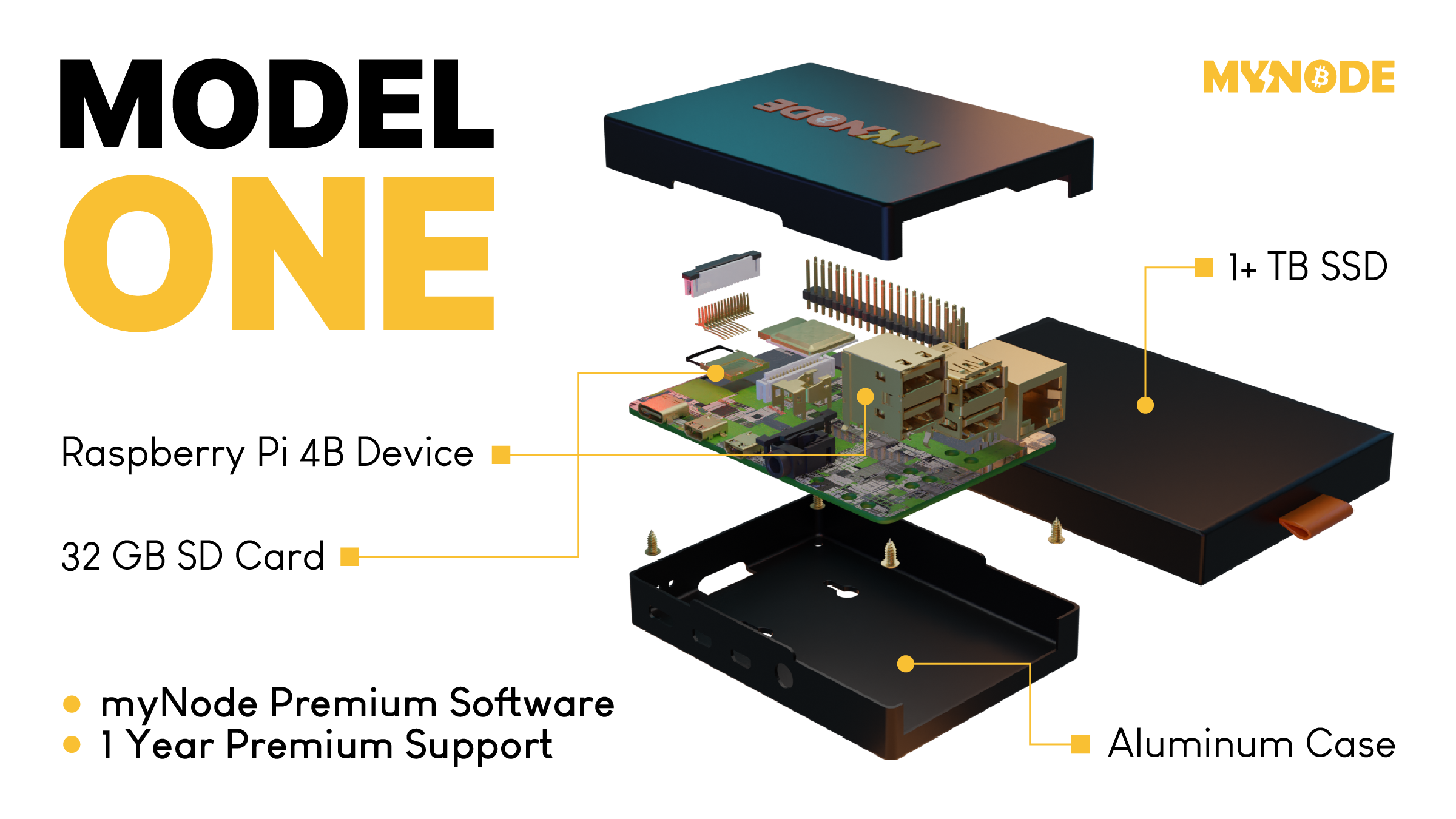 Tako izgleda Bitcoin čvor – Node
MyNode čvor vam omogućava da postanete svoja banka za samo nekoliko minuta.
Tako izgleda Bitcoin čvor – Node
MyNode čvor vam omogućava da postanete svoja banka za samo nekoliko minuta.Bitcoin ima ograničenu ponudu.
Softverski protokol otvorenog koda koji upravlja Bitcoin sistemom ograničava broj novih bitcoin-a koji se mogu stvoriti tokom vremena, sa ograničenjem od ukupno 21.000.000 bitcoin-a. S druge strane, valute koje danas koristimo imaju neograničenu ponudu. Istorija i sadašnje odluke centralnih banaka govore nam da će vlade uvek štampati sve više i više valuta, sve dok valuta ne bude bezvredna. Sve ovo štampanje uzrokuje inflaciju, što pravi štetu običnim radnim ljudima i štedišama.
Tradicionalne valute su dizajnirane tako da opadaju vremenom. Svaki put kada centralna banka kaže da cilja određenu stopu inflacije, oni ustvari kažu da žele da vaš novac svake godine izgubi određeni procenat svoje vrednosti.
Bitcoin-ova ograničena ponuda znači da je on tako dizajniran da raste vremenom kako se potražnja za njim povećava.

Bitcoin putuje oko sveta za nekoliko minuta.
Svako može da pošalje bitcoin-e za nekoliko minuta širom sveta, bez obzira na granice, banke i vlade. Potrebno je manje od minuta da se transakcija pojavi na novčaniku primaoca i oko 60 minuta da se transakcija u potpunosti „obračuna“, tako da primaoc može da bude siguran da su primljeni bitcoin-i sada njegovi (6 konfirmacija bloka). Slanje drugih valuta širom sveta traje danima ili čak mesecima ako se šalju milionski iznosi, a podrazumeva i visoke naknade.
Neke vlade i novinari tvrde da ova sloboda putovanja koju pruža Bitcoin pomaže kriminalcima i teroristima. Međutim, transakciju Bitcoin-a je lakše pratiti nego većinu transakcija u dolarima ili eurima.
Bitcoin se može čuvati na “USB-u”.
Dizajn Bitcoin-a je takav da vam treba samo da čuvate privatni ključ do svojih ‘bitcoin’ adresa (poput lozinke do bankovnih računa) da biste pristupili svojim bitcoin-ima odakle god poželite. Ovaj privatni ključ možete da sačuvate na disku ili na papiru u obliku 12 ili 24 reči na engleskom jeziku. Kao rezultat toga, možete da držite Bitcoin-e vredne milione dolara u svojoj šaci.
Sve ostale valute danas možete ili da strpate u svoj dušek ili da ih poverite banci na čuvanje. Za većinu ljudi koji žive u razvijenom svetu, i koji ne osporavaju autoritet i poverenje u banku, ovo deluje sasvim dobro. Međutim, oni kojima je potrebno da pobegnu od ugnjetavačke vlade ili koji naljute pogrešne ljude, ne mogu verovati bankama. Za njih je sposobnost da nose svoju ušteđevinu bez potrebe za ogromnim koferom neprocenjiva. Čak i ako ne živite na mestu poput ovog, cena Bitcoin-a se i dalje povećava kada ih neko kome oni trebaju kupi.
Kako Bitcoin spašava svet?
Bitcoin, kao ultimativni način štednje, je cakum pakum, ali da li on pomaže u poboljšanju sveta u celini?
Kao što ćete početi da shvatate, ulazeći sve dublje i u druge sadržaje na ovoj stranici, mnogi temeljni delovi našeg današnjeg monetarnog sistema i ekonomije su duboko slomljeni. Međutim, oni koji upravljaju imaju korist od ovakvih sistema, pa se on verovatno neće promeniti bez revolucije ili mirnog svrgavanja od strane naroda. Bitcoin predstavlja novi sistem, sa nekoliko glavnih prednosti:
- Bitcoin popravlja novac, koji je milenijumima služio kao važan alat za rast i poboljšanje društva.
- Bitcoin vraća zdrav razum pozajmljivanju, uklanjanjem apsurdnih situacija poput negativnih kamatnih stopa (gde zajmitelj plaća da bi se zadužio).
- Bitcoin pokreće ulaganja u obnovljive izvore energije i poboljšava energetsku efikasnost u mreži, služeći kao „krajnji kupac“ za sve vrste energije.
Kako mogu da saznam više o Bitcoin-u?
Ovaj članak vam je dao osnovno razumevanje zašto biste trebali razmišljati o Bitcoin-u. Ako želite da saznate više, preporučujem ove resurse:
- Film Bitcoin: Kraj Novca Kakav Poznajemo
- Još uvek je rano za Bitcoin
- Zasto baš Bitcoin?
- Šta je to Bitcoin?
- The Bitcoin Whitepaper ← objavljen 2008. godine, ovo je izložio dizajn za Bitcoin.
-
 @ cae03c48:2a7d6671
2025-05-23 12:00:53
@ cae03c48:2a7d6671
2025-05-23 12:00:53Bitcoin Magazine

Not ECDSA. Not Schnorr. Meet DahLIAS.Aggregate signatures aren’t new. They’ve been around since the early 2000s. But building one that actually works in Bitcoin’s security model, with Bitcoin’s elliptic curve, has never been proven. Developers speculated it might be possible. They shared hand-wavy sketches and said, “maybe it’d work like MuSig2, but across transaction inputs.” The idea lingered for years as developer folklore, close, never provably confirmed.
That changed recently, when Jonas Nick and Tim Ruffing of Blockstream Research, together with Yannick Seurin of Ledger, published a paper that turned this cryptographic ghost story into a concrete, provable result. DahLIAS is the first formal, secure construction of a full constant-size aggregate signature (CISA) scheme that works on Bitcoin’s native curve!
But that’s a lot of words, so let’s break that down:
- Full aggregation: Multiple signatures across different inputs are combined into one — and the result is a 64 byte signature whose size stays constant, no matter how many signers or inputs.
- Cross-input: Each signer can authorize different inputs, and all combine into one signature.
It adds no significant new assumptions beyond those already relied on by Bitcoin. DahLIAS builds a new cryptographic primitive using the same math Bitcoin already relies on, unlocking an entirely new kind of signature.
Let’s Talk About Curves and Signatures
Digital signatures are how Bitcoin proves that a user has authorized a transaction. When you go to spend bitcoin, your wallet uses a private key to sign a message, and the network verifies that signature using the matching public key.
Bitcoin uses the secp256k1 curve. It is fast, efficient, and has been battle-tested over time. It supports signature schemes like ECDSA (Bitcoin’s original signature algorithm) and Schnorr (added through Taproot in 2021), which are currently the only signature schemes permitted by Bitcoin consensus.
Traditionally, full signature aggregation relied on mathematical operations not supported by Bitcoin’s curve, secp256k1, which made it seem out of reach. These features have typically relied on other types of elliptic curves. For example, BLS (Boneh–Lynn–Shacham) signatures use a special kind of curve called a pairing-friendly curve, which enables advanced operations like combining many signatures, even on different messages, into one.
The problem is that BLS signatures do not work on secp256k1. While Schnorr was a natural upgrade from ECDSA, since both rely on the same kind of elliptic curve, adding BLS would be a much bigger leap and a departure from Bitcoin’s existing security model. Though technically possible, it would introduce new cryptographic assumptions and add significant complexity to the protocol. Supporting a curve that is pairing-friendly, like BLS12-381, would be a major change for Bitcoin.
This is part of why full signature aggregation has never been done on secp256k1.
Until now.
What Aggregate Signatures Actually Do
Most Bitcoin users are familiar with multisignatures. In a multisig wallet, multiple people jointly authorize the spending of a single UTXO or some specific “coin”. Everyone signs the same input data. This setup is useful for things like shared custody wallets.
Aggregate signatures work differently. Instead of multiple people signing the same input or coin, each signer authorizes a different UTXO in a transaction. These separate signatures are then compressed into one compact proof. With DahLIAS, that means a single 64-byte signature on Bitcoin’s secp256k1 curve that verifies all inputs at once.
That means if you have five inputs from five different people, the transaction needs five different signatures. With an aggregate signature, all of those can be bundled into one. Even if each signer is spending a different input and signing a different part of the transaction, the result is one signature that proves the entire transaction was properly authorized.
It’s like zipping a whole list of approvals into one file. The signature is compact, but still verifiably proves that each signer authorized their specific UTXO.
Instead of verifying 10 separate signatures, you verify one.
This helps realign incentives for privacy. By reducing the signature overhead to a single 64-byte proof, DahLIAS lowers the cost of combining inputs in CoinJoins, making it financially smarter to choose privacy than to go without it.
Why Half-Aggregation Got Close
Shortly after Schnorr signatures were introduced on Bitcoin, developers explored half-aggregation, as a way to compress multiple signatures but they were not fixed size. Each input contributes to the size of the signature, so the transaction still grows with every participant. DahLIAS fixes this by enabling full-aggregation across inputs and signers. No matter how many people are involved or what they’re signing, all their signatures compress into one constant-size, 64-byte proof.
What DahLIAS Actually Unlocks
The main benefit here is that DahLIAS are reducing the size of complex transactions.
DahLIAS uses a two-round interactive signing process. It’s similar to MuSig2 in that regard, but it isn’t a multisignature protocol because it doesn’t require all participants to co-sign the same message. Instead, it aggregates different signatures on different messages across the transaction.
DahLIAS is also faster to verify than checking each signature individually, up to twice as fast in some cases. Lower verification costs make it easier for more people to run full nodes, which helps preserve Bitcoin’s decentralization over time.
Importantly, DahLIAS comes with strong cryptographic guarantees. The scheme includes formal security proofs. Earlier ‘folklore’ approaches to full signature aggregation lacked this, and some were even later shown to be insecure. Fortunately they weren’t adopted prematurely.
It’s worth repeating: DahLIAS is not a multisig protocol. It isn’t comparable to MuSig2 or FROST from a functional standpoint, even if it shares similar cryptographic building blocks. It serves a different purpose. It offers a new way to encode many independent approvals into one clean, verifiable package.
Future Directions
You might think: if DahLIAS is so powerful, why isn’t it a BIP? Why not propose it for Bitcoin consensus?
DahLIAS signatures don’t look like Schnorr or ECDSA signatures. The verification algorithm is different. Instead of taking a single public key, message, and signature, a DahLIAS verifier takes lists of public keys and messages, and a single 64-byte proof.
This makes DahLIAS incompatible with Bitcoin’s current consensus rules. Supporting it at the base layer would require a consensus change. This paper doesn’t propose that change, but it does something equally important.
This paper shows that a full signature aggregation scheme for Bitcoin’s native curve is possible.
That alone is a major step forward.
To make DahLIAS part of Bitcoin, someone would need to write a Bitcoin Improvement Proposal (BIP), maybe even using secp256k1lab. That means specifying the scheme in detail, considering its implications for consensus and implementation, and building community support. This paper lays the cryptographic foundation for that conversation.
The real value of the DahLIAS paper is what it proves. Full signature aggregation on secp256k1 is not just a thought experiment. It’s concrete. It’s efficient. It’s secure. For years, the idea lived in developer folklore. Now, it’s written down, analyzed, and proven. All that’s left is to bring it to Bitcoin—if we want it.
This is a guest post by Kiara Bickers. Opinions expressed are entirely their own and do not necessarily reflect those of BTC Inc or Bitcoin Magazine.
This post Not ECDSA. Not Schnorr. Meet DahLIAS. first appeared on Bitcoin Magazine and is written by Kiara Bickers.
-
 @ cae03c48:2a7d6671
2025-05-23 12:00:52
@ cae03c48:2a7d6671
2025-05-23 12:00:52Bitcoin Magazine
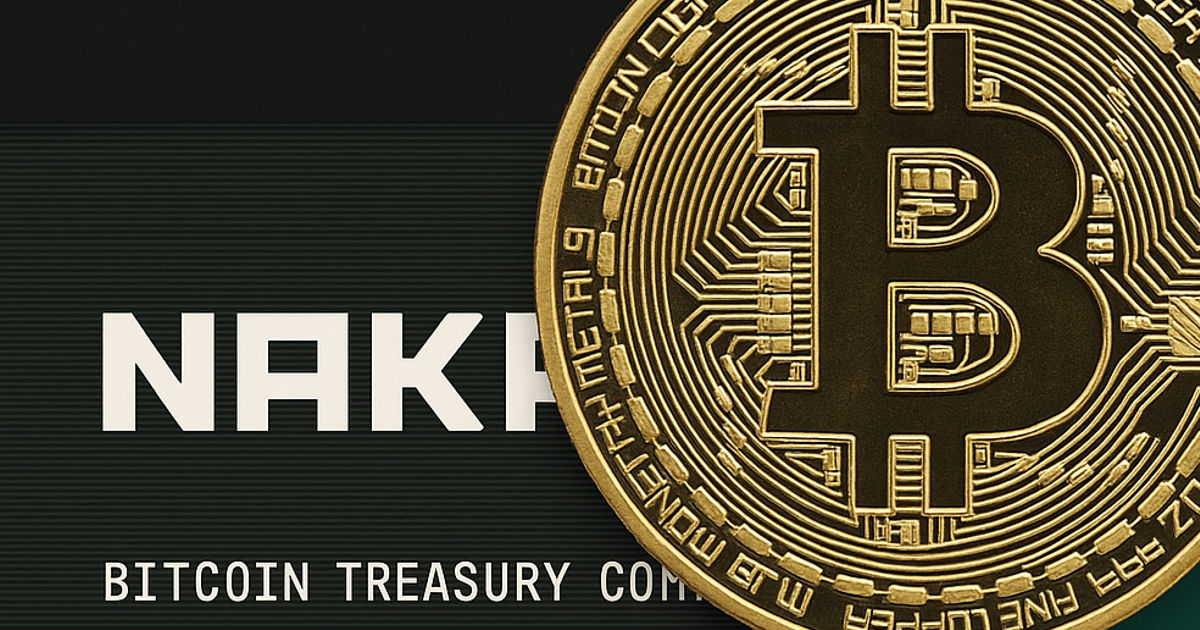
KindlyMD, Nakamoto, and Anchorage Digital Form Strategic Bitcoin Treasury AllianceNakamoto Holdings Inc., KindlyMD, Inc., and Anchorage Digital today announced a strategic partnership that will see Anchorage become a trading partner for KindlyMD’s Bitcoin treasury. The partnership will officially take effect upon the close of KindlyMD’s merger with Nakamoto, expected in Q3 2025.
NEW! Anchorage Digital
 @Nakamoto @KindlyMD
@Nakamoto @KindlyMD Today we’re thrilled to announce a strategic partnership with Nakamoto Holdings and $KDLY to accelerate the future of corporate Bitcoin adoption. pic.twitter.com/nQueTyutQH
— Anchorage Digital
 (@Anchorage) May 21, 2025
(@Anchorage) May 21, 2025Anchorage Digital, a U.S. federally chartered digital asset bank, will provide institutional-grade custody, 24/7 trading, and deep liquidity to support the Bitcoin strategy of the combined entity.
“In the not-so-distant-future, the omission of Bitcoin on a balance sheet will be more glaring than its inclusion,” said Nathan McCauley, CEO and Co-Founder of Anchorage Digital. “Until then, companies like Nakamoto-KindlyMD are pioneering a new path forward—one in which Bitcoin is at the heart of corporate strategy.”
The future of corporate treasury strategy is Bitcoin-native. We're here to make it happen. Pumped to be partnering with @Nakamoto and @KindlyMD.@DavidFBailey’s vision continues to open new doors.
— Nathan McCauley
 (@nathanmccauley) May 21, 2025
(@nathanmccauley) May 21, 2025The merger between KindlyMD and Nakamoto is backed by approximately $710 million in financing, including $510 million in PIPE funding—the largest ever PIPE for a public crypto-related deal. The goal is to establish a Bitcoin-native corporate treasury strategy that redefines how capital markets engage with digital assets.
“Our goal is to bring Bitcoin to the center of global capital markets within a compliant, transparent structure,” said David Bailey, Founder and CEO of Nakamoto Holdings Inc. “We are excited to partner with Anchorage Digital to implement our vision with the highest levels of security and battle-tested infrastructure and enable us to deliver sustained value to shareholders.”
This announcement follows a key milestone on May 18, when KindlyMD shareholders approved the proposed merger with Nakamoto. The transaction is now expected to close in Q3 2025, pending SEC review and information statement distribution.
“This milestone brings us one step closer to unlocking Bitcoin’s potential for KindlyMD shareholders,” Bailey said yesterday. “We are grateful that KindlyMD shares our vision for a future in which Bitcoin is a core part of the corporate balance sheet.”
With its Bitcoin-first strategy and strategic alliances, the Nakamoto-KindlyMD partnership is set to accelerate institutional Bitcoin adoption—and with Anchorage Digital’s infrastructure behind it, the foundation is now firmly in place.
“By collaborating with Anchorage Digital, we are implementing our Bitcoin treasury strategy with the utmost standards in safety and security for our shareholders,” stated Tim Pickett, CEO of KindlyMD. “Their institutional-grade platform allows us to confidently hold Bitcoin as a treasury asset as we look to unlock access to Bitcoin and drive value for the long term.”
Disclosure: Nakamoto is in partnership with Bitcoin Magazine’s parent company BTC Inc to build the first global network of Bitcoin treasury companies, where BTC Inc provides certain marketing services to Nakamoto. More information on this can be found here.
This post KindlyMD, Nakamoto, and Anchorage Digital Form Strategic Bitcoin Treasury Alliance first appeared on Bitcoin Magazine and is written by Jenna Montgomery.
-
 @ cae03c48:2a7d6671
2025-05-23 12:00:51
@ cae03c48:2a7d6671
2025-05-23 12:00:51Bitcoin Magazine
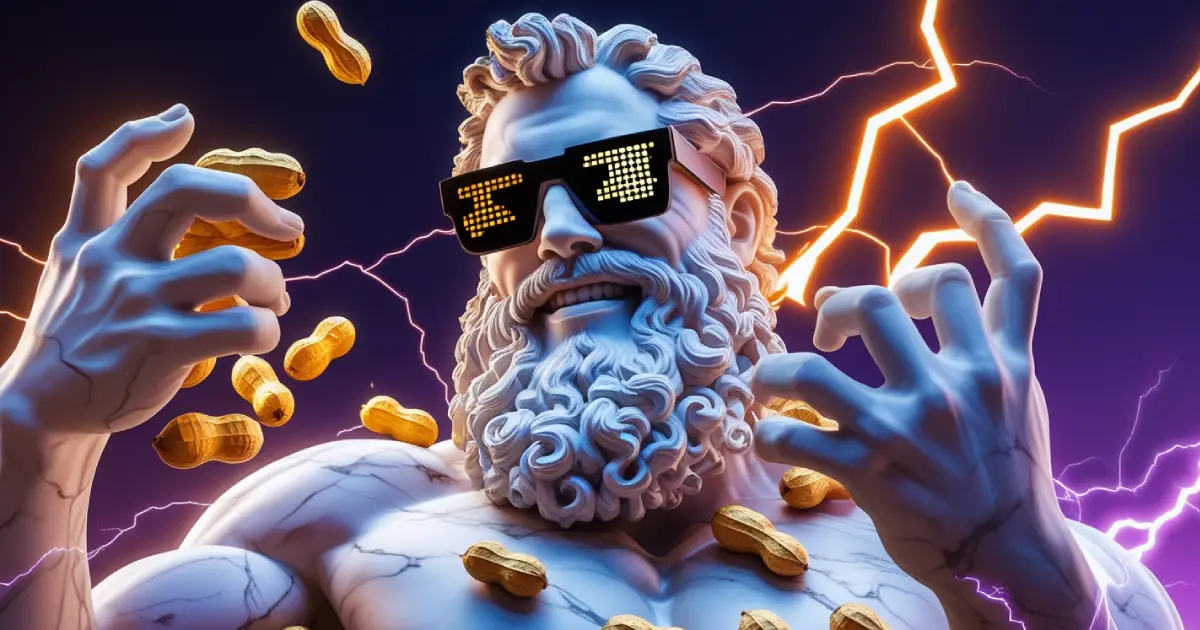
How Zeus is Redefining Bitcoin with Cashu Ecash IntegrationThe U.S.-based Bitcoin and Lightning mobile wallet Zeus recently announced an alpha-release integration of Cashu. The move marks the first integration of ecash into a popular Bitcoin wallet, breaking new ground for potential user adoption to Bitcoin.
Cashu is a hot new implementation of Chaumian ecash, a form of digital cash invented by David Chaum in the ’90s that has incredible privacy and scalability properties, with the trade-off of being fundamentally centralized, requiring a significant amount of trust in the issuer.


In a counterintuitive move for Zeus, known as the go-to tool for advanced Lightning users seeking to connect to their home nodes, the integration of Cashu acknowledges a “last mile” challenge Lightning wallets face when delivering Bitcoin to the masses.
“We basically started off as the cypherpunk wallet, right? You got to set up your own Lightning node and connect to it with Zeus. The last two years, we put the node in the phone with one click, you can run it all in a standalone app without a remote node,” Evan Kaloudis, founder and CEO of Zeus, told Bitcoin Magazine.
“Cashu addresses uneconomical self-custody for small bitcoin amounts. On-chain, the dust limit is 546 satoshis, and Layer Two systems like Lightning have costs for channel setup or unilateral exits that aren’t widely discussed,” Evan explained, highlighting a major point of friction in noncustodial Lightning wallets: the need for liquidity and channel management. While these esoteric aspects of the Lightning Network have been mostly abstracted away since its invention in 2016, these fundamental trade-offs continue to manifest even in the most sophisticated and user-friendly wallets.
In the case of both Phoenix and Zeus, two of the most popular noncustodial options in the market, users must pay up to 10,000 sats upfront to gain spending capacity. These fees are necessary to cover the on-chain fees spent to open a channel for the user against the wallet’s liquidity service provider, unlocking a noncustodial experience.
The required up-front fee is difficult to explain and represents a painful onboarding experience for new users who are used to fiat apps giving them money to join instead. The result is the proliferation of custodial Lightning wallets like Wallet of Satoshi (WOS), which gained massive adoption early on by leveraging the global, near-instant settlement power of Bitcoin combined with the excellent user experience centralized wallets can create.
Major developments have been made over seven years after the Lightning Network’s inception, however, and Zeus is pushing the boundaries.
“With Ecash, we make it so easy that anyone can set up a wallet and start participating in our ecosystem, which I really think is going to become more and more prevalent,” Evan explained.
Today, at roughly $100,000 per bitcoin, 1,000 satoshis are equivalent to $1. Transactions of these sizes are known as microtransactions — a popular example are Nostr social media tips known as Zaps. But finding the right tool for this use case is not simple. Self custodied wallets like Phoenix charge transaction fees in the hundreds of satoshis, even with open channels, and on-chain fees often cost the same and are slower to settle. As a result, there’s an entire category of spending that is only served by cheaper alternatives such as custodial lightning wallets like WOS or Blink, but result in significant privacy tradeoffs, often requiring phone numbers from users and in some cases more advanced KYC and IP tracking. Cashu hopes to serve this market with lower privacy costs, the same ease of use, speed and competitive fees.
Digging deeper into the Cashu integration, Evan explained that “for users this means being able to pick and switch between custodians in a single app. For developers this means being able to defer custodial responsibilities to third parties and not have to wire up a new integration when your current custodian halts operations.”
Zaps are satoshi-denominated rewards delivered as “likes” or micro-tips for content in the Nostr social media ecosystem. A Zap can be as small as one satoshi, the smallest amount of bitcoin that can be technically transferred, equivalent today to about a tenth of a penny. “But I think if we look at Nostr and you’re seeing how many people are Zapping and how big a part of that ecosystem it is. It’s like, people are willing to do it,” Evan explained.
“Cashu, while custodial, lets users accumulate small amounts — say, via Nostr Zaps — without needing 6,000 satoshis to open a Lightning channel. Zeus prompts users to upgrade to self-custody as their balance grows,” he concluded, explaining that the wallet will effectively annoy users into self custody, one of several design choices made to mitigate the risks introduced by Cashu.
Ecash
The trade-offs introduced by Cashu challenge the common understanding of custody as an either-or in Bitcoin. Historically you were either a centralized — custodial — exchange, or you were a noncustodial Bitcoin wallet. In the former, you entrust the coins to a third party; in the latter you take personal responsibility for those coins and their corresponding private keys. Cashu changes this paradigm by introducing bitcoin-denominated ecash notes or “nuts,” which are bearer instruments that should be backed by a full bitcoin reserve and Lightning interoperability for instant withdraw.
Similar to fiat cash, you must take control and responsibility over these notes, but there’s also counterparty risk. In the case of Cashu, there are certain things the issuing mint can theoretically do to exploit their users — akin to how a bank can run on a fractional reserve.
The big difference between Cashu or custodial Bitcoin exchanges and fiat currency is that Cashu is open source, is designed around user privacy, and scales very well. It makes the cost of running a mint lower than either alternative, a feature that makes mint competition easier, in theory countering the centralizing network effects of specific mints.
Finally, the user experience of storing Cashu tokens has been attached to known forms of Bitcoin self custody such as the download of 12-words seeds via various mechanisms, though implementations still vary from wallet to wallet and the whole ecosystem is in its early stages.
To further mitigate the custodial risk of Chaumian-style ecash in Bitcoin, the Cashu community has developed various methods for automatically managing custody risk.



“Users can split risk by using multiple mints, switching between them in the user interface. Soon, ZEUS will guide users to select five or six reputable mints, automatically balancing funds to minimize exposure,” Evan explained, referring to a particular approach called automated bank runs. The idea is that as some Cashu mints may hold more of your funds, Zeus de-ranks them and rotates value out to minimize risk.
“I think the idea is going to be that we guide users to pick five or six reputable mints… And from there, users will be able to have the wallet automatically switch between those mints and determine which mint should be receiving the balance depending on the balance of all the mints presently. So you’ll be like, OK. MiniBits has way too much money. Let’s switch the default to one of the mints that doesn’t have a lot. So that way you can sort of mitigate or rather distribute the rug risk there,” Evan explained, adding, “Our Discover Mint feature pulls reviews from bitcoinmints.com, showing vouch counts and user feedback, like mint reliability or longevity,” describing the reputation layer stacked on top of the various other risk management mechanisms.
There is no known way to use Chaumian-style ecash in an entirely noncustodial way. So as long as the custody risk can be minimized, the scaling and privacy upside becomes remarkable.
Microtransactions
One of the opportunities that ecash unlocks is microtransactions, the most popular example of which are Nostr Zaps often in single dollar ranges of value transferred, though it applies to small Lightning transactions as well. This use case triggers an important technical question that predates Bitcoin, do microtransactions actually make economic sense?
There’s a long-standing argu
-
 @ cae03c48:2a7d6671
2025-05-23 12:00:50
@ cae03c48:2a7d6671
2025-05-23 12:00:50Bitcoin Magazine
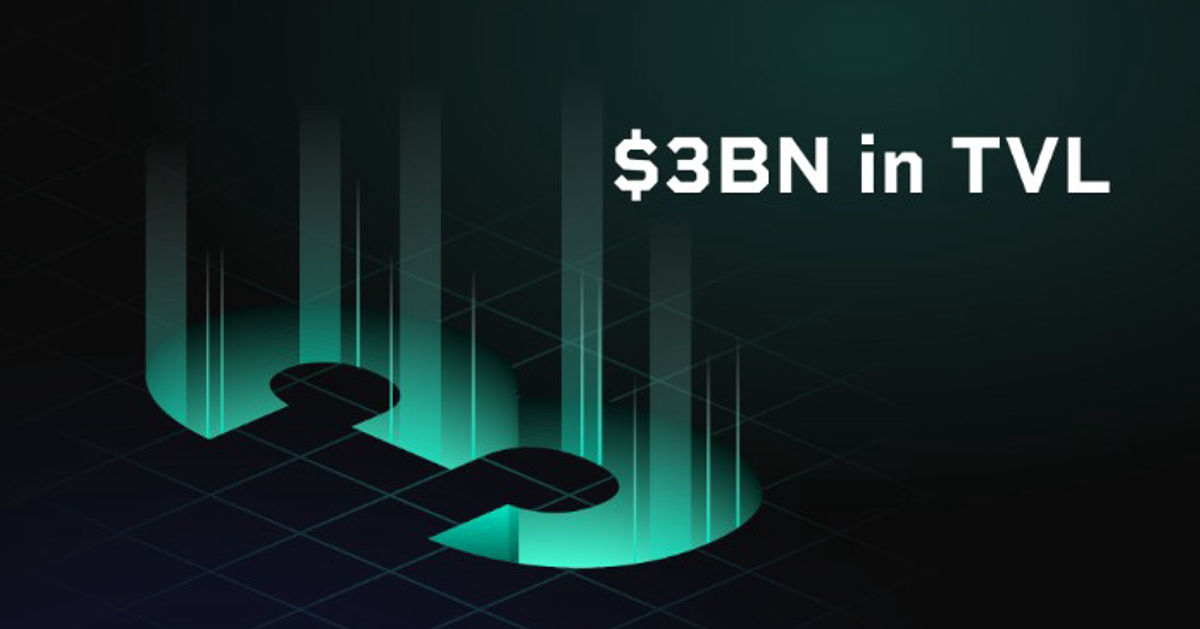
Bitcoin Liquid Network Surpasses $3.27 Billion in Total Value LockedToday, the Liquid Federation has announced that the Liquid Network has surpassed $3.27 billion in total value locked (TVL), according to a press release shared with Bitcoin Magazine.
“Surpassing the $3 billion threshold marks a pivotal moment for both Liquid and Bitcoin, signaling the evolution of Bitcoinʼs ecosystem into a full-fledged platform for global financial markets,” said the CEO and Co-Founder of Blockstream Dr. Adam Back. “As Bitcoin gains mainstream acceptance, and demand for regulated asset tokenization accelerates, Liquid is better positioned than ever to bridge Bitcoin with traditional finance and drive the next wave of capital markets innovation.”
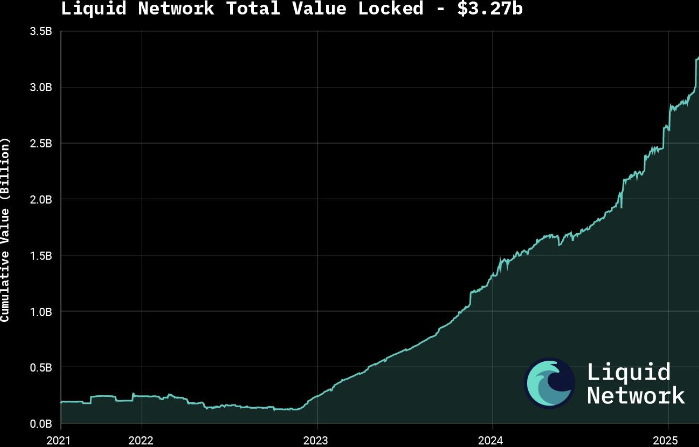
The announcement follows growing interest in tokenizing real-world assets (RWAs), with major moves such as BlackRock’s decision to tokenize a $150 billion Treasury fund. According to a 2025 report by Security Token Market, the tokenized asset market is projected to grow to $30 trillion by 2030.
Liquid supports over $1.8 billion in tokenized private credit and offers products like U.S. Treasury notes and digital currencies through Blockstream’s AMP platform. The network also features fast, low-cost, and confidential transactions, with support for atomic swaps and robust smart contracts.
Governed by over 80 global institutions, Liquid was launched in 2018 as Bitcoin’s first sidechain. It is now preparing for a major upgrade with the mainnet release of Simplicity, aimed at expanding its smart contract capabilities.
To keep up with increasing demand, the Liquid Federation is boosting developer resources and technical onboardings, along with integrations with exchanges, custodians and service providers. Recent bootcamps and important meetings with policy makers in Asia, Europe and Latin America reflect the network’s growing global presence.
This post Bitcoin Liquid Network Surpasses $3.27 Billion in Total Value Locked first appeared on Bitcoin Magazine and is written by Oscar Zarraga Perez.
-
 @ bf47c19e:c3d2573b
2025-05-22 21:03:52
@ bf47c19e:c3d2573b
2025-05-22 21:03:52Originalni tekst na bitcoin-balkan.com.
Pregled sadržaja
- Šta je finansijski samo-suverenitet?
- Zašto smo prestali da koristimo zlatni standard?
- Šta fali tradicionalnoj valuti i centralnim bankama?
- Kako mogu ljudi da mi ukradu novac ako je u banci?
- Kako ljudi koriste moje finansijske podatke protiv mene?
- Kako ljudi kontrolišu sa kim obavljam transakcije?
- Kako da povratimo svoj finansijski samo-suverenitet?
- Kako Bitcoin funkcioniše?
- Pa onda, zašto Bitcoin?
- Po čemu je Bitcoin bolji od sistema tradicionalnih valuta?
- Kako Bitcoin štiti od Inflacije?
- Kako Bitcoin štiti od Zaplene?
- Kako Bitcoin štiti Privatnost?
- Kako Bitcoin štiti od Cenzure?
- Šta će vlada i banke učiniti sa Bitcoin-om?
- Da li je vrednost Bitcoin-a nestabilna?
- Da li je Bitcoin novac?
- Bitcoin kao Zaliha Vrednosti
- Bitcoin kao Sredstvo Razmene
- Bitcoin kao Obračunska Jedinica
- Bitcoin kao Sistem Kontrole
- Šta je sa „Sledećim Bitcoin-om“?
- Na kraju
Kratki uvod u bezbednost, privatnost i slobodu vašeg novca.
Pre nego što saznate kako morate znati zašto.
Šta je finansijski samo-suverenitet?
Zamislite da u ruci imate zlatni novčić, jedan od najjednostavnijih i najčistijih oblika finansijskog samo-suvereniteta.
Da biste držali taj zlatni novčić, ne morate da se složite sa bilo kojim Uslovima korišćenja ili Politikom privatnosti, da se pridržavate bilo kojih KYC ili AML propisa, da pokažete ličnu kartu, da navedete svoje ime ili jedinstveni matični broj.
Samo ga držite u ruci i njime možete platiti bilo šta, davanjem tog novčića nekom drugom da ga drži u ruci. To je čista sloboda.
Pored slobode onoga što kupujete svojim novčićem, niko ne može magično znati kome plaćate ili koju robu/usluge kupujete tim zlatni novčićem, jer vaša privatnost nije ugrožena sa zlatom.
A pošto imate svoju privatnost, niko ne može znati za vaše transakcije, pa niko ne može da odluči da ograniči ili kontroliše za šta koristite taj zlatni novčić.
Hiljadama godina zlato je bilo globalni standard novca.
Svi su održavali svoj finansijski samo-suverenitet, a privatnost i sloboda svačijeg novca su poštovani.
Zaista je bilo tako jednostavno.
Zašto smo prestali da koristimo zlatni standard?
Trenutni globalni bankarski sistem i sistem tradicionalnih valuta, bankari su vrlo polako implementirali u proteklih 100+ godina.
Udružili su se sa svetskim vladama koje su svima oduzele zlato pod pretnjom nasilja.
Na primer, nakon što je Federalna banka rezervi osnovana u SAD-u 1913. godine, američka vlada je nasilno oduzela svo zlato 1933. godine, prisiljavajući sve da koriste nove centralne banke i sistem novčanica Federalnih rezervi.
 „Dostavite svoje celokupno zlato u naše sefove u zamenu za bezvredni papir, ili ćemo upotrebiti silu nad vama.“
„Dostavite svoje celokupno zlato u naše sefove u zamenu za bezvredni papir, ili ćemo upotrebiti silu nad vama.“Banke su u početku zamenile zlatni standard papirnim priznanicama zvane zlatni sertifikati, ali nakon što je prošlo dovoljno vremena, banke su u osnovi jednostavno prestale da ih otkupljuju za zlato.
Zlatni sertifikati izdavani od banaka (novčanice ili „gotovina“) u tom trenutku bili su samo bezvredni papir, ali zbog vladine pretnje nasiljem, svi su bili primorani da nastave da koriste novčanice Federalnih rezervi.
Od skora, banke koriste digitalnu bazu podataka, u kojoj doslovno mogu stvoriti novac ni iz čega, čak i da ga ne moraju štampati na papiru.
Predsednik Federalnih rezervi priča kako oni „štampaju“ novac.
Oni su učvrstili svoju moć da manipulišu i naduvaju globalnu novčanu masu, nadgledaju finansijske transakcije svih i kontrolišu protok svih tradicionalnih valuta u svom bankarskom sistemu.
Banke sada kontrolišu sve.
Jednom kada su centralni bankari uspešno preuzeli kontrolu nad novčanom masom u svetu, zajedno sa sposobnošću svih da slobodno vrše transakcije i trguju, svet je kolektivno izgubio bezbednost, slobodu i privatnost svog novca.
Šta fali tradicionalnoj valuti i centralnim bankama?
Nakon impelentacije trenutnog globalnog bankarskog sistema i sistema tradicionalnih valuta, svetu nije preostao drugi izbor nego da veruje bankarima i političarima da vode globalni finansijski sistem na pošten način.
„Koren problema tradicionalne valute je potpuno poverenje potrebno za njeno funkcionisanje. Centralnoj banci se mora verovati da neće devalvirati valutu, ali istorija tradicionalnih valuta je puna kršenja tog poverenja. Bankama se mora verovati da čuvaju naš novac i prenose ga elektronskim putem, ali ga daju u talasima kreditnih balona sa malim delićem rezerve. ““ — Satoshi Nakamoto
Istorija zloupotrebe tradicionalnih valuta može se grupisati u 3 kategorije:
• Bezbednost. Loši ljudi kradu vaš novac ili vrednost vašeg novca, ponekad na očigledne načine, ponekad na podle načine.
• Privatnost. Loši ljudi nadgledaju sve vaše privatne finansijske transakcije, i koriste vaše lične finansijske podatke protiv vas.
• Sloboda. Loši ljudi kontrolišu na koji način možete da trošite sopstveni novac, sa kim možete da obavljate transakcije, koliko možete da potrošite itd.
Kako mogu ljudi da mi ukradu novac ako je u banci?
Evo nekoliko primera:
-
Krađa inflacijom: Ovo je primarni način na koji banke kradu vaš novac i jedan od najpodlijih. Kada centralne banke izdaju novi novac, bilo štampanjem na bezvrednom papiru, ili samo dodavanjem knjigovodstvenog unosa u bazu podataka koju kontrolišu, one naduvaju globalnu novčanu masu. Inflacija krade kupovnu moć svih koji drže deo te valute, jednostavno zato što je sada više te valute u opticaju. Zlato se ne može stvoriti, pa su bankari umesto toga izmislili sistem papirnog novca.
-
Krađa zaplenom: Ovo je jedan od načina na koji vlade mogu ukrasti vaš novac. Da li ste ikada čuli za zaplenu imovine? Ako policajac posumnja da je vaša imovina korišćena u krivičnom delu, može je zapleniti, a vi se morate boriti da biste povratili vašu ukradenu imovinu. Ili, drugi primer: Pokušajte da uđete u zemlju sa više od 10.000 USD u džepu, a ne da je prijavite, i pogledajte šta će se dogoditi. Sve je isto: krađa od strane drugih ljudi sa oružjem.
-
Krađa putem oporezivanja: Ovo je još jedan način na koji vam vlade kradu novac. Ne sporim da li je oporezivanje etično ili ne, samo konstatujem činjenicu da vaša vlada može da primora vašu banku da im da vaš novac, a ovo je bezbednostna ranjivost. Da bi novac bio siguran, mora biti nezaplenjiv, a vlade mogu da zaplene vaše bankovne račune.
Kako ljudi koriste moje finansijske podatke protiv mene?
Ako fizičku tradicionalnu valutu predate drugoj osobi, u obliku papirnog novca ili kovanica, relativno je lako zaštititi privatnost svoje transakcije, baš kao što bi bilo da koristite zlatnike.
Međutim, ako koristite kreditne kartice, debitne kartice, bankovne transfere, PayPal, Venmo, LINE Pay, WeChat Pay ili bilo koju drugu mrežu za plaćanje koja je centralno kontrolisana, aktivno pristajete da se odreknete privatnosti podataka svih svojih privatnih finansijskih transakcija i sve ih dajete poverljivoj trećoj strani.
Kada su svi podaci i metapodaci vaših finansijskih transakcija prijavljeni u centralnu bazu podataka, onaj ko ima pristup toj bazi podataka može da koristi vaše podatke protiv vas.
Evo nekoliko osnovnih primera:
- Ako ste kupili robu rizičnog životnog stila poput cigareta, banka može reći vašoj osiguravajućoj kompaniji da poveća vaše osiguranje.
- Ako ste kupili nešto što je ilegalno, poput droga za rekreaciju, vaša banka može reći vašoj vladi da vas zakonski goni.
Ali u slučaju nekih represivnih vlada, oni su to odveli do ekstrema. Oni centralno prikupljaju sve finansijske transakcije i druge podatke svih svojih građana i stvorili su totalitarni Sistem Socijalnih Bodova (eng. Social Credit Score):
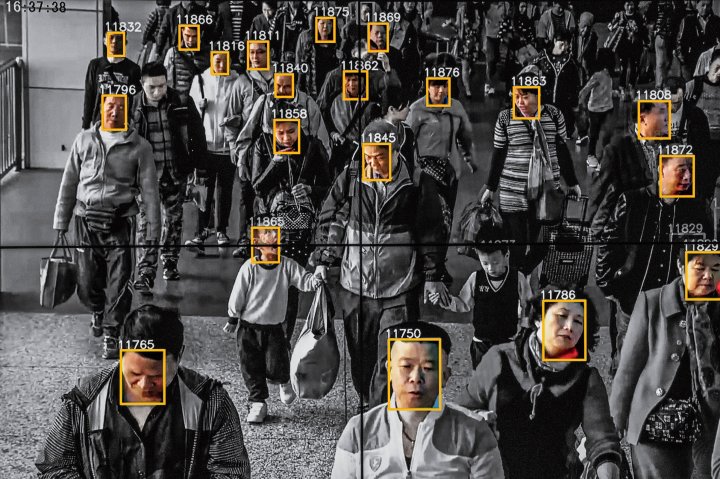 Prepoznavanje lica je jedan od elemenata kineskih napora za praćenje
Prepoznavanje lica je jedan od elemenata kineskih napora za praćenjeZapisi George Orwell-a već su postali stvarnost u Kini zbog sistema tradicionalnih valuta centralne banke i platnih mreža koje su izgrađene na njemu.
Ako mislite da se to neće dogoditi u vašoj zemlji, razmislite ponovo.
To se dešava vrlo polako, ali na kraju će sve svetske vlade primeniti Sistem Socijalnih Bodova, dok je Kina to tek prva učinila.
Kako ljudi kontrolišu sa kim obavljam transakcije?
U prvom primeru sa zlatnim novčićem, kada ga predate nekom drugom kao plaćanje za robu ili uslugu, ne postoji centralizovana evidencija vaše platne transakcije i imate savršenu privatnost.
Međutim, u centralnom bankarskom sistemu, budući da banka ima i znanje o podacima o vašim transakcijama i moć da kontroliše vaša sredstva, oni mogu proceniti niz pravila da bi odlučili da li žele da dozvole vašu transakciju ili da to odbiju, takođe kao i izvršenje te odluke kontrolišući vaša sredstva.
Tako su vlade naoružale tradicionalne valute i centralni bankarski sistem kao Sistem Kontrole nad svojim građanima.
Da rezimiramo: Pošto ste se odrekli bezbednosti i privatnosti svog novca, izgubili ste i svoju finansijsku slobodu.
“Privatnost nije o tome da nešto treba sakriti. Privatnost je o tome da nešto treba zaštititi.” — Edward Snowden
Kako da povratimo svoj finansijski samo-suverenitet?
Pokret Cypherpunk pokrenuli su pojedinci koji su shvatili važnost zaštite privatnosti i slobode pojedinačnih korisnika na Internetu.
Cypherpunk-ovi su verovali da se gore opisani problemi mogu rešiti samo potpuno novim novčanim sistemom, koji poštuje i štiti bezbednost, privatnost i slobodu pojedinca.
Mnogi od Cypherpunk-era pokušali su da izgrade nove etičke sisteme e-gotovine koji bi mogli da zamene tradicionalne valute i centralno bankarstvo.
Bilo je mnogo teških računarskih problema koje je trebalo prevazići u stvaranju tako istinski decentralizovanog sistema, i ako su neki od njih bili blizu cilja, svi su propali.
Odnosno, sve dok jedan pseudonim Cypherpunk-a to konačno nije shvatio 2008. godine: kombinacijom digitalnih potpisa, distribuirane knjige i peer-to-peer mreže, rođen je Bitcoin.
Kako Bitcoin funkcioniše?
Baš kao što ne treba da znate kako Internet funkcioniše da bi gledali slike mačaka na Internetu, razumevanje tehničke složenosti načina na koji Bitcoin radi „ispod haube“ nije neophodno da biste ga koristili i postigli sopstveni finansijski samo-suverenitet.
Važna stvar koju želim da saznate iz ovog članka je da iako većina novih tehnologija u početku ima loše korisničko iskustvo, Bitcoin svesno i vrlo namerno ne žrtvuje svoje osnovne filozofske principe da bi brže pridobio nove korisnike, ili da bi poboljšao korisničko iskustvo.
Najpametniji Cypherpunk-ovi rade na poboljšanju korisničkog iskustva.
Tehnologija će se sa vremenom poboljšavati, baš kao i za Internet.
Pa onda, zašto Bitcoin?
Reći ću vam zašto:
Jer Bitcoin poštuje bezbednost, privatnost i slobodu pojedinca.
Po čemu je Bitcoin bolji od sistema tradicionalnih valuta?
Za početak, Bitcoin nema Uslove korišćenja, Politiku privatnosti i Propise o usklađenosti sa KYC/AML. (Know Your Costumer & Anti-money Laundering)
Bitcoin je uspešan primer implementacije kripto-anarhije, gde su jedina pravila kriptografija, matematika i jak skup konsenzusnih pravila.
To je distribuirani i nepoverljivi sistem zasnovan na finansijskim podsticajima i nijedna osoba ili centralizovani entitet ne može da kontroliše Bitcoin.
Ono što je najvažnije, Bitcoin vam omogućava da odustanete od tradicionalnih valuta, sistema delimičnih rezervi i centralnog bankarstva rešavanjem osnovnih problema poverenja:
- Sigurnost od inflacije korišćenjem fiksnog snabdevanja
- Sigurnost od zaplene korišćenjem ključeva za kontrolu sredstava
- Privatnost plaćanja korišćenjem pseudonimnih identiteta
- Sloboda protiv cenzure korišćenjem peer to peer mreže
Kako Bitcoin štiti od Inflacije?
Jedno od najkritičnijih pravila konsenzusa o Bitcoin-u je da može postojati najviše 21,000,000 Bitcoin-a.
Nakon izdavanja svih Bitcoin-a, nikada više ne može doći do stvaranja novih Bitcoin-a.
Stoga je Bitcoin deflaciona valuta, koja sprečava ljude da ukradu vaš novac ili njegovu vrednost naduvavanjem novčane mase.
 Monetarna Inflacija Bitcoin-a
Monetarna Inflacija Bitcoin-aKako Bitcoin štiti od Zaplene?
Bitcoin se može preneti samo pomoću kriptografskog privatnog ključa koji kontroliše sredstva.
Nijedan bitcoin nikada ne izadje van sistema.
Nijedna vlada, banka ili sudski nalog ne mogu zapleniti ta sredstva.
Jednostavno ne postoji način da se takva odredba ili naredba sprovede od bilo kog „organa vlasti“, jer Bitcoin ne priznaje nijedno „ovlašćenje“ u svom sistemu.
Bitcoin je potpuno samo-suveren sistem i zbog svoje distribuirane prirode ne može se ugasiti.
Postoji zbog sopstvenih zasluga, samo zato što ljudi veruju u to.
Kako Bitcoin štiti Privatnost?
Bitcoin ne traži vaše ime ili druge detalje koji mogu lično da vas identifikuju.
Vaš identitet je kriptografski, a ne vaše stvarno ime.
Dakle, vaš identitet izgleda otprilike kao 1vizSAISbuiKsbt9d8JV8itm5ackk2TorC, a ne kao „Stefan Petrovič“.
Pored toga, niko ne zna ko kontroliše sredstva na datoj Bitcoin adresi, a nova tehnologija se neprestano razvija kako bi se poboljšala privatnost Bitcoin-a.
Kako Bitcoin štiti od Cenzure?
Peer-to-peer Bitcoin mreža je u potpunosti distribuirana.
To znači da ako jedan čvor pokuša da cenzuriše vašu transakciju, neće uspeti ukoliko * svaki * čvor(Node) ne izvrši cenzuru vaše transakcije.
Šta će vlada i banke učiniti sa Bitcoin-om?
Neke zemlje su pokušale da ga regulišu, kontrolišu, isključe itd., ali nijedna od njih nije uspela.
Čini se da uglavnom samo žele da koriste postojeći sistem centralnih banaka da bi kontrolisali kako ljudi trguju tradicionalnim valutama za Bitcoin, i naravno žele da oporezuju Bitcoin na bilo koji mogući način.
Evo nekoliko uobičajenih tvrdnji vlada i banaka o Bitcoin-u:
 Evropska centralna banka kaže da Bitcoin nije valuta i upozorava da je vrlo nestabilna.
Evropska centralna banka kaže da Bitcoin nije valuta i upozorava da je vrlo nestabilna.„Bitcoin, izgleda samo kao prevara“, rekao je gospodin Tramp. „Ne sviđa mi se jer je to još jedna valuta koja se takmiči sa dolarom.“
Da li je vrednost Bitcoin-a nestabilna?
Ako umanjite grafikon cena, videćete da Bitcoin-u neprekidno raste vrednost od kada je stvoren, trgujući sa manje od 0,01 USD i polako se penje na preko 60.000 USD na nedavnom vrhuncu početkom 2021. godine.
 Cena Bitcoina od 2011. godine
Cena Bitcoina od 2011. godineTo je zato što je njegova ponuda fiksna i ljudi cene njegovu nestašicu.
Sa većom potražnjom i fiksnom ponudom, cene vremenom rastu.
Kako godine odmiču, njegova vrednost će se povećavati kako novi korisnici počinju da drže Bitcoin. (U svetu Bitcoina držanju kažemo HODL. Drži bitcoin. Hodl bitcoin.)
Da li je Bitcoin novac?
Da biste odgovorili na pitanje da li je Bitcoin novac ili ne, prvo morate definisati pojam „novac“.
Nažalost, reč „novac“ koristimo da bismo opisali nekoliko vrlo različitih komplikovanih koncepata, koji su svi potpuno odvojeni.
Termin „novac“ se zapravo odnosi na:
- Zaliha Vrednosti (Store of Value)
- Sredstvo Razmene ( Medium of Exchange)
- Obračunska Jedinica (Unit of Account)
- Sistem Kontrole (System Control)
Bitcoin kao Zaliha Vrednosti
Ovaj tweet to savršeno objašnjava:
Sinov prijatelj: “Matt, šta će se dogoditi ako novčić od 1 funte usitnite na pola?”
Dobijaš dva komada bezvrednog metala. Ako zlatnik usitnite na pola, dobićete dva zlatnika, od kojih svaki vredi polovinu onoga što je novčić bio.
Sin: „… isto tako kao sa zlatom jeste sa bitcoinima“.
Bitcoin je potpuno deljiv i deluje kao izvrsna zaliha vrednosti, baš kao što je i zlato već hiljadama godina.
Bitcoin kao Sredstvo Razmene
Bitcoin je dobro služio kao sredstvo razmene za svoje rane korisnike.
Ali skaliranje Bitcoin-a na globalni nivo koji bi mogao da posluži svim ljudima je veliki izazov, jer se osnovna „blockchain“ tehnologija ne skalira na globalni nivo.
Da bi rešio ovaj problem skaliranja, Satoshi je izumeo koncept kanala plaćanja, a u kombinaciji sa malo pomoći drugih briljantnih računarskih naučnika Cipherpunk-a koji su poboljšali koncept tokom poslednjih 10 godina, sada imamo mrežu Lightning, koja omogućava da se Bitcoin koristi kao odlično Sredstvo Razmene, koje se vremenom može proširiti na globalni nivo.
Bitcoin kao Obračunska Jedinica
Najmanja obračunska jedinica Bitcoin-a nazvana je po njenom tvorcu, Satoshi-u.
Jedan Bitcoin je jednak 100.000.000 Satoshi-a.
Na kraju, kako se robe i usluge sve češće razmenjuju za Bitcoin, sve više ljudi će koristiti Bitcoin ili „Sats“ kao obračunsku jedinicu.
Bitcoin kao Sistem Kontrole
Budući da je Bitcoin dizajniran da poštuje i štiti ljudska prava pojedinca, posebno bezbednost, privatnost i slobodu novca; ne bi bio dobar Sistem Kontrole i ne može se koristiti za ugnjetavanje ljudi, kao što se dešava sa tradicionalnim valutama i sistemima centralnog bankarstva koji to trenutno vrlo dobro rade.
Šta je sa „Sledećim Bitcoin-om“?
Kao što može biti samo jedan „globalni“ Internet, tako može biti i samo jedan globalni novac, a stigao je i novi Bitcoin Standard.
Sve ostalo je ili direktna prevara ili gubljenje vremena.
Ako bi neko želeo da vam proda „Sledeće Zlato“, da li biste ga kupili?
Na kraju
Nadam se da vam je ovaj članak pomogao da razumete zašto je Bitcoin stvoren i kako može da pomogne svetu da se oslobodi tradicionalnih valuta i sistema centralnog bankarstva koji je veoma duboko integrisan u naše trenutno društvo.
Evo nekoliko misli koje treba poneti sa sobom:
- Bitcoin nije izmišljen radi zarade, već je izmišljen da bi promenio svet.
- Bitcoin će to učiniti poštujući korisnikovu bezbednost, privatnost i slobodu.
- Bitcoin se već koristi kao novac, na nekoliko načina na koji se novac može koristiti.
- Bitcoin nije nestabilan, njegova vrednost vremenom polako raste (odzumirajte).
- Bitcoin ima mnogo kopija i prevaranata koji će pokušati da vam prodaju svoju kopiju Bitcoin-a. Ne zavaravajte se lažnim Bitcoin-om baš kao što vas ne bi prevarili ni Lažnim Zlatom.
- Bitcoin će postati najveći prenos bogatstva u našem životu, tako da ćete možda želeti da ih uzmete pre nego kasnije.
- Ostanite skromni i skupljajte satošije.
-
 @ f1989a96:bcaaf2c1
2025-05-22 17:09:23
@ f1989a96:bcaaf2c1
2025-05-22 17:09:23Good morning, readers!
Today, we begin in China, where the central bank injected $138 billion into the economy and expanded the money supply by 12.5% year-over-year. As the regime eases monetary conditions to prop up a decelerating economy, Chinese citizens are rushing to preserve their savings, evidenced by Bitcoin/CNY trading activity jumping over 20% on the news. But while some escape to harder money, others remain trapped. In Hunan, an elderly Chinese woman died outside a bank after being forced to appear in person in order to withdraw her own money for medical care.\ \ In Central America, Salvadoran President Bukele revived a “foreign agents” bill that would impose a 30% tax on foreign-funded NGOs, threatening to financially crush organizations that hold those in power accountable and protect journalists and civil society. The proposal mirrors laws used in Russia, China, Belarus, and beyond to suppress dissent. And it arrives amid Bukele’s authoritarian drift and increasing threats to independent journalists.\ \ In open-source news, we highlight a new tool called ChapSmart, a Bitcoin-powered remittance service that allows users to send Bitcoin to citizens and families in Tanzania and have it disbursed in Tanzanian shillings (TZS) via M-PESA. This tool is increasingly helpful as the Tanzanian regime tightens control over foreign currency, mandating that all transactions be conducted in TZS. ChapSmart provides an accessible way for nonprofits and dissidents to access value from abroad using Bitcoin.\ \ We end with an Ask Me Anything (AMA) with Bitcoin educator Anita Posch on Stacker News, who shares her thoughts, experiences, and views from her time conducting Bitcoin education in authoritarian regimes in Africa. We also feature an article from Togolese human rights advocate Farida Nabourema, who critiques Nigeria’s new investment act for classifying Bitcoin as a security and for the regulatory hurdles this will impose on the grassroots adoption of freedom tech in the country.
Be sure to tune in next week at 2 p.m. Oslo time on Wednesday, May 28, as the Oslo Freedom Forum’s Freedom Tech track airs on Bitcoin Magazine’s livestream channels, headlined by speakers Ziya Sadr, Abubakr Nur Khalil, Amiti Uttarwar, Calle, Sarah Kreps, Ben Perrin, and many more.
Now, let’s read on!
SUBSCRIBE HERE
GLOBAL NEWS
El Salvador | Bukele Reintroduces Foreign Agents Bill
In El Salvador, President Nayib Bukele revived a controversial “foreign agents” bill that threatens to severely restrict the finances and operations of NGOs. While the bill is not finalized, Bukele shared on X that the proposal would impose a 30% tax on donations to NGOs receiving foreign funding. This punitive financial measure alone would severely restrict Salvadoran organizations that protect independent journalism, advocate for human rights, and hold the government accountable. In neighboring Nicaragua, a similar foreign agents law has enabled the closure of more than 3,500 NGOs. El Salvador’s foreign agents bill arrives alongside other alarming moves, including arrest warrants against El Faro journalists, the arrest of human rights lawyer Ruth López, and the detention of more than 200 Venezuelan migrants under dubious claims of gang affiliation.
China | Injects Billions to Stabilize Economy
The Chinese Communist Party (CCP) has injected $138 billion in liquidity through interest rate cuts and a 0.5% reduction in banks’ reserve requirements, in effect expanding the money supply by 12.5% year-over-year. While the state eases monetary conditions to prop up a fragile system, ordinary citizens are left scrambling to preserve the value of their savings. Bitcoin/CNY trading volumes jumped over 20% in response, as people sought refuge from a weakening yuan. But while some can quietly escape to harder money, others are trapped in a system that treats access to money as a privilege. In Hunan, an elderly woman in a wheelchair died outside a bank after being forced to appear in person to withdraw her own money for medical care. Too weak to pass mandatory facial recognition scans, she collapsed after repeated failed attempts.
World | Authoritarian Regimes Lead CBDC Push, Study Finds
A new international study from the Nottingham Business School, part of Nottingham Trent University in England, set out to understand what is driving countries to pursue central bank digital currencies (CBDCs). Researchers found the answer lies mostly in political motives. Analyzing 68 countries, the report revealed that authoritarian governments are pushing CBDCs most aggressively, using their centralized power to hastily roll out CBDCs that can monitor transactions, restrict the movement of money, and suppress dissent. On the other hand, the report found democracies are moving more cautiously, weighing concerns over privacy, transparency, and public trust. The study also noted a correlation: countries with high levels of perceived corruption are more likely to explore CBDCs, often framing them as tools to fight illicit finance. These findings are consistent with HRF’s research, revealing nearly half the global population lives under an authoritarian regime experimenting with a CBDC.
Thailand | Plans to Issue New “Investment Token”
Thailand’s Ministry of Finance plans to issue 5 billion baht ($151 million) worth of “G-Tokens,” a new digital investment scheme that allows Thais to buy government bonds for as little as 100 baht ($3). Officials claim the project will democratize access to state-backed investments and offer higher returns than traditional bank deposits. But in a country rapidly advancing central bank digital currency (CBDC) infrastructure, this initiative raises apparent concerns. The move closely follows Thailand’s repeated digital cash handouts via a state-run wallet app, which restricts spending, tracks user behavior, and enforces expiration dates on money, all clear hallmarks of a CBDC. Luckily, the Thai government postponed the latest handout, but the infrastructure remains. Framing this project as inclusionary masks the reality: Thailand is building state-run digital systems that give the regime more power over citizens’ savings and spending.
Russia | Outlaws Amnesty International
Russia officially banned Amnesty International, designating it as an “undesirable organization” and criminalizing cooperation with the global human rights group. Russian officials claim Amnesty promotes “Russophobic projects” and undermines national security. This adds to the Kremlin’s assault on dissent, targeting human rights advocates, independent journalists, and civil society in the years since the 2022 full-scale invasion of Ukraine. The designation exposes anyone financially, publicly, or privately supporting Amnesty’s work to prosecution and imprisonment up to five years. With more than 220 organizations now blacklisted, Russia is systematically cutting off avenues for international accountability and isolating Russians from external support.
BITCOIN AND FREEDOM TECH NEWS
ChapSmart | Permissionless Remittances in Tanzania
ChapSmart is a Bitcoin-powered remittance service that allows users to send money to individuals and families in Tanzania while having it disbursed in Tanzanian shillings (TZS) via M-PESA. With ChapSmart, no account is needed: just enter your name, email, and the recipient’s M-Pesa details. Choose how much USD to send, pay in bitcoin via the Lightning Network, and ChapSmart delivers Tanzanian shillings instantly to the recipient's M-Pesa account with zero fees. This tool is especially useful as Tanzania’s regime enacts restrictions on foreign currencies, banning most citizens from quoting prices or accepting payment in anything other than TZS. ChapSmart offers a practical and accessible way for families, nonprofits, and individuals to access value from abroad using Bitcoin, even as the state tries to shut out financial alternatives.
Bitkey | Multisignature for Families Protecting Wealth from State Seizure
Decades ago, Ivy Galindo’s family lost their savings overnight when the Brazilian government froze citizens’ bank accounts to “fight inflation.” That moment shaped her understanding of financial repression and why permissionless tools like Bitcoin are essential. When her parents later chose to start saving in Bitcoin, Ivy knew a wallet with a single private key wasn’t enough, as it can be lost, stolen, or handed over under pressure or coercion from corrupt law enforcement or state officials. Multisignature (multisig) wallets, which require approval from multiple private keys to move funds, offer stronger protection against this loss and coercion and eliminate any single points of failure in a Bitcoin self-custody setup. But multisig setups are often too technical for everyday families. Enter Bitkey. This multisig device offered Ivy’s family a simple, secure way to share custody of their Bitcoin in the face of financial repression. In places where wealth confiscation and frozen bank accounts are a lived reality, multisignature wallets can help families stay in full control of their savings.
Parasite Pool | New Zero-Fee, Lightning Native Bitcoin Mining Pool
Parasite Pool is a new open-source Bitcoin mining pool built for home miners who want to contribute to Bitcoin’s decentralization without relying on the large and centralized mining pools. It charges zero fees and offers Lightning-native payouts with a low 10-satoshi threshold, allowing individuals to earn directly and instantly. Notably, it has a “pleb eat first” reward structure, which allocates 1 BTC to the block finder and splits the remaining 2.125 BTC plus fees among all non-winning participants via Lightning. This favors small-scale miners, who can earn outsized rewards relative to their hashpower, inverting the corporate bias of legacy mining pools. This makes Parasite Pool especially attractive for small scale miners, such as those operating in authoritarian contexts who need to mine discreetly and independently. In turn, these very same miners contribute to the Bitcoin network’s resistance to censorship, regulatory capture, and corporate control, ensuring it remains a tool for freedom and peaceful resistance for those who need it most. Learn more about the mining pool here.
Cake Wallet | Implements Payjoin V2
Cake Wallet, a non-custodial, privacy-focused, and open-source mobile Bitcoin wallet, released version 4.28, bringing Payjoin V2 to its user base. Payjoin is a privacy technique that allows two users to contribute an input to a Bitcoin transaction, breaking the common chain analysis heuristic that assumes a sender owns all inputs. This makes it harder for dictators to trace payments or link the identities of activists or nonprofits. Unlike the original Payjoin, which required both the sender and recipient to be online and operate a Payjoin server, Payjoin v2 removes both barriers and introduces asynchronous transactions and serverless communication. This means users can now conduct private transactions without coordination or technical setup, making private Bitcoin transactions much more accessible and expanding the tools dissidents have to transact in the face of censorship, extortion, and surveillance. HRF is pleased to have sponsored the Payjoin V2 specification with a bounty and is happy to see this functionality now in the wild.
Mi Primer Bitcoin | Receives Grant from startsmall
Mi Primer Bitcoin, a nonprofit organization supporting independent Bitcoin education in Central America, announced that it received a $1 million grant from Jack Dorsey’s startsmall public fund. This support will accelerate Mi Primer Bitcoin’s impartial, community-led, Bitcoin-only education. The initiative has trained tens of thousands of students while supporting over 65 grassroots projects across 35+ countries through its Independent Bitcoin Educators Node Network, pushing financial freedom forward where needed most. The Mi Primer Bitcoin (MPB) team stresses the importance of remaining free from government or corporate influence to preserve the integrity of their mission. As founder John Dennehy puts it, “Education will be captured by whoever funds it… We need to create alternative models for the revolution of Bitcoin education to realize its full potential.” MPB has been adopted by many education initiatives working under authoritarian regimes.
Phoenix Wallet | Introduces Unlimited BOLT 12 Offers and Manual Backup Options
Phoenix Wallet, a mobile Bitcoin Lightning wallet, introduced support for unlimited BOLT 12 offers in its v2.6.0 update, allowing users to generate as many reusable Lightning invoices as they like. These offers, which function like static Bitcoin addresses, remain permanently valid and can now include a custom description and amount — ideal for nonprofits or dissidents who need to receive regular donations discreetly. The update also introduces manual export and import of the payments database on Android, enabling users to securely transfer their payment history to new devices. These updates strengthen Phoenix’s position as one of the most user-friendly and feature-complete non-custodial Lightning wallets. BOLT 12 — once a pipe dream — is now a usable activist tool on popularly accessible mobile wallets.
RECOMMENDED CONTENT
Bitcoin Is Not a Security: Why Nigeria’s New Investment and Security Act Misses the Mark by Farida Nabourema
In this article, Togolese human rights advocate Farida Nabourema critiques Nigeria’s 2025 Investment and Securities Act for classifying Bitcoin as a security. Nabourema argues this approach is flawed, economically damaging, disconnected from the realities of Bitcoin usage and innovation across Africa, and an attempt to constrict a human rights tool. She warns that this regulatory framework risks stifling builders and harming the very communities that Bitcoin is helping in a context of widespread currency devaluations, inflation, and exclusion. Read it here.
Ask Me Anything with Anita Posch on Stacker News
After spending five months traveling through countries like Kenya and Zimbabwe, Bitcoin for Fairness Founder Anita Posch joined Stacker News for an Ask Me Anything (AMA) to discuss her view on Bitcoin adoption across the continent. She highlighted major progress since 2020, noting that several grassroots initiatives she supported have become self-sufficient and are now running their own education programs. Despite persistent challenges, like wallet usability, high on-chain fees, and Bitcoin’s misunderstood reputation, she shared stories of real-life impact, including cross-border remittances using mobile airtime and widespread Lightning use via apps like Tando in Kenya. Read the full conversation here.
If this article was forwarded to you and you enjoyed reading it, please consider subscribing to the Financial Freedom Report here.
Support the newsletter by donating bitcoin to HRF’s Financial Freedom program via BTCPay.\ Want to contribute to the newsletter? Submit tips, stories, news, and ideas by emailing us at ffreport @ hrf.org
The Bitcoin Development Fund (BDF) is accepting grant proposals on an ongoing basis. The Bitcoin Development Fund is looking to support Bitcoin developers, community builders, and educators. Submit proposals here.
-
 @ cae03c48:2a7d6671
2025-05-23 12:00:49
@ cae03c48:2a7d6671
2025-05-23 12:00:49Bitcoin Magazine

Spark Partners with Breez to Launch Bitcoin-Native SDK for Lightning PaymentsToday, Breez and Spark have announced a new implementation of the Breez SDK, built on Spark’s Bitcoin-native Layer 2 infrastructure. According to a press release sent to Bitcoin Magazine, the update is intended to make it easier for developers to integrate self-custodial Bitcoin Lightning payments into everyday apps and services.
Few companies are as good as @Breez_Tech at putting Bitcoin in people’s hands. We’re incredibly humbled to have them building on Spark.
Learn more → https://t.co/KRPpWJa3os pic.twitter.com/QiCfHbWu9d
— Spark (@buildonspark) May 22, 2025
“This is what the future of Bitcoin looks like — fast, open, and embedded in the apps people use every day. By teaming up with Breez, we’re expanding the ecosystem and giving developers powerful, Bitcoin-native tools to build next-generation payment experiences. Together, we’re building the standard for global, peer-to-peer transactions,” said the creator of Spark Kevin Hurley.
The SDK supports LNURL, Lightning addresses, real-time mobile notifications, and includes bindings for all major programming languages and frameworks. It is designed to allow developers to build directly on Bitcoin without relying on bridges or external consensus. This collaboration gives developers tools to add Bitcoin payment features to apps used for monetization social apps, cross-border remittances, and in-game currencies.
“We need developers to bring Bitcoin into apps people use every day,” said the CEO of Breez Roy Sheinfeld. “That’s why we built the Breez SDK. We’re excited to build on Spark’s revolutionary architecture — giving developers a powerful new Bitcoin-native option and continuing to strengthen Lightning as the common language of Bitcoin.”
Breez will also operate as a Spark Service Provider (SSP), alongside Lightspark, to help support payment facilitation and the growth of Spark’s ecosystem. The new implementation is expected to be released later this year.
“We’re excited to see what developers build with Spark; it’s very exciting to see this come to the world,” said the co-founder and CEO of Lightspark David Marcus.
The Breez SDK is expanding

We’re joining forces with @buildonspark to release a new nodeless implementation of the Breez SDK — giving developers the tools they need to bring Bitcoin payments to everyday apps.
Bitcoin-Native
Powered by Spark’s…— Breez
 (@Breez_Tech) May 22, 2025
(@Breez_Tech) May 22, 2025Yesterday, Magic Eden also partnered with Spark to improve Bitcoin trading by addressing issues like slow transaction times, high fees, and poor user experience. The integration will introduce a native settlement system aimed at making transactions faster and more cost-effective, without using bridges or synthetic assets.
“We’re proud to be betting on BTC DeFi,” said the CEO of Magic Eden Jack Lu. “We’re going to lead the forefront of all Bitcoin DeFi to make BTC fast, fun, and for everyone with Magic Eden as the #1 BTC native app on-chain.”
This post Spark Partners with Breez to Launch Bitcoin-Native SDK for Lightning Payments first appeared on Bitcoin Magazine and is written by Oscar Zarraga Perez.
-
 @ cae03c48:2a7d6671
2025-05-23 12:00:48
@ cae03c48:2a7d6671
2025-05-23 12:00:48Bitcoin Magazine

Nigel Farage To Speak At Bitcoin 2025 ConferenceWe are pleased to announce that Nigel Farage will join the speaker lineup at the Bitcoin Conference 2025 in Las Vegas. A defining figure in modern European politics, Farage led the Brexit movement that took the United Kingdom out of the EU, reshaping global conversations around national sovereignty. He is the founder and current leader of Reform UK, a rising political force now polling competitively, positioning him as a serious contender for to be the next UK Prime Minister.
A former Member of the European Parliament for over 20 years, Farage built his reputation challenging supranational institutions and unelected power—values that resonate deeply with the Bitcoin community. He also hosts GB News, where he critiques monetary policy, CBDCs, and digital surveillance. An outspoken advocate for financial sovereignty and free speech, Farage previously appeared at Bitcoin Amsterdam 2023 in a conversation with Peter McCormack. In 2025, he returns for a fireside with Bitcoin Magazine’s Frank Corva, whose sharp political interviews are helping shape Bitcoin’s place in global affairs.
About Bitcoin 2025
The excitement is building as the world’s largest Bitcoin conference approaches, Bitcoin 2025. Set to take place in Las Vegas from May 27-29, this premier event is anticipated to draw Bitcoin enthusiasts, industry leaders, and innovators from all over the globe.
Be part of the revolution! Come experience the cultural movement that’s the Bitcoin Conference – a landmark event with wealth of opportunities for networking and learning. In 2025, Bitcoin takes over Las Vegas, uniting builders, leaders, and believers in the world’s most resilient monetary network.
New in 2025: Code & Country launches on Industry Day, bringing together policymakers, technologists, and industry leaders for a full day of focused collaboration.
The aim: strengthen Bitcoin’s role in national strategy, regulatory clarity, and technological sovereignty. This marks a new era where Bitcoin’s protocol and geopolitical potential intersect more directly than ever before.
Highlights Include
- Keynote Speakers: Renowned experts and visionaries will share their insights and predictions for the future of digital currency.
- Workshops and Panels: Attendees can participate in hands-on workshops and panel discussions covering a wide array of topics, from technical details to practical applications in various industries.
- Exhibition Hall: The exhibition will showcase art, cutting-edge products and services from top companies in the bitcoin ecosystem.
- Networking Opportunities: With thousands of attendees expected, Bitcoin 2025 offers unparalleled opportunities for networking with peers, potential partners, and thought leaders.
Keynote Speakers
The conference is set to feature an impressive lineup of speakers, including leading Bitcoin developers, experts, as well as influential figures from the financial sector. Topics range from the latest advancements to regulatory updates and investment strategies.
- JD Vance, Vice President Vance will become the first sitting vice president in the history of the United States to publicly voice his support for Bitcoin as he addresses the audience in Las Vegas.
- Ross Ulbricht, Freedom Advocate – Founder of the Silk Road marketplace, recently released by President Donald Trump from serving a double life sentence. His story has become emblematic of the clash between personal liberty, Bitcoin, and the state.
- Eric Trump & Donald Trump Jr, Both figures bring a bold voice to the conversation around Capitalism, Bitcoin, freedom, and economic sovereignty.
- Cameron & Tyler Winklevoss, Co-Founders of Gemini – Early Bitcoin adopters and founders of the regulated exchange Gemini.
- David Sacks, White House AI & Crypto Czar – Former PayPal COO and venture capitalist, now serving as the White House’s senior advisor on AI and cryptocurrency policy, leading national efforts on stablecoin legislation and digital asset strategy.
- Bryan Johnson, Founder of Project Blueprint – Tech entrepreneur and longevity researcher known for reversing his biological age and challenging fiat-era assumptions about health, time, and human potential.
Past Conferences in the USA
– 2021 Miami: Where President Nayib Bukele revealed plans for El Salvador to adopt Bitcoin as legal tender, making history live on stage. Attendance: 11,000
– 2022 Miami: Where Michael Saylor delivered a landmark address on corporate Bitcoin strategy and announced additional MicroStrategy purchases. Attendance: 26,000
– 2023 Miami: Where Secretary Robert F. Kennedy Jr. became the first U.S. presidential candidate to speak at a Bitcoin conference, addressing financial freedom and civil liberties. Attendance: 15,000
– 2024 Nashville: Highlights include President Donald J. Trump’s appearance, where he voiced support for Bitcoin mining and national monetary sovereignty. Attendance: 22,000Join Us in Las Vegas
- Date: May 27-29, 2025
- Venue: The Venetian, Las Vegas, NV, USA
- Tickets: https://b.tc/conference/2025
- Get a free General Admission ticket when you deposit $200 on eToro – while supplies last!
This post Nigel Farage To Speak At Bitcoin 2025 Conference first appeared on Bitcoin Magazine and is written by Conor Mulcahy.
-
 @ cae03c48:2a7d6671
2025-05-23 12:00:47
@ cae03c48:2a7d6671
2025-05-23 12:00:47Bitcoin Magazine
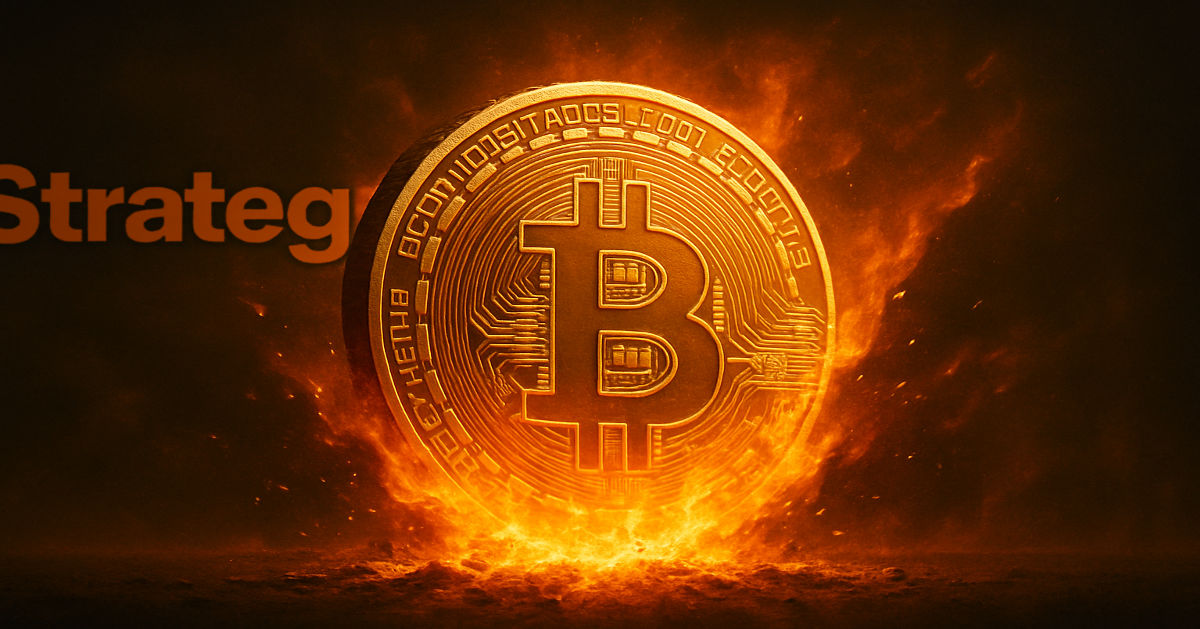
Michael Saylor’s Strategy (MSTR) Opens $2.1B ATM Program for Strife Preferred StockStrategy has launched a $2.1 billion At-The-Market (ATM) equity program for its Strife (STRF) preferred stock, marking another step in the firm’s long-term strategy to build a Bitcoin-backed financial architecture.
The announcement was made by CEO and President Phong Lee during an investor update alongside Executive Chairman Michael Saylor. According to Lee, strong year-to-date results from the firm’s Bitcoin-linked securities Strike (STRK) and Strife (STRF) gave Strategy the confidence to expand its fundraising strategy.
BREAKING:
 Strategy to sell up to $2.1 billion of 10% preferred stock.pic.twitter.com/xufD8uv64v
Strategy to sell up to $2.1 billion of 10% preferred stock.pic.twitter.com/xufD8uv64v— Bitcoin Magazine (@BitcoinMagazine) May 22, 2025
“We’re currently at 16.3% BTC yield for the year, against a 25% target,” Lee said. “BTC dollar gain is $7.7 billion so far, on track toward our $15 billion target.”
Both instruments have outperformed expectations since launch. Strike is up 24% from its initial price of $80 to nearly $100. Strife, which was priced at $85 just two months ago, now trades around $98.80, a 16% increase. By comparison, similarly structured preferreds in the market have declined by 3–5% over the same period.

In the last 30 days alone, Strike rose 17% and Strife 12%, bringing both close to par value. Lee emphasized the liquidity profile of these instruments, citing average daily trading volumes of $31 million for Strike and $23 million for Strife. “That’s 60x what we typically see in comparable preferreds,” he noted.
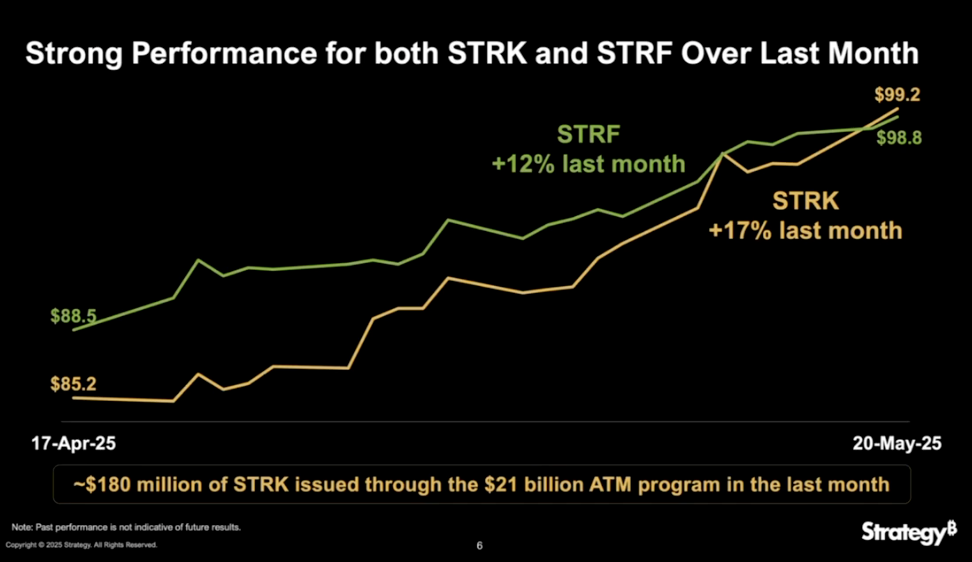
The company previously issued $212 million through Strike’s ATM, with no adverse pricing pressure. Based on the trading volume and investor demand, Lee said the company believes the $2.1 billion Strife ATM can be executed in a similar fashion.
Strife is a perpetual preferred stock with a 10% coupon and sits at the top of Strategy’s capital stack. Saylor described it as “the crown jewel” of the company’s preferred offerings. “We’re going to be ten times as careful with Strife,” he said. “Our goal is for it to be seen as investment-grade fixed income — a high-quality instrument with robust protections.”
Strike, by contrast, is positioned for what Saylor called “Bitcoin-curious” investors. It carries an 8% coupon and includes upside through Bitcoin conversion. “Think of it like a Bitcoin fellowship with a stipend,” Saylor said.
Strategy now operates three ATM programs: $21 billion each for MSTR equity and Strike, and $2.1 billion for Strife. These are rebalanced daily, with issuance adjusted based on market conditions, volatility, and investor demand. According to Saylor, this dynamic structure allows the company to optimize Bitcoin acquisition and capital deployment across changing market environments.
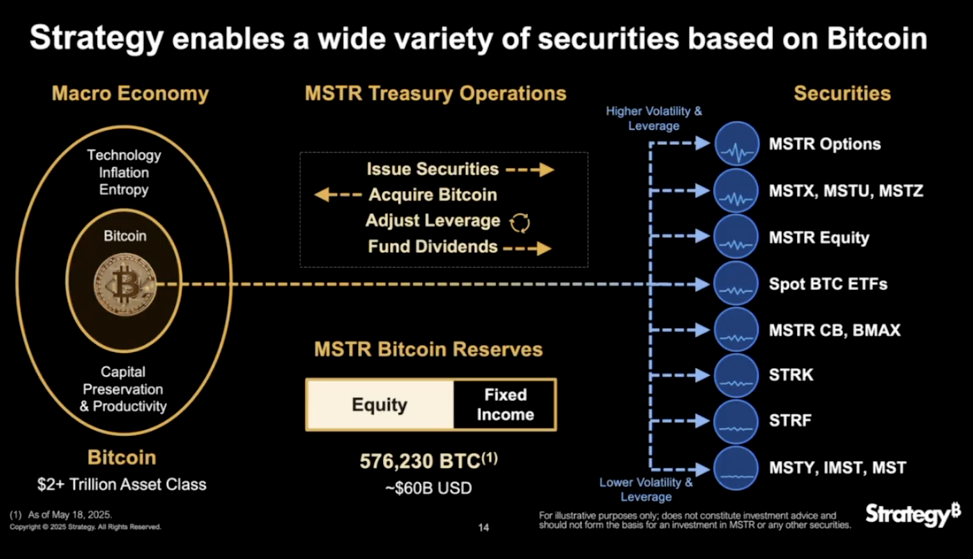
Behind this strategy sits Strategy’s Bitcoin treasury, now totaling 576,230 BTC — roughly $60 billion in value. “That permanent capital is the foundation for everything we’re building,” Saylor said.
While spot Bitcoin ETFs cater to investors looking for direct price exposure, Strategy continues to offer a more nuanced set of instruments — each targeting different levels of risk, return, and compliance. The Strife ATM is the latest move in that broader strategy.
This post Michael Saylor’s Strategy (MSTR) Opens $2.1B ATM Program for Strife Preferred Stock first appeared on Bitcoin Magazine and is written by Jenna Montgomery.
-
 @ cae03c48:2a7d6671
2025-05-23 12:00:46
@ cae03c48:2a7d6671
2025-05-23 12:00:46Bitcoin Magazine
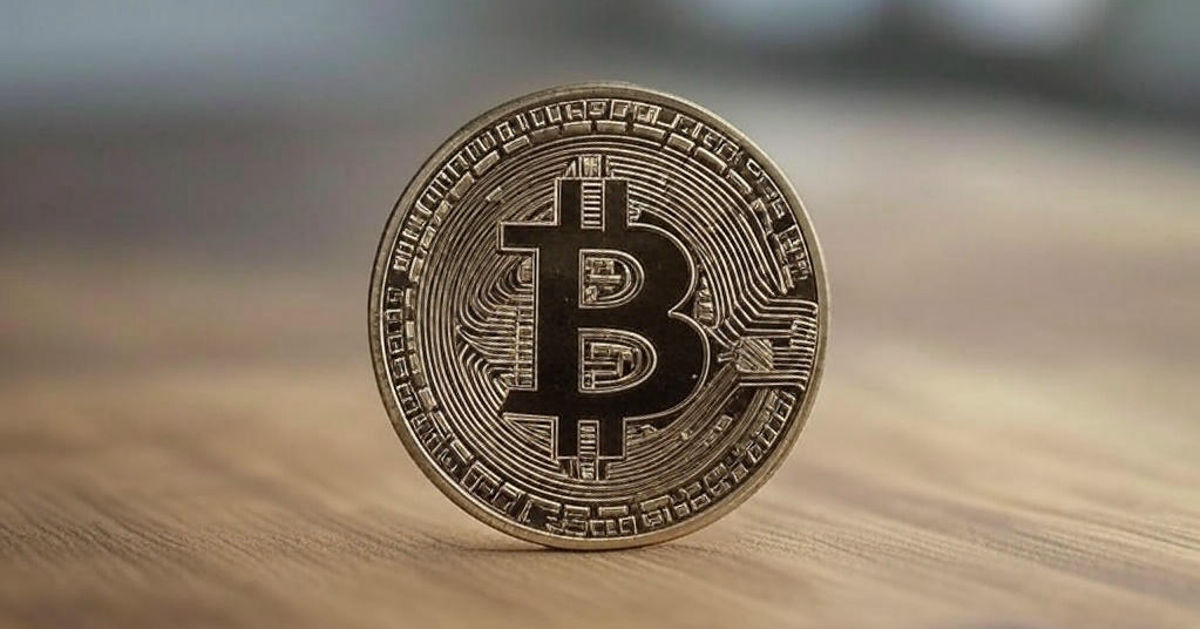
H100 Group Became The First Publicly Listed Bitcoin Treasury Company In SwedenH100 Group AB has announced it has become Sweden’s first publicly listed health technology company to adopt Bitcoin as a treasury reserve asset, announcing the purchase of 4.39 BTC for 5 million NOK (approximately $475,000) as part of its long-term Bitcoin Treasury Strategy.
The Stockholm-based company, which provides AI-powered automation and digital solutions for healthcare providers, joins a growing roster of public companies adding Bitcoin to their balance sheets in 2025. The purchase was executed at an average price of 1,138,737 NOK per Bitcoin (roughly $108,200).
JUST IN:
 H100 Group buys 4.39 BTC and becomes Sweden's first publicly listed #Bitcoin treasury company. pic.twitter.com/pNXe9XT2a7
H100 Group buys 4.39 BTC and becomes Sweden's first publicly listed #Bitcoin treasury company. pic.twitter.com/pNXe9XT2a7— Bitcoin Magazine (@BitcoinMagazine) May 22, 2025
“This addition to H100’s Bitcoin Treasury Strategy follows an increasing number of tech-oriented growth companies holding Bitcoin on their balance sheet,” said CEO Sander Andersen. “And I believe the values of individual sovereignty highly present in the Bitcoin community aligns well with, and will appeal to, the customers and communities we are building the H100 platform for.”
The move comes amid a surge in corporate Bitcoin adoption, with many public companies announcing Bitcoin treasury programs in the first five months of 2025. Notable recent entrants include Twenty One Capital, Strive and several others.
H100 Group emphasized that the Bitcoin purchase does not affect its core operations in the health and longevity industry. The company views the investment as a strategic deployment of excess liquidity to strengthen its financial position while aligning with its values of individual sovereignty.
The announcement reflects a broader shift in corporate treasury management, as companies seek to diversify their holdings beyond traditional cash reserves.
At press time, Bitcoin trades at $111,108, up 1.28% over the past 24 hours, as institutional adoption continues to drive market momentum. H100 Group’s shares closed up 1.37% at 0.89 SEK on the NGM Nordic SME exchange following the announcement.
This post H100 Group Became The First Publicly Listed Bitcoin Treasury Company In Sweden first appeared on Bitcoin Magazine and is written by Vivek Sen.
-
 @ cae03c48:2a7d6671
2025-05-23 12:00:45
@ cae03c48:2a7d6671
2025-05-23 12:00:45Bitcoin Magazine

The Freedom Issue: Letter From the EditorBitcoin is freedom money, a censorship-resistant form of digital cash allowing anyone with an internet connection to send money to anyone else, regardless of nationality, borders, or other arbitrary restrictions.
I personally first heard about Bitcoin in early 2013, through friends who were buying… stuff from Silk Road, the darknet marketplace helmed by the mysterious Dread Pirate Roberts. Although Silk Road was controversial (the “stuff” most people bought and sold was, of course, illegal drugs), it represented a radical example of the form of freedom that Bitcoin provides.
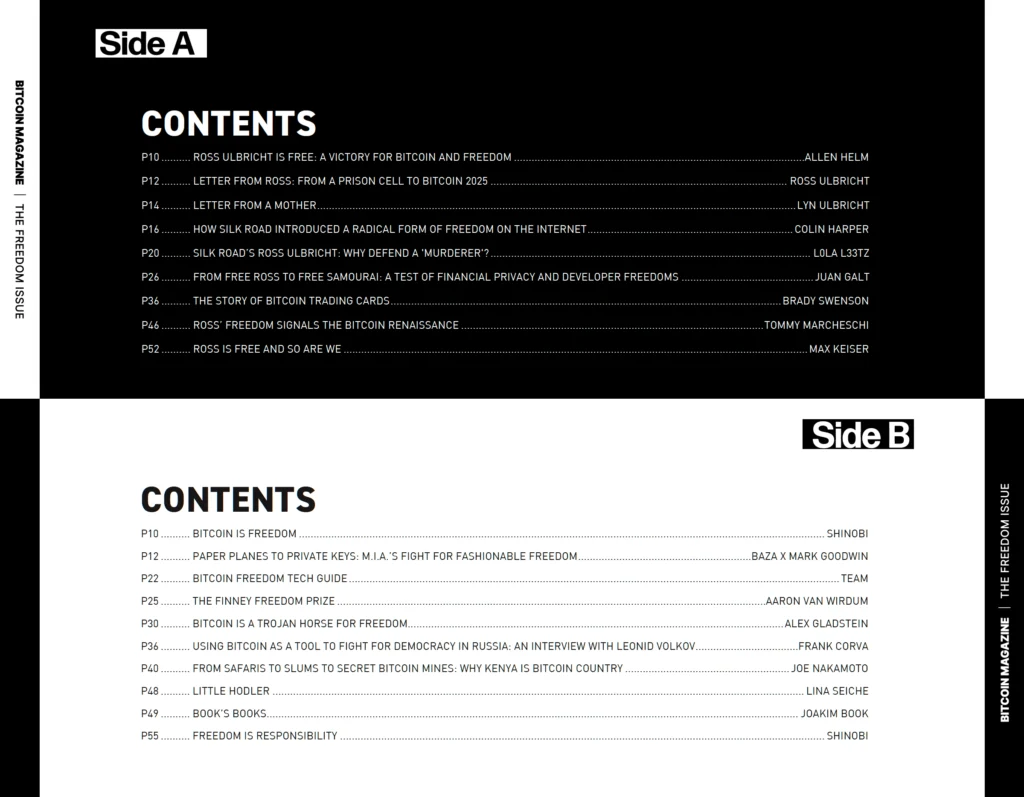
Later in 2013, Silk Road was shut down by the FBI, and Ross Ulbricht was revealed as the market’s founder and the true identity behind the Dread Pirate Roberts pseudonym — although he claims several people operated the account. Ulbricht was sentenced to two life sentences plus forty years in prison without the possibility of parole.
In my view — and that of many Bitcoiners — it was excessive. Even if you believe Ulbricht was guilty of everything he was convicted of (all nonviolent crimes), he was made an example of, and didn’t actually deserve to be locked up for the rest of his days.
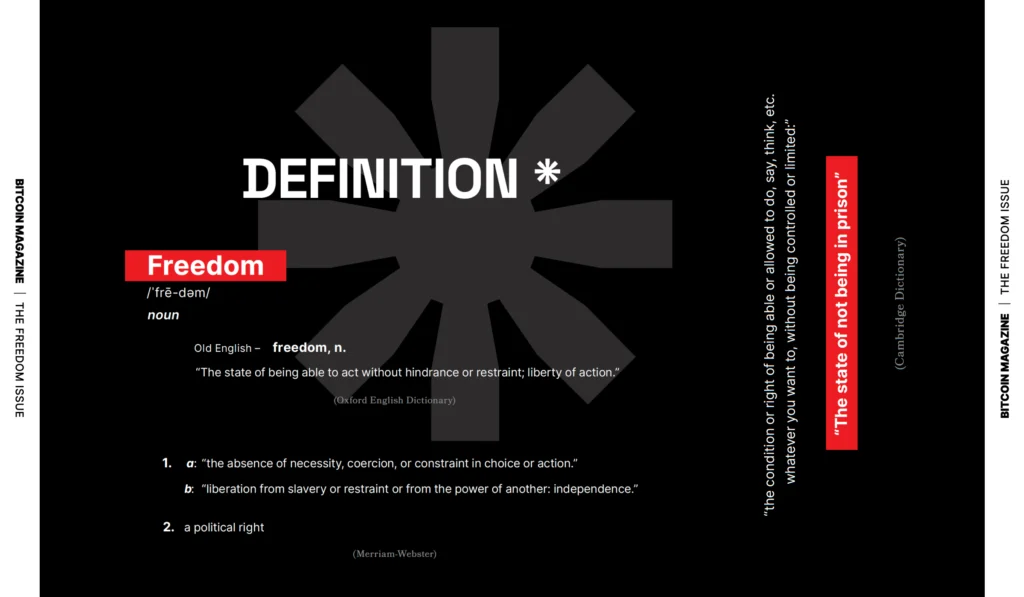
Fortunately, Ulbricht was granted a full and unconditional pardon from President Trump in January of this year. The founder of Silk Road, in a very literal sense, has regained his freedom.
This edition of Bitcoin Magazine celebrates and highlights the freedom aspect of Bitcoin with a range of articles and artwork focusing on the people and projects that use bitcoin to advance liberty, and those who make this possible… with a special focus on Ulbricht and Silk Road.
For other stories about bitcoin as freedom money, flip the magazine around!
Welcome to The Freedom Issue.
Aaron van Wirdum
Don’t miss your chance to own The Freedom Issue—featuring never-before-seen letters from Ross Ulbricht and his mother, Lyn. Limited run. Only available while supplies last.
This piece is the Letter from the Editor featured in the latest print edition of Bitcoin Magazine, The Freedom Issue. We’re sharing it here as an early look at the ideas explored throughout the full issue.
This post The Freedom Issue: Letter From the Editor first appeared on Bitcoin Magazine and is written by Aaron Van Wirdum.
-
 @ 7e6f9018:a6bbbce5
2025-05-22 15:44:12
@ 7e6f9018:a6bbbce5
2025-05-22 15:44:12Over the last decade, birth rates in Spain have dropped by 30%, from 486,000 births in 2010 to 339,000 in 2020, a decline only comparable to that seen in Japan and the Four Asian Tigers.
The main cause seems to stem from two major factors: (1) the widespread use of contraceptive methods, which allow for pregnancy control without reducing sexual activity, and (2) women's entry into the labor market, leading to a significant shift away from traditional maternal roles.
In this regard, there is a phenomenon of demographic inertia that I believe could become significant. When a society ages and the population pyramid inverts, the burden this places on the non-dependent population could further contribute to a deeper decline in birth rates.

The more resources (time and money) non-dependent individuals have to dedicate to the elderly (dependents), the less they can allocate to producing new births (also dependents):
- An only child who has to care for both parents will bear a burden of 2 (2 ÷ 1).
- Three siblings who share the responsibility of caring for their parents will bear a burden of 0.6 (2 ÷ 3).
This burden on only children could, in many cases, be significant enough to prevent them from having children of their own.
In Spain, the generation of only children reached reproductive age in 2019(*), this means that right now the majority of people in reproductive age in Spain are only child (or getting very close to it).
If this assumption is correct, and aging feeds on itself, then, given that Spain has one of the worst demographic imbalances in the world, this phenomenon is likely to manifest through worsening birth rates. Spain’s current birth rate of 1.1 may not yet have reached its lowest point.
(*)Birth rate table and the year in which each generation reaches 32 years of age, Spain.
| Year of birth | Birth rate | Year in which the generation turns 32 | | ------------------ | -------------- | ----------------------------------------- | | 1971 | 2.88 | 2003 | | 1972 | 2.85 | 2004 | | 1973 | 2.82 | 2005 | | 1974 | 2.81 | 2006 | | 1975 | 2.77 | 2007 | | 1976 | 2.77 | 2008 | | 1977 | 2.65 | 2009 | | 1978 | 2.54 | 2010 | | 1979 | 2.37 | 2011 | | 1980 | 2.21 | 2012 | | 1981 | 2.04 | 2013 | | 1982 | 1.94 | 2014 | | 1983 | 1.80 | 2015 | | 1984 | 1.72 | 2016 | | 1985 | 1.64 | 2017 | | 1986 | 1.55 | 2018 | | 1987 | 1.49 | 2019 | | 1988 | 1.45 | 2020 | | 1989 | 1.40 | 2021 | | 1990 | 1.36 | 2022 | | 1991 | 1.33 | 2023 | | 1992 | 1.31 | 2024 | | 1993 | 1.26 | 2025 | | 1994 | 1.19 | 2026 | | 1995 | 1.16 | 2027 | | 1996 | 1.14 | 2028 | | 1997 | 1.15 | 2029 | | 1998 | 1.13 | 2030 | | 1999 | 1.16 | 2031 | | 2000 | 1.21 | 2032 | | 2001 | 1.24 | 2033 | | 2002 | 1.25 | 2034 | | 2003 | 1.30 | 2035 | | 2004 | 1.32 | 2036 | | 2005 | 1.33 | 2037 | | 2006 | 1.36 | 2038 | | 2007 | 1.38 | 2039 | | 2008 | 1.44 | 2040 | | 2009 | 1.38 | 2041 | | 2010 | 1.37 | 2042 | | 2011 | 1.34 | 2043 | | 2012 | 1.32 | 2044 | | 2013 | 1.27 | 2045 | | 2014 | 1.32 | 2046 | | 2015 | 1.33 | 2047 | | 2016 | 1.34 | 2048 | | 2017 | 1.31 | 2049 | | 2018 | 1.26 | 2050 | | 2019 | 1.24 | 2051 | | 2020 | 1.19 | 2052 |
-
 @ cae03c48:2a7d6671
2025-05-23 12:00:44
@ cae03c48:2a7d6671
2025-05-23 12:00:44Bitcoin Magazine

Bitcoin Pizza Day: 15 Years Since 10,000 BTC Bought Two Pizzas and Changed EverythingOn May 22, 2010, Bitcoin became more than just an idea—it became real money. Laszlo Hanyecz, a developer and early contributor to Bitcoin’s codebase, posted a casual offer: “I’ll pay 10,000 bitcoins for a couple of pizzas.” Five days later, someone took him up on it. Two Papa John’s pizzas were delivered. A screenshot was posted. Bitcoin had entered the real world.
15 years ago, Laszlo Hanyecz spent 10,000 #bitcoin worth $30 on two Papa John's pizzas.
Today, 10,000 $BTC is worth over $1,100,000,000.
What a legend!
 pic.twitter.com/EbxQAsixhZ
pic.twitter.com/EbxQAsixhZ— Bitcoin Magazine (@BitcoinMagazine) May 22, 2025
That 10,000 Bitcoin, worth about $41 at the time, is now valued at over $1.1 billion. And with Bitcoin hitting a new all-time high of $111,999 on the 15th anniversary of the transaction, the story of the “Bitcoin Pizza” carries more weight than ever.
15 years ago, someone paid 10,000 #Bitcoin for 2 pizzas. That’s worth over $1,000,000,000 today!

It wasn’t just about the pizza. This was the moment Bitcoin proved itself as a functioning currency. Until then, it had lived mostly in theory and code—talked about by cryptographers and mined by hobbyists. Hanyecz’s post, and the trade that followed, transformed the idea into action. “This transaction made Bitcoin real in my eyes,” he said in a 2019 interview. “It wasn’t worth much at the time. I wouldn’t have spent $100 million on pizza, right? But if I hadn’t done that, maybe Bitcoin wouldn’t have become so popular.”
Over the summer of 2010, Hanyecz continued using Bitcoin to buy pizzas, eventually spending more than 79,000 BTC—now worth nearly $8.7 billion. While some have joked at his expense, the truth is this: without those early real-world transactions, Bitcoin might never have proven its use case. Hanyecz helped move Bitcoin from the fringe into functionality.
That legacy still shapes us today. Bitcoin Pizza Day has become a cultural milestone in the crypto world, with meetups, pizza parties, and educational events held globally each May 22. The day serves as a reminder of how far the technology has come—and the importance of everyday actions and the impact they have.
Smiles, joy, and shared moments, this is what today looked like.#Bitcoin Pizza Day at His Grace School was more than a visit. It was connection, care, and community. A heartfelt thank you to everyone who donated and supported #BitcoinGhana #BitcoinPizzaDay #BTC #Bitfiasi pic.twitter.com/xRMv1rpife
— Bitfiasi Initiative (@bitfiasi) May 22, 2025
Just this week, fast food chain Steak ‘n Shake began accepting Bitcoin via the Lightning Network, signaling a growing wave of mainstream adoption. What once felt experimental is now becoming part of everyday commerce.
Bitcoin Pizza Day is about recognition. One simple transaction proved that Bitcoin could work—and 15 years later, the world is still building on that first bite.
This post Bitcoin Pizza Day: 15 Years Since 10,000 BTC Bought Two Pizzas and Changed Everything first appeared on Bitcoin Magazine and is written by Jenna Montgomery.
-
 @ b1ddb4d7:471244e7
2025-05-23 12:00:42
@ b1ddb4d7:471244e7
2025-05-23 12:00:42Asia has emerged as a powerhouse for bitcoin adoption, with diverse countries across the region embracing the world’s leading digital currency in unique ways.
From institutional investors in Singapore to grassroots movements in Indonesia, the Asian bitcoin ecosystem presents a fascinating tapestry of innovation, regulation, and community-driven initiatives.
We dive deep into the current state of bitcoin adoption across key Asian markets, providing investors with actionable insights into this dynamic region.
The Numbers: Asia’s Bitcoin Dominance
As of early 2025, over 500 million people worldwide hold some form of digital currency, with bitcoin remaining the most widely adopted digital asset. Asia stands at the forefront of this adoption wave, with the Central & Southern Asia and Oceania (CSAO) region leading the world in digital currency adoption according to Chainalysis’s 2024 Global Crypto Adoption Index.
The statistics paint a compelling picture:
- Seven of the top 20 countries in global crypto adoption are located in the CSAO region.
- India and China together comprise almost half of the world’s digital currency user base.
- Japan’s digital currency market is expected to reach 19.43 million users by the end of 2025, with a penetration rate of 15.93%.
Behind these impressive numbers lies a complex ecosystem shaped by diverse factors including regulatory environments, technological infrastructure, economic necessities, and vibrant community initiatives.
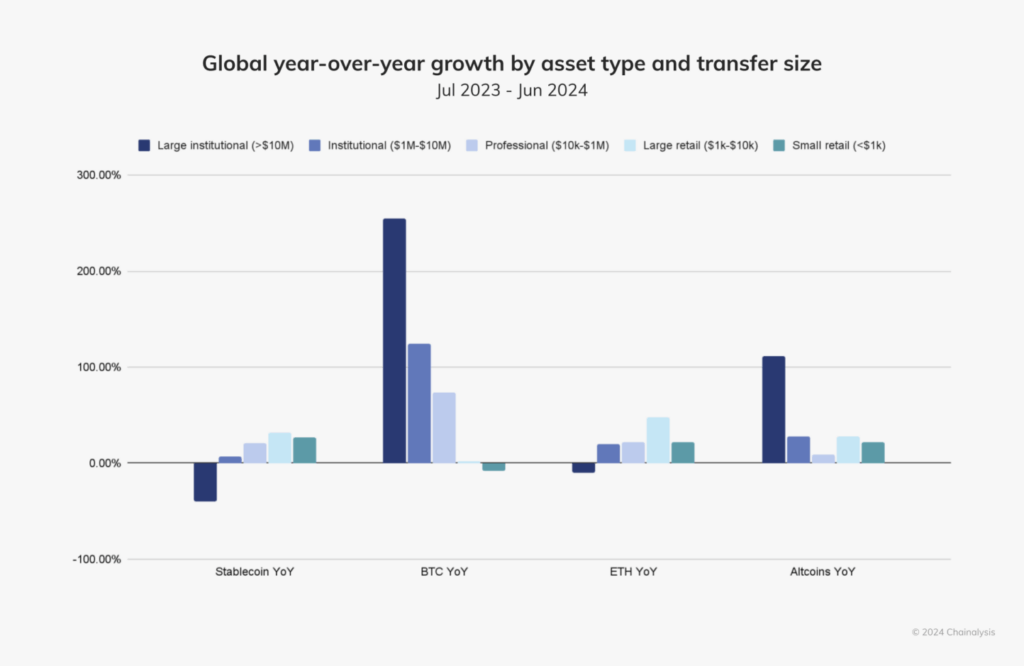
Photo Source: Chainalysis
Country-by-Country Analysis
India: The Grassroots Powerhouse
India ranks first in Chainalysis’s Global Crypto Adoption Index, with bitcoin adoption thriving particularly in tier-2 and tier-3 cities. This grassroots movement is driven primarily by:
- Financial inclusion: Bitcoin offers banking-like services to India’s large unbanked population.
- Remittance solutions: Lower fees for the significant Indian diaspora sending money home.
- Mobile wallet proliferation: India’s high smartphone penetration enables easy access to bitcoin services.
Japan: The Regulatory Pioneer
Japan has long played a significant role in bitcoin’s evolution, from hosting some of the earliest exchanges to pioneering regulatory clarity. In 2025, Japan finds itself at a fascinating crossroads:
- The Japan Financial Services Agency is considering reclassifying digital currency assets as financial products akin to stocks, potentially enhancing user protection.
- Major corporations like Metaplanet Inc. are expanding their bitcoin holdings, with plans to increase holdings by 470% to reach 10,000 BTC in 2025.
- The country boasts a thriving grassroots bitcoin community and a strong developer ecosystem.
Bitcoin adoption in Japan is uniquely balanced between institutional involvement and community enthusiasm, with initiatives like Blockstream’s Tokyo office working to promote layer-2 solutions, self-custody, and developer education.
Vietnam: The P2P Leader
Vietnam consistently ranks among the top countries for bitcoin adoption per capita. The country’s relationship with bitcoin is characterized by:
- Strong peer-to-peer (P2P) platform usage for daily transactions and remittances.
- High mobile wallet adoption driving grassroots usage.
- Bitcoin serving as a hedge against local currency fluctuations.
- Relatively favorable regulatory attitude compared to some neighboring countries.
Singapore: The Institutional Hub
Singapore has established itself as Asia’s premier institutional bitcoin destination through:
- Clear and forward-thinking regulatory frameworks, particularly the Payment Services Act.
- Growing presence of global digital currency firms including Gemini, OKX, and HashKey, which have received regulatory approvals.
- A robust financial infrastructure catering to high-net-worth individuals and institutional investors.
While Singapore’s consumer protection-focused framework restricts promotional activities and public advertising by digital currency service providers, the city-state remains a beacon for institutional bitcoin adoption in Asia.
South Korea: Retail Dominance Transitioning to Institutional
South Korea presents a fascinating case study of a market in transition:
- Retail investors currently dominate digital currency trading volume, while institutional participation significantly lags behind.
- Experts expect institutional involvement to increase, though a significant shift may not occur until around 2027.
- The local finance watchdog recently launched a crypto committee to assess permissions for corporate digital currency investors and ETFs.
- Users must access fiat-to-digital currency services through local exchanges with official banking partnerships, linking digital currency activities to legal identities.
Bitcoin Communities: The Grassroots Movements
What truly sets Asia apart in the global bitcoin landscape is the vibrant tapestry of community-driven initiatives across the region. These grassroots movements are instrumental in driving adoption from the ground up.
Bitcoin House Bali: A Community Hub
In Indonesia, the Bitcoin House Bali project exemplifies grassroots innovation. This initiative has transformed an old mining container into a vibrant hub for bitcoin education and community engagement.
Key features include:
- Free workshops (including “Bitcoin for Beginners” and “Bitcoin for Kids”).
- Developer programs including online classes, BitDevs Workshops, and Hackathons.
- A closed-loop economic system that turns bitcoin into community points.
- Merchant onboarding—from restaurants and drivers to scooter rentals and street vendors.
Bitcoin Seoul 2025: Bringing the Community Together
The upcoming Bitcoin Seoul 2025 conference (June 4-6, 2025) represents Asia’s largest bitcoin-focused gathering, bringing together global leaders, executives, and community members.
The event will feature:
- The Bitcoin Policy Summit: Seoul Edition, providing insights into regulatory trends.
- The Bitcoin Finance Forum, addressing institutional investment and treasury management.
- A Global Bitcoin Community Assembly for bitcoin grassroots and community leaders.
- Live Lightning Network payments demonstrations at the on-site Lightning Market.
This event underscores South Korea’s emerging role in the global Bitcoin ecosystem and highlights the growing institutional interest in the region.
Regulatory Landscapes: A Mixed Picture
The regulatory environment for bitcoin across Asia presents a complex and evolving picture that significantly impacts adoption patterns.
Japan’s Regulatory Evolution
Japan is considering tightening regulations on digital asset transactions by reclassifying them as financial products similar to stocks. If implemented, these changes would:
- Require issuers to disclose more detailed information on their corporate status.
- Potentially enhance user protection.
- Come into effect after June 2025, following policy direction outlines by the administration.
Current regulations in Japan are relatively digital currency-friendly, with bitcoin recognized as a legal form of payment under the Payment Services Act since 2016.
Singapore’s Balanced Approach
Singapore maintains a regulatory framework that emphasizes market stability and consumer protection, including:
- Restrictions on promoting digital services in public areas.
- The Payment Services Act that regulates digital currency exchanges.
- A general approach that supports institutional adoption while carefully managing retail exposure.
This balanced approach has helped establish Singapore as a trusted hub for bitcoin businesses and institutional investors.
South Korea’s Transitional Framework
South Korea’s regulatory landscape is in flux, with several developments impacting the bitcoin ecosystem:
- Corporate access to digital currenc
-
 @ b1ddb4d7:471244e7
2025-05-23 12:00:41
@ b1ddb4d7:471244e7
2025-05-23 12:00:41Global fintech leader Revolut has announced a landmark partnership with Lightspark, a pioneer in blockchain infrastructure solutions, to integrate bitcoin’s Lightning Network into its platform.
This collaboration, now live for Revolut users in the UK and select European Economic Area (EEA) countries, marks a transformative leap toward frictionless, real-time transactions—eliminating delays and exorbitant fees traditionally associated with digital asset transfers.
 Major update: @RevolutApp is now partnering with @lightspark pic.twitter.com/OUblgrj6Xr
Major update: @RevolutApp is now partnering with @lightspark pic.twitter.com/OUblgrj6Xr— Lightspark (@lightspark) May 7, 2025
Breaking Barriers in Digital Currency Usability
By adopting Lightspark’s cutting-edge technology, Revolut empowers its 40+ million customers to execute bitcoin transactions instantly at a fraction of current costs.
This integration addresses longstanding pain points in digital currency adoption, positioning bitcoin as a practical tool for everyday payments. Users can now seamlessly send, receive, and store bitcoin with the same ease as traditional fiat currencies, backed by Revolut’s secure platform.
The partnership also advances Revolut’s integration into the open Money Grid, a decentralized network enabling universal interoperability between financial platforms.
This move aligns Revolut with forward-thinking fintechs adopting next-gen solutions like Lightning transactions and Universal Money Addresses (UMA), which simplify cross-border payments by replacing complex wallet codes with human-readable addresses (e.g., $john.smith).
Why This Matters
The collaboration challenges conventional payment rails, which often incur delays of days and high fees for cross-border transfers. By contrast, Lightning Network transactions settle in seconds for minimal cost, revolutionizing peer-to-peer payments, remittances, and merchant settlements. For Revolut users, this means:
- Instant transactions: Send bitcoin globally in under three seconds.
- Near-zero fees: Dramatically reduce costs compared to traditional crypto transfers.
- Enhanced utility: Use bitcoin for daily spending, not just as a speculative asset.
The Road Ahead
Revolut plans to expand Lightning Network access to additional markets in 2025, with ambitions to integrate UMA support for seamless fiat and digital currency interactions. Lightspark will continue optimizing its infrastructure to support Revolut’s scaling efforts, further bridging the gap between blockchain innovation and mainstream finance.
About Revolut
Revolut is a global financial app serving over 40 million customers worldwide. Offering services ranging from currency exchange and stock trading to digital assets and insurance, Revolut is committed to building a borderless financial ecosystem.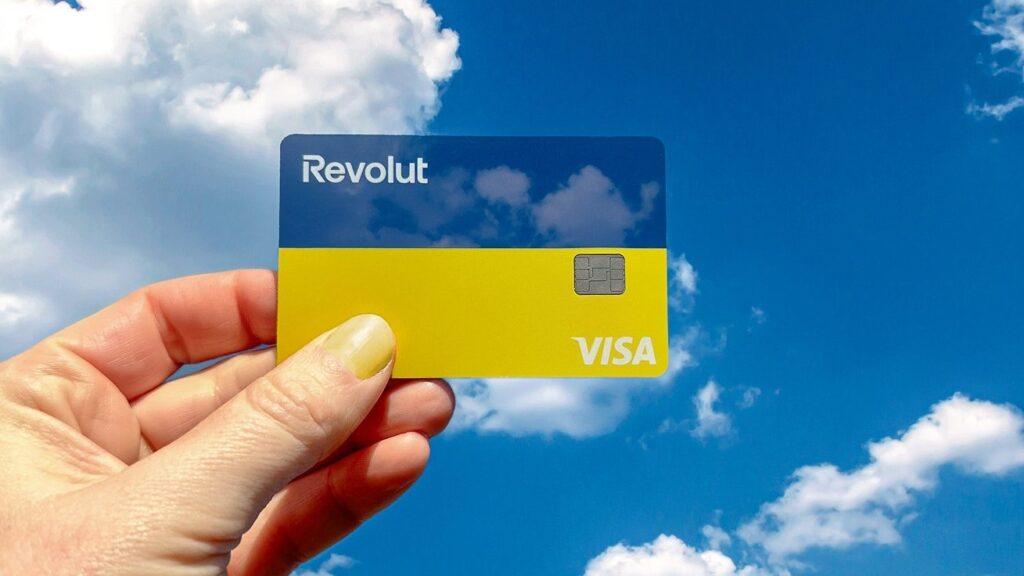
About Lightspark
Founded by former PayPal and Meta executives, Lightspark develops enterprise-grade solutions for the Lightning Network. Its technology stack empowers institutions to harness bitcoin’s speed and efficiency while maintaining regulatory compliance.
-
 @ b1ddb4d7:471244e7
2025-05-23 12:00:39
@ b1ddb4d7:471244e7
2025-05-23 12:00:39In the heart of East Africa, where M-Pesa reigns supreme and innovation pulses through bustling markets, a quiet revolution is brewing—one that could redefine how millions interact with money.
Enter Bitika, the Kenyan startup turning bitcoin’s complexity into a three-step dance, merging the lightning speed of sats with the trusted rhythm of mobile money.
At the helm is a founder whose “aha” moment came not in a boardroom, but at his kitchen table, watching his father grapple with the gap between understanding bitcoin and actually using it.
Bitika was born from that friction—a bridge between M-Pesa’s ubiquity and bitcoin’s borderless promise, wrapped in a name as playful as the Swahili slang that inspired it.
But this isn’t just a story about simplifying transactions. It’s about liquidity battles, regulatory tightropes, and a vision to turn Bitika into the invisible rails powering Africa’s Bitcoin future.
Building on Bitcoin
- Tell us a bit about yourself and how you got into bitcoin/fintech, and what keeps you passionate about this space?
I first came across bitcoin in 2020, but like many at that time, I didn’t fully grasp what it really was. It sounded too complicated, probably with the heavy terminologies. Over time, I kept digging deeper and became more curious.
I started digging into finance and how money works and realised this was what I needed to understand bitcoin’s objectives. I realized that bitcoin wasn’t just a new type of money—it was a breakthrough in how we think about freedom, ownership, and global finance.
What keeps me passionate is how bitcoin can empower people—especially in Africa—to take control of their wealth, without relying on unstable systems or middlemen.
- What pivotal moment or experience inspired you to create Bitika? Was there a specific gap in Kenya’s financial ecosystem that sparked the idea?
Yes, this idea was actually born right in my own home. I’ve always been an advocate for bitcoin, sharing it with friends, family, and even strangers. My dad and I had countless conversations about it. Eventually, he understood the concept. But when he asked, “How do I even buy bitcoin?” or “Can you just buy it for me?” and after taking him through binance—that hit me.
If someone I’d educated still found the buying process difficult, how many others were feeling the same way? That was the lightbulb moment. I saw a clear gap: the process of buying bitcoin was too technical for the average Kenyan. That’s the problem Bitika set out to solve.
- How did you identify the synergy between bitcoin and M-Pesa as a solution for accessibility?
M-Pesa is at the center of daily life in Kenya. Everyone uses it—from buying groceries to paying rent. Instead of forcing people to learn new tools, I decided to meet them where they already are. That synergy between M-Pesa and bitcoin felt natural. It’s about bridging what people already trust with something powerful and new.
- Share the story behind the name “Bitika” – does it hold a cultural or symbolic meaning?
Funny enough, Bitika isn’t a deeply planned name. It came while I was thinking about bitcoin and the type of transformation it brings to individuals. In Swahili, we often add “-ka” to words for flair—like “bambika” from “bamba.”
So, I just coined Bitika as a playful and catchy way to reflect something bitcoin-related, but also uniquely local. I stuck with it because thinking of an ideal brand name is the toughest challenge for me.
- Walk us through the user journey – how does buying bitcoin via M-Pesa in “3 simple steps” work under the hood?
It’s beautifully simple.
1. The user enters the amount they want to spend in KES—starting from as little as 50 KES (about $0.30).
2. They input their Lightning wallet address.
3. They enter their M-Pesa number, which triggers an STK push (payment prompt) on their phone. Once confirmed—pap!—they receive bitcoin almost instantly.
Under the hood, we fetch the live BTC price, validate wallet addresses, check available liquidity, process the mobile payment, and send sats via the Lightning Network—all streamlined into a smooth experience for the user.
- Who’s Bitika’s primary audience? Are you focusing on unbanked populations, tech enthusiasts, or both?
Both. Bitika is designed for everyday people—especially the unbanked and underbanked who are excluded from traditional finance. But we also attract bitcoiners who just want a faster, easier way to buy sats. What unites them is the desire for a seamless and low-barrier bitcoin experience.
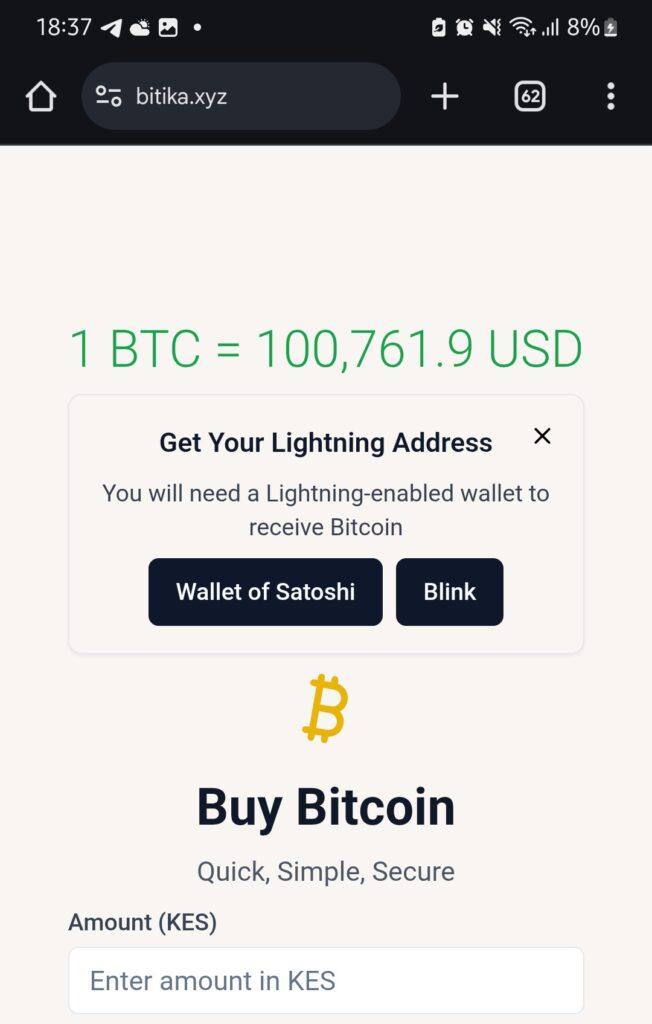
Community and Overcoming Challenges
- What challenges has Bitika faced navigating Kenya’s bitcoin regulations, and how do you build trust with regulators?
Regulation is still evolving here. Parliament has drafted bills, but none have been passed into law yet. We’re currently in a revision phase where policymakers are trying to strike a balance between encouraging innovation and protecting the public.
We focus on transparency and open dialogue—we believe that building trust with regulators starts with showing how bitcoin can serve the public good.
- What was the toughest obstacle in building Bitika, and how did you overcome it?
Liquidity. Since we don’t have deep capital reserves, we often run into situations where we have to pause operations often to manually restock our bitcoin supply. It’s frustrating—for us and for users. We’re working on automating this process and securing funding to maintain consistent liquidity so users can access bitcoin at any time, without disruption.
This remains our most critical issue—and the primary reason we’re seeking support.
- Are you eyeing new African markets? What’s next for Bitika’s product?
Absolutely. The long-term vision is to expand Bitika into other African countries facing similar financial challenges. But first, we want to turn Bitika into a developer-first tool—infrastructure that others can build on. Imagine local apps, savings products, or financial tools built using Bitika’s simple bitcoin rails. That’s where we’re heading.
- What would you tell other African entrepreneurs aiming to disrupt traditional finance?
Disrupting finance sounds exciting—but the reality is messy. People fear what they don’t understand. That’s why simplicity is everything. Build tools that hide the complexity, and focus on making the user’s life easier. Most importantly, stay rooted in local context—solve problems people actually face.
What’s Next?
- What’s your message to Kenyans hesitant to try bitcoin, and to enthusiasts watching Bitika?
To my fellow Kenyans: bitcoin isn’t just an investment—it’s a sovereign tool. It’s money you truly own. Start small, learn, and ask questions.
To the bitcoin community: Bitika is proof that bitcoin is working in Africa. Let’s keep pushing. Let’s build tools that matter.
- How can the bitcoin community, both locally and globally, support Bitika’s mission?
We’re currently fundraising on Geyser. Support—whether it’s financial, technical, or simply sharing our story—goes a long way. Every sat you contribute helps us stay live, grow our liquidity, and continue building a tool that brings bitcoin closer to the everyday person in Africa.
Support here: https://geyser.fund/project/bitika
-
 @ 58937958:545e6994
2025-05-22 12:25:49
@ 58937958:545e6994
2025-05-22 12:25:49Since it's Bitcoin Pizza Day, I made a Bitcoin pizza!
To give it a Japanese twist, I made it a mentaiko pizza (※ mentaiko = spicy cod roe, a popular Japanese ingredient often used in pasta or rice dishes). For the Bitcoin logo, I used a salmon terrine.
Salmon Terrine
I cut out the "B" logo using hanpen (※ hanpen = a soft, white Japanese fish cake made from fish paste and yam). Tip: You can also cut a colored plastic folder into the "B" shape and place it on top as a stencil — makes it easier!
I blended salmon, hanpen, milk, egg, and a bit of salt in a food processor, poured it into a container, and baked it in a water bath.
Pizza Dough
I mixed bread flour, dry yeast, salt, olive oil, and water, then kneaded it with determination! Let it rise for about an hour until fluffy.
Mentaiko Mayo Topping
I mixed mentaiko, mayonnaise, and soy sauce.
I spread out the dough, added the mentaiko mayo, cheese, and corn, then baked it. Halfway through, I added thin slices of mochi (rice cake). After baking, I topped it with seaweed and the salmon terrine to finish!

Lots to reflect on
About the Terrine
In the video, you’ll see I divided the terrine into two portions. I was worried that the salmon and hanpen parts might end up looking too similar in color, making the “B” logo hard to see.
So for one half, I added ketchup, thinking: “Maybe this will make the red more vibrant?” But even with the ketchup, it didn’t change much.
The Mochi
I accidentally bought thinly sliced mochi, but I realized it might burn too easily as a pizza topping. Regular mochi with standard thickness is probably better.
I added the mochi halfway through baking, opening the oven once, but now I’m thinking that might have lowered the oven temp too much.
Lessons Learned
This was my first and only attempt—no test run beforehand— so I ended up with a long list of lessons learned. In the future, I should definitely do a trial version first… But you know… salmon and mentaiko are expensive! (excuses, excuses)
Cheese
I wanted to do that Instagram-worthy cheese pull moment, but nope. No stretch. None at all. I think that kind of thing needs a totally different kind of cheese or prep. Will have to experiment more.
Taste Test
Actually really good. I usually don’t eat mentaiko mayo myself, and I’m a Margherita pizza fan at heart. But this was surprisingly nice. A little rich in flavor—made me crave a bowl of rice. Next time, I might skip the soy sauce to tone it down a bit.
nostr:nevent1qqsrhularycewltxz88e9wrwutkqu5pkylh3vxrmys2e0nuh7c2h06qgqp9zc
-
 @ b1ddb4d7:471244e7
2025-05-23 12:00:38
@ b1ddb4d7:471244e7
2025-05-23 12:00:38Custodial Lightning wallets allow users to transact without managing private keys or channel liquidity. The provider handles technical complexities, but this convenience comes with critical trade-offs:
- You don’t control your keys: The custodian holds your bitcoin.
- Centralized points of failure: Servers can be hacked or shut down.
- Surveillance risks: Providers track transaction metadata.
Key Risks of Custodial Lightning Wallets
*1. Hacks and Exit Scams*
Custodians centralize large amounts of bitcoin, attracting hackers:
- Nearly $2.2 billion worth of funds were stolen from hacks in 2024.
- Lightning custodians suffered breaches, losing user funds.
Unlike non-custodial wallets, victims have no recourse since they don’t hold keys.
*2. Censorship and Account Freezes*
Custodians comply with regulators, risking fund seizures:
- Strike (a custodial Lightning app) froze accounts of users in sanctioned regions.
- A U.K. court in 2020 ordered Bitfinex to freeze bitcoin worth $860,000 after the exchange and blockchain sleuthing firm Chainalysis traced the funds to a ransomware payment.
*3. Privacy Erosion*
Custodians log user activity, exposing sensitive data:
- Transaction amounts, receiver addresses, and IPs are recorded.
*4. Service Downtime*
Centralized infrastructure risks outages.
*5. Inflation of Lightning Network Centralization*
Custodians dominate liquidity, weakening network resilience:
- At the moment, 10% of the nodes on Lightning control 80% of the liquidity.
- This centralization contradicts bitcoin’s decentralized ethos.
How to Switch to Self-Custodial Lightning Wallets
Migrating from custodial services is straightforward:
*1. Choose a Non-Custodial Wallet*
Opt for wallets that let you control keys and channels:
- Flash: The self-custodial tool that lets you own your keys, control your coins, and transact instantly.
- Breez Wallet : Non-custodial, POS integrations.
- Core Lightning : Advanced, for self-hosted node operators.
*2. Transfer Funds Securely*
- Withdraw funds from your custodial wallet to a bitcoin on-chain address.
- Send bitcoin to your non-custodial Lightning wallet.
*3. Set Up Channel Backups*
Use tools like Static Channel Backups (SCB) to recover channels if needed.
*4. Best Practices*
- Enable Tor: Mask your IP (e.g., Breez’s built-in Tor support).
- Verify Receiving Addresses: Avoid phishing scams.
- Regularly Rebalance Channels: Use tools like Lightning Pool for liquidity.
Why Self-Custodial Lightning Matters
- Self-custody: Control your keys and funds.
- Censorship resistance: No third party can block transactions.
- Network health: Decentralized liquidity strengthens Lightning.
Self-custodial wallets now rival custodial ease.
Custodial Lightning wallets sacrifice security for convenience, putting users at risk of hacks, surveillance, and frozen funds. As bitcoin adoption grows, so does the urgency to embrace self-custodial solutions.
Take action today:
- Withdraw custodial funds to a hardware wallet.
- Migrate to a self-custodial Lightning wallet.
- Educate others on the risks of custodial control.
The Lightning Network’s potential hinges on decentralization—don’t let custodians become its Achilles’ heel.
-
 @ 58937958:545e6994
2025-05-22 11:50:08
@ 58937958:545e6994
2025-05-22 11:50:08ビットコインピザデーということで ビットコインピザを作りました せっかくなので日本っぽい明太ピザにして ビットコインロゴは鮭のテリーヌにしました
鮭のテリーヌ
はんぺんでBのマークを気合で切ります 色付きクリアファイルをBマークに切って乗せると楽です 鮭とはんぺんと牛乳と卵と塩をフードプロセッサーにかけます 容器に流して蒸し焼きします
生地作り
 強力粉・ドライイースト・塩・オリーブオイル・水を混ぜます
気合でこねます
1時間くらい発酵させるとふっくらします
強力粉・ドライイースト・塩・オリーブオイル・水を混ぜます
気合でこねます
1時間くらい発酵させるとふっくらしますトッピングの明太マヨ
明太子とマヨネーズとしょうゆを混ぜます
 のばした生地に
明太マヨ・チーズ・コーンを乗せて焼きます
途中で薄いおもちを乗せます
焼けたらのりとテリーヌを乗せてできあがり
のばした生地に
明太マヨ・チーズ・コーンを乗せて焼きます
途中で薄いおもちを乗せます
焼けたらのりとテリーヌを乗せてできあがり反省点いろいろ
今回一番くやしいのは明太マヨに色がつきすぎたこと 明太ピザってピンク色の感じが独特な気がするし もしかしたら日本だけかもと思ったから作ったのに 焼けたらトマトソースみたいな色になっちゃった なんてことだ 生地に焼き色がつかないな~白いな~もうちょっと焼くか~とか思ってたら 明太さんが焦げてました むねん
ちなみに製作動画の中でテリーヌを2つに分けているのは 鮭とはんぺんの部分が同じ色っぽくなってBが目立たなかったらどうしようと思って 片方はケチャップを足して 赤色濃くなるかな~大失敗したらいやだな~とか思ってたんですけど ケチャップ入れても何も変わらなかった むねん
薄いおもち(しゃぶしゃぶもちというらしい)を買ってしまったんだけど これはピザのトッピングにするには焦げそうだから 普通の厚みのもちの方がよさそう 今回は途中で一度オーブン開けておもちを乗せたけど オーブンの温度が下がるのが微妙かも
あと今回は練習無しのぶっつけ本番で作ったので ちょっと自分の中で反省点が多かったな~と やっぱり一度試作した方がいいですね いや鮭とか明太子とか高くて(言い訳
あ~あとチーズ 溶け溶けチーズがのびーるインスタ映え的なやつをやりたかったんですけど 全然むりでした のびないのびない ああいうのは別で工夫が必要そうなので要検討
味はおいしかったです 明太マヨって自分ではあんまり食べないしピザはマルゲリータ派なんですけど結構いいですね ちょっと味が濃くてご飯食べたくなっちゃった 次作る時はしょうゆ入れないようにしよう
nostr:nevent1qqsrhularycewltxz88e9wrwutkqu5pkylh3vxrmys2e0nuh7c2h06qgqp9zc
-
 @ b1ddb4d7:471244e7
2025-05-23 12:00:37
@ b1ddb4d7:471244e7
2025-05-23 12:00:37The upcoming Bitcoin 2025 conference, scheduled from May 27–29 at the Venetian Conference Center in Las Vegas, is set to make history with an official attempt to break the GUINNESS WORLD RECORDS® title for the most Bitcoin point-of-sale transactions in an eight-hour period.
Organized by BTC Inc, the event will showcase Bitcoin’s evolution from a digital capital asset to a practical medium of exchange, leveraging the latest advancements in payment technology.
Tap-to-Pay with Lightning-Ready Bolt Cards
To facilitate this record-setting attempt, 4,000 Lightning-ready Bolt Cards will be distributed to conference attendees.
— Uncle Rockstar Developer (@r0ckstardev) May 15, 2025
These NFC-enabled cards allow users to make instant, contactless Bitcoin payments at vendor booths throughout the expo-no apps or QR codes required, just a simple tap.
The cards are available in four collectible designs, each featuring a prominent figure in Bitcoin’s history: Senator Cynthia Lummis, Michael Saylor, Satoshi Nakamoto, and Jack Dorsey.
Each attendee will receive a randomly assigned card, making them both functional and collectible souvenirs.
Senator Lummis: A Playful Provocation
Notably, one of the card designs features Senator Cynthia Lummis with laser eyes-a playful nod to her reputation as a leading Bitcoin advocate in US politics.
While Lummis is known for her legislative efforts to promote Bitcoin integration, she has publicly stated she prefers to “spend dollars and save Bitcoin,” viewing BTC as a long-term store of value rather than a daily currency.
The choice to feature her on the Bolt Card, could be suggested by Rockstar Dev of the BTC Pay Server Foundation, perhaps a lighthearted way to highlight the ongoing debate about Bitcoin’s role in everyday payments.
Nothing cracks me up quite like a senator that wants the US to buy millions of Bitcoin use dollars to buy a beer at a Bitcoin bar.
This is how unserious some of you are. pic.twitter.com/jftIEggmip
— Magoo PhD (@HodlMagoo) April 4, 2025
How Bolt Cards and the Lightning Network Work
Bolt Cards are physical cards equipped with NFC (Near Field Communication) technology, similar to contactless credit or debit cards. When linked to a compatible Lightning wallet, they enable users to make Bitcoin payments over the Lightning Network by simply tapping the card at a point-of-sale terminal.
The Lightning Network is a second-layer protocol built on top of Bitcoin, designed to facilitate instant, low-cost transactions ideal for everyday purchases.
This integration aims to make Bitcoin as easy to use as traditional payment methods, eliminating the need for QR code scanning or mobile apps.
A Showcase for Bitcoin’s Real-World Usability
With over 30,000 attendees, 300 exhibitors, and 500 speakers expected, the Bitcoin 2025 conference is poised to be the largest Bitcoin event of the year-and potentially the most transactional.
The event will feature on-site activations such as the Official Bitcoin Magazine Store, where all merchandise will be available at a 21% discount for those paying with Bitcoin via the Lightning Network-a nod to Bitcoin’s 21 million coin supply limit.
By deeply integrating Lightning payments into the conference experience, organizers hope to demonstrate Bitcoin’s readiness for mainstream commerce and set a new benchmark for its practical use as a currency.
Conclusion
The Guinness World Record attempt at Bitcoin 2025 is more than a publicity stunt-it’s a bold demonstration of Bitcoin’s technological maturity and its potential to function as a modern, everyday payment method.
Whether or not the record is set, the event will serve as a milestone in the ongoing journey to make Bitcoin a truly global, user-friendly currency
-
 @ b1ddb4d7:471244e7
2025-05-23 12:00:35
@ b1ddb4d7:471244e7
2025-05-23 12:00:35Flash, an all-in-one Bitcoin payment platform, has announced the launch of Flash 2.0, the most intuitive and powerful Bitcoin payment solution to date.
With a completely redesigned interface, expanded e-commerce integrations, and a frictionless onboarding process, Flash 2.0 makes accepting Bitcoin easier than ever for businesses worldwide.
 We did the unthinkable!
We did the unthinkable! Website monetization used to be super complicated.
"Buy me a coffee" — But only if we both have a bank account.
WHAT IF WE DON'T?
Thanks to @paywflash and bitcoin, it's just 5 CLICKS – and no banks!
 Start accepting donations on your website… pic.twitter.com/uwZUrvmEZ1
Start accepting donations on your website… pic.twitter.com/uwZUrvmEZ1— Flash • The Bitcoin Payment Gateway (@paywflash) May 13, 2025
Accept Bitcoin in Three Minutes
Setting up Bitcoin payments has long been a challenge for merchants, requiring technical expertise, third-party processors, and lengthy verification procedures. Flash 2.0 eliminates these barriers, allowing any business to start accepting Bitcoin in just three minutes, with no technical set-up and full control over their funds.
The Bitcoin Payment Revolution
The world is witnessing a seismic shift in finance. Governments are backing Bitcoin funds, major companies are adding Bitcoin to their balance sheets, and political figures are embracing it as the future of money. Just as Stripe revolutionized internet payments, Flash is now doing the same for Bitcoin. Businesses that adapt today will gain a competitive edge in a rapidly evolving financial landscape.
With Bitcoin adoption accelerating, consumers are looking for places to spend it. Flash 2.0 ensures businesses of all sizes can seamlessly accept Bitcoin and position themselves at the forefront of this financial revolution.
All-in-One Monetization Platform
More than just a payment gateway, Flash 2.0 is a complete Bitcoin monetization suite, providing multiple ways for businesses to integrate Bitcoin into their operations. Merchants can accept payments online and in-store, content creators can monetize with donations and paywalls, and freelancers can send instant invoices via payment links.
For example, a jewelry designer selling products on WooCommerce can now integrate Flash for online payments, use Flash’s Point-of-Sale system at trade shows, enable Bitcoin donations for her digital artwork, and lock premium content behind Flash Paywalls. The possibilities are endless.
E-Commerce for Everyone
With built-in integrations for Shopify, WooCommerce, and soon Wix and OpenCart, Flash 2.0 enables Bitcoin payments on 95% of e-commerce stores worldwide. Businesses can now add Bitcoin as a payment option in just a few clicks—without needing developers or external payment processors.
And for those looking to start selling, Flash’s built-in e-commerce features allow users to create online stores, showcase products, and manage payments seamlessly.
No Middlemen, No Chargebacks, No Limits
Unlike traditional payment platforms, Flash does not hold or process funds. Businesses receive Bitcoin directly, instantly, and securely. There are no chargebacks, giving merchants full control over refunds and eliminating fraud. Flash also remains KYC-free, ensuring a seamless experience for businesses and customers alike.
A Completely Redesigned Experience
“The world is waking up to Bitcoin. Just like the internet revolutionized commerce, Bitcoin is reshaping finance. Businesses need solutions that are simple, efficient, and truly decentralized. Flash 2.0 is more than just a payment processor—it’s a gateway to the future of digital transactions, putting financial power back into the hands of businesses.”
— Pierre Corbin, CEO at Flash.
Flash 2.0 introduces a brand-new user interface, making it easier than ever to navigate, set up payments, and manage transactions. With an intuitive dashboard, streamlined checkout, and enhanced mobile compatibility, the platform is built for both new and experienced Bitcoin users.
About Flash
Flash is an all-in-one Bitcoin payment platform that empowers businesses, creators, and freelancers to accept, manage, and grow with Bitcoin. With a mission to make Bitcoin payments accessible to everyone, Flash eliminates complexity and gives users full control over their funds.
To learn more or get started, visit www.paywithflash.com.
Press Contact:
Julien Bouvier
Head of Marketing
+3360941039 -
 @ e97aaffa:2ebd765d
2025-05-22 10:50:38
@ e97aaffa:2ebd765d
2025-05-22 10:50:38Seria possível um short squeeze na MicroStrategy, similar ao da Metaplanet?
Com aquela dimensão, eu acho pouco provável, mas um mais pequeno é bem possível. O Metaplanet valorizou mais de 300% em dois dias, é incrível.

Nestas empresas de Bitcoin Treasury Companies, como a MicroStrategy e a Metaplanet, o rastilho para o short squeeze é uma forte valorização do Bitcoin no mercado spot. É o Bitcoin que dá a volatilidade à ação.
A MicroStrategy tem um marketcap de $64B, é demasiado grande para ter valorização desta amplitude em tão pouco tempo. Além disso, existem outros fatores que poderão minimizar o impato do short squeeze.
Saylor, certamente iria aproveitar a oportunidade para emitir novas ações para gerar mais liquidez. Seria algo similar ao que a GameStop fez, ao emitir de novas ações, permitiu minimizar o short squeeze e gerou um caixa de $4B.
[https://image.nostr.build/2e5e1fa7a48e133812ae8fb7c8ca98b59d9911794cf92199e3386cadb7752688.jpg])
Depois existe um outro grupo de investidores, que é enorme, tem uma estratégia especulativa de capturar o NAV, ou seja, de estar short em MicroStrategy e long em Bitcoin.
Caso exista um short squeeze, as shorts seriam liquidadas, consequentemente as longs também, isso provocaria uma pressão de venda de Bitcoin, a valorização será minimizada. Isso reduz imenso a volatilidade do Bitcoin.
Claro que 300% não é possível, mas até 100% é bem possível.
Agora o ponto interesante, se o Saylor ficasse com os bolsos bem recheados, o que ele faria?Todos nós sabemos qual é a resposta, claramente ele iria comprar ainda mais Bitcoin. Apesar de eu preferir que ele utilize essa liquidez para reduzir as notas conversíveis da empresa. Eu acho que ele já tem demasiado Bitcoin, a centralização nunca é boa, ainda mais agora, que já existem outras empresas que prestam serviços similares.
-
 @ 662f9bff:8960f6b2
2025-05-22 07:36:58
@ 662f9bff:8960f6b2
2025-05-22 07:36:58This past week I have been very busy in Holywood - just outside Belfast, Northern Ireland with a lot to do on top of my day-job! It was an unplanned trip but mission accomplished and we are off on the road again. I am writing this on my 3h30 Ryanair flight - so even in weeks like this you can find time to reflect quietly and think clearly if you look for it and seize the opportunity.
You might have noticed that I have "rebranded" the website and newsletter as "Letter From ...around the world". This reflects the reality that Hong Kong is not currently the "Asia World City" and I am not there. Whether it will ever reclaim that title again and when, or even if I can return remains to be seen. I am deeply saddened that after living 10 fabulous years in HK we had to abandon everything that Saturday night at the end of February.
This is the third time in my life that I have chosen Exit from "Loyalty, Voice or Exit" - (recall issue 09 - On Location).... Expect both Voice and Exit to become increasingly difficult or even unavailable in many jurisdictions. It is time to wake up. Talk to me if you are awake or curious!
One thing I learned back in 2004 on my first businss trip to New York is that "The way you react to a situation determines how you feel about it". This is one of so many insights that I learned from "The 7 Habits of Highly Effective People" by Steven Covey. I found the book at 4pm in the afternoon walking around outside my hotel trying to stay up to overcome jet-lag. I got back to the hotel and proceeded to devour the entire book overnight. I had never done that with any book before and I do not think I have done it since. Look out for a full review in an upcoming newsletter.
Thanks to Ali Abdaal for his passionate and insightful review of "Show Your Work" by Austin Kleon - clearly this is something that he has internalised and he does practice what he preaches. Indeed this is a short and easy read with many pictures and simple suggestions - recommended! I did read it on my Kindle and I am enjoying how the highlights automagically sync into Obsidian (see last week's find).
I was also inspired by Ali's How to Start a Youtube Channel explainer. I have been following Ali for about 5 years since he was a student doing these videos in his student room on his iPhone while studying Medicine in Cambridge. His passion for sharing his insights on how to study effectively as well as facilitating the learning that medical students needed to do enabled him to set up his own businesss. This set him on the road to his current 3 million subscribers and a business employing over a dozen people inspiring and helping others to acquire skills that are increasingly valuable in the the world today and going forward.
Over the coming months I will be experimenting with different channels and different media not only to discover new insights for myself but also to share things that I distill and find interesting. Also somewhat loosely inspired by "How to Get What you want and Want What You Have" by Jon Gray, I do recognize that I am now in the latter of the "Ten Time Periods" - if I had to pick one, I would say number 8 - at least that is how I feel!
So do subscribe to the newsletter and do follow along on Youtube. I'm obviously still in stage 1 of Ali's 3-stage process - so be patient and do give feedback, questions and suggestions!
Another day - another Airport...

That's it!
No one can be told what The Matrix is.\ You have to see it for yourself.**
Do share this newsletter with any of your friends and family who might be interested.
You can also email me at: LetterFrom@rogerprice.me
💡Enjoy the newsletters in your own language : Dutch, French, German, Serbian, Chinese Traditional & Simplified, Thai and Burmese.
-
 @ 58537364:705b4b85
2025-05-22 05:42:27
@ 58537364:705b4b85
2025-05-22 05:42:27คนเรามักจะเห็นคุณค่าของสิ่งใด ส่วนใหญ่ก็ใน ๒ สถานการณ์คือ หนึ่ง ตอนที่ยังไม่ได้มา หรือ สอง ตอนที่เสียไปแล้ว
อันนี้มันเป็นโศกนาฏกรรม ที่เกิดขึ้นกับผู้คนจำนวนมาก การที่คนเรามีสิ่งดีๆ แต่ว่าเราไม่เห็นคุณค่า เพราะว่าเรามองออกไปนอกตัว ไปเห็นแต่สิ่งที่ตัวเองไม่มี อยากจะได้มา
คล้ายๆ กับเรื่อง หมาคาบเนื้อในนิทานอีสป ตอนเด็กๆ เราคงจำได้ มีหมาตัวหนึ่งคาบเนื้อมา เนื้อชิ้นใหญ่เลย มันดีใจมากแล้วมันก็วิ่งไปยังที่ที่ มันจะได้กินเนื้ออย่างมีความสุข มีช่วงหนึ่งก็ต้องเดินข้ามสะพาน มันก็ชะโงกหน้าไปมองที่ลำธารหรือลำคลอง
ก็เห็นเงาตัวเอง เงานั่นมันก็ใหญ่ แล้วมันก็พบว่าในเงานั้น เนื้อในเงามันใหญ่กว่าเนื้อที่ตัวเองคาบ มันอยากได้เนื้อก้อนนั้นมากเลย เพราะว่ามันเป็นก้อนที่ใหญ่กว่า
มันก็เลยอ้าปาก เพื่อที่จะไปงับเนื้อในเงานั้น พอมันอ้าปาก ก็ปรากฏว่าเนื้อในปาก ก็หลุดตกลงแม่น้ำ แล้วเนื้อในเงานั้นก็หายไป เป็นอันว่าหมดเลย อดทั้ง 2 อย่าง .
ฉะนั้น คนเราถ้าหากเรา กลับมาเห็นคุณค่าของสิ่งที่เรามีอยู่ เราจะมีความสุขได้ง่าย อาจจะไม่ใช่สิ่งของ อาจจะไม่ใช่ผู้คน แต่อาจจะเป็นสุขภาพของเรา
อาจจะได้แก่ ลมหายใจของเรา ที่ยังหายใจได้ปกติ รวมถึงการที่ เรายังเดินเหินไปไหนมาไหนได้ การที่เรายังมองเห็น การที่เรายังได้ยิน
หลายคนมีสิ่งนี้อยู่ในตัว แต่กลับไม่เห็นค่า และไม่รู้สึกว่าตัวเองโชคดี กลับไปมองว่า ฉันยังไม่มีโน่นยังไม่มีนี่ ไม่มีบ้าน ไม่มีรถ ไม่มีเงิน
รู้สึกว่าทุกข์ระทมเหลือเกิน
ทำไมฉันจึงลำบากแบบนี้ ทั้งที่ตัวเองก็มีสิ่งดีๆ ในตัว สุขภาพ ความปกติสุข อิสรภาพที่เดินไปไหนมาไหนได้
แต่กลับไม่เห็นค่า เพราะว่ามัวแต่ไปสนใจสิ่งที่ตัวเองยังไม่มี
ซึ่งเป็นอนาคต
ถ้าเราหันกลับมาเห็นคุณค่าของสิ่งที่เรามีอยู่ แล้วก็ไม่ไปพะวงหรือให้ความสนใจกับสิ่งที่ยังไม่มี เราจะมีความสุขได้ง่าย อันนี้คือ ความหมายหนึ่งของการทำปัจจุบันให้ดีที่สุด
…
การทำปัจจุบันให้ดีที่สุด พระอาจารย์ไพศาล วิสาโล

